

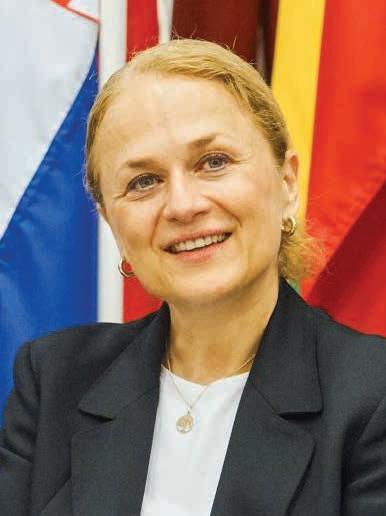
OUR BILATERAL TIES ARE FURTHER STRENGTHENED BY OUR DEEP PARTNERSHIP AS MEMBERS OF THE EU AND NOW, ALSO AS ALLIES IN NATO
H. E. ANNA BODA Ambassador of the Kingdom of Sweden to Croatia
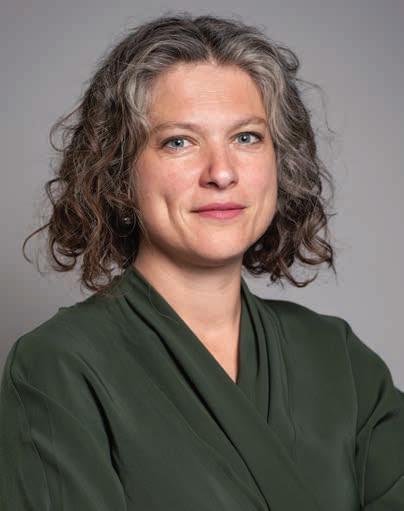




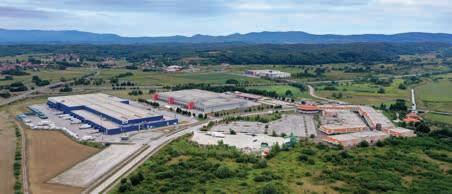

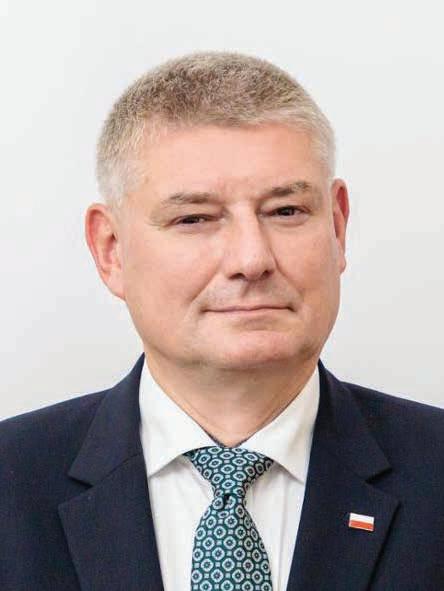




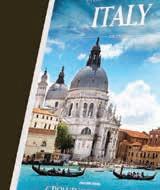
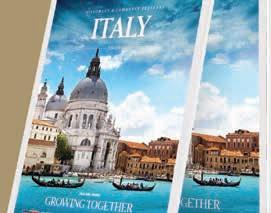

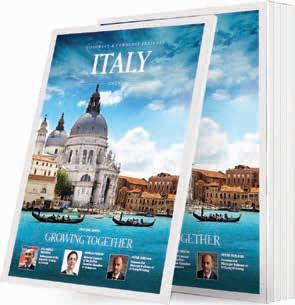
April/May 2024 » ISSUE No. 51. » FREE COPY
HEAD EUROPEAN COMMISSION
IN CROATIA
the European
WE SHARE SIMILAR VIEWS AND IDEAS
www.diplomacyandcommerce.hr
REPRESENTATION
ZRINKA UJEVIĆ Head of the Representation of
Commission to Croatia
H.E. PAWEŁ CZERWINSKI Ambassador of the Republic of Poland to Croatia
KEEPING OUR PROMISE TO EUROPE: The story of the von der Leyen Commission
AT SVETA HELENA BUSINESS ZONE ITALY GROWING TOGETHER
BUSINESS AND INVESTMENT OPPORTUNITIES

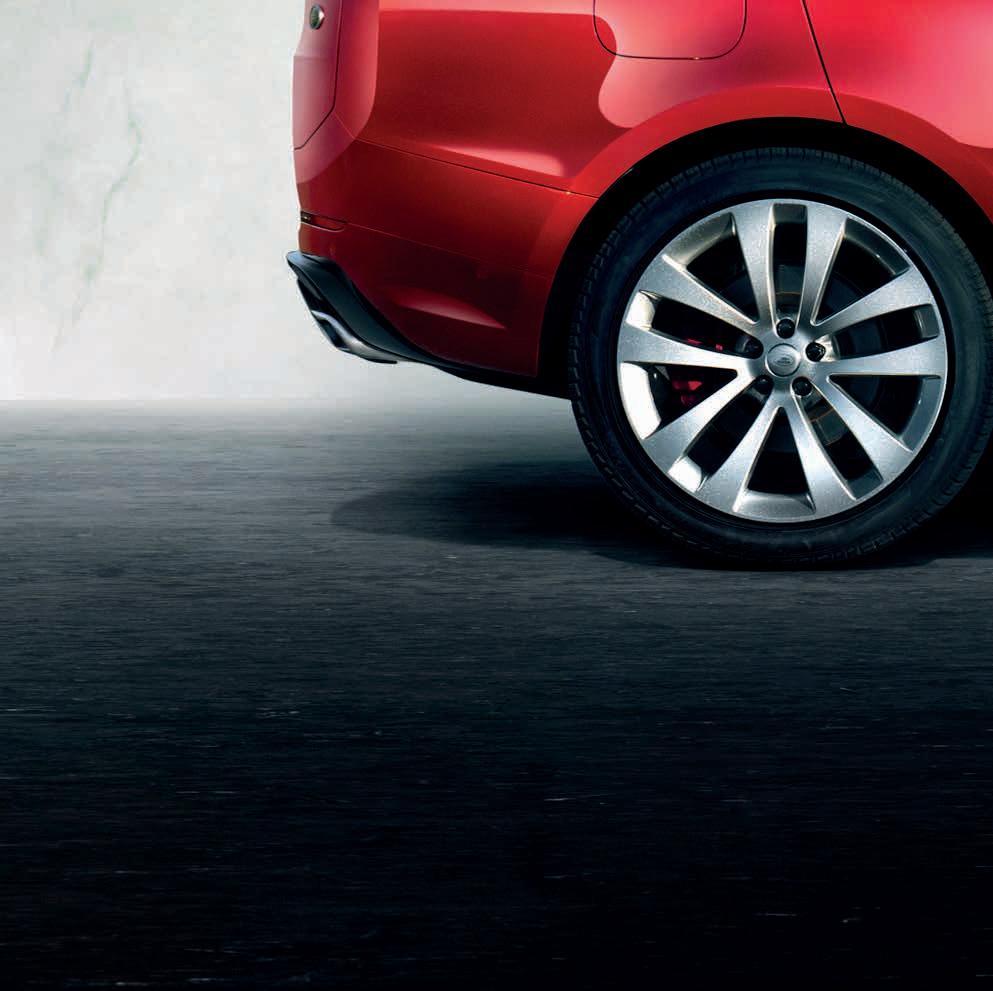


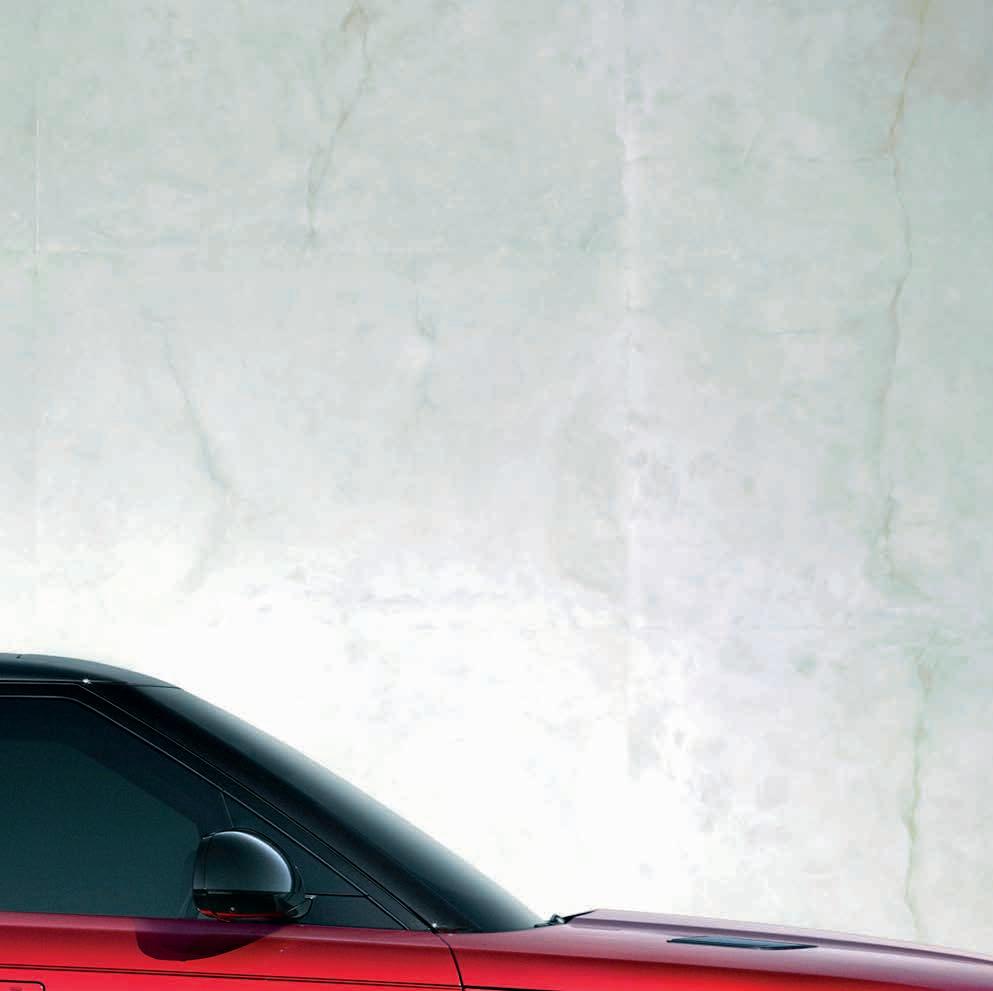
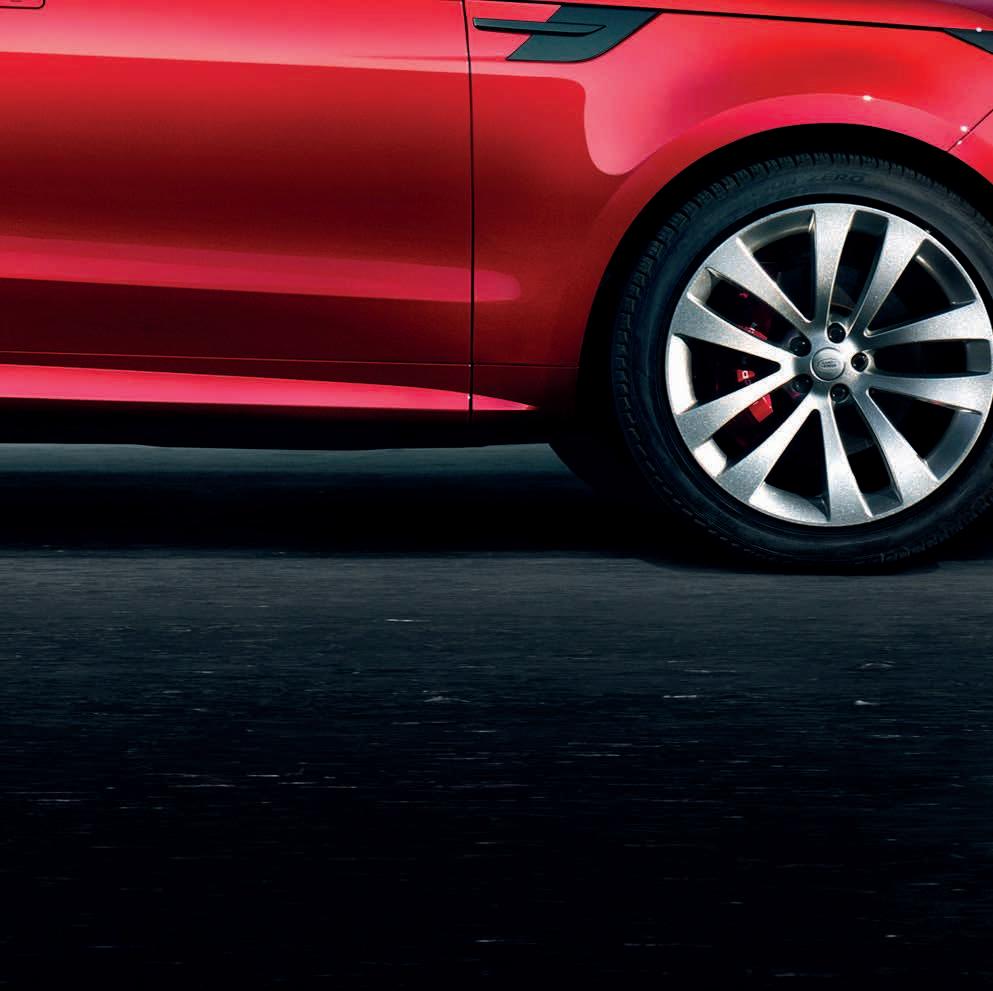


BOBAN SPASOJEVIĆ, Magazine Director Croatia and Editor in Chief boban@diplomacy andcommerce.hr
ROBERT ČOBAN Director
VLADIMIR DUDAŠ C e n t r o b i r o Art Director
GORANKA MILOŠEVIĆ Translation
Predstavnik za RH

Aspekt obrt za savjetovanje i usluge
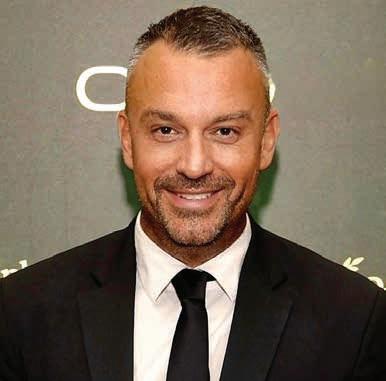
FOREWORD
BOBAN SPASOJEVIĆ Director and Editor-in-Chief
CONTENTS
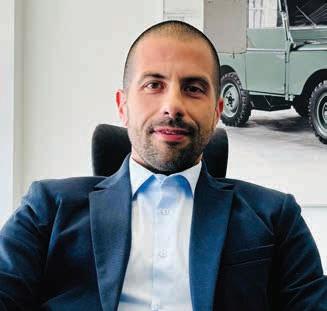
16
EXCELLENT YEARS FOR JLR ADRIA
MILOŠ STEFANOVIĆ
Regional Director – Jaguar Land Rover Adria

18
CBS CROATIA AS ONE OF MARKET LEADERS FOR MORE THAN HALF A DECADE
PREDRAG TUTIC
Director of Cushman & Wakefield CBS International Croatia
Dear readers,
The Diplomacy&Commerce team is pleased to present to you the new edition of the magazine, one that we have worked hard on. This is the seventh year of the magazine in Croatia, and in addition to the quality you are used to and rich content, the magazine will publish 4 issues in 2024. Our plan is to prepare two issues before the summer break and two after the summer. This makes our content even richer and more concise.
There are challenges ahead of us, both in Croatia, and throughout Europe and the world. In the super election year where elections will be held in more than 70 countries with around 4.2 billion inhabitants. Wars and heightened tensions between global powers, along with everything else, will be the subject of our articles. What we insist on from the beginning is the economy and business equally from all angles and through all forms of business. We believe that it is an integral part of life just like politics, and we remain the only ones that combine the topics of entrepreneurship and business with diplomacy and politics, all in one place.
Enjoy the content that we have prepared for you


20
CROATIA’S EU MEMBERSHIP HAS EXPANDED THE SCOPE OF LOBBYING ACTIVITIES
MILLY ANTONIA DOOLAN
Co-owner and Managing Director at EuroNavigator
24
FOCUS ON :
KEEPING OUR PROMISE TO EUROPE: THE STORY OF THE VON DER LEYEN COMMISSION
48
RELATIONS BETWEEN THE TWO COUNTRIES ARE EXCELLENT
H.E. PAOLO TRICHILO
Ambassador of the Republic of Italy to Croatia
52
10 YEARS OF ITALIANCROATIAN CHAMBER OF COMMERCE IN CROATIA
ANDREA PERKOV
Director General of the Italian-Croatian Chamber of Commerce
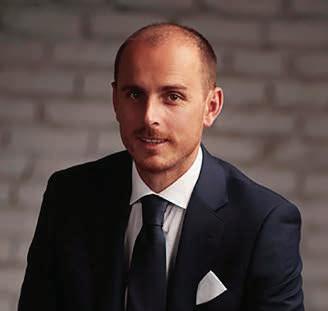
54
WE DESIGN PRODUCTS AND EXPERIENCES
PETER FERLUGA
Commercial Manager Balkans at De’Longhi Group
59
ZEPTER HYPERLIGHT EYEWEAR
WORLD FAMOUS INNOVATIVE TECHNOLOGY
60-61 TRAVEL
EXPLORE THE DALMATIAN COAST WITH VALAMAR THIS SUMMER
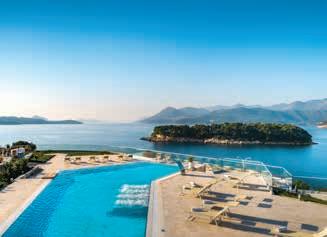
4 www.diplomacyandcommerce.hr




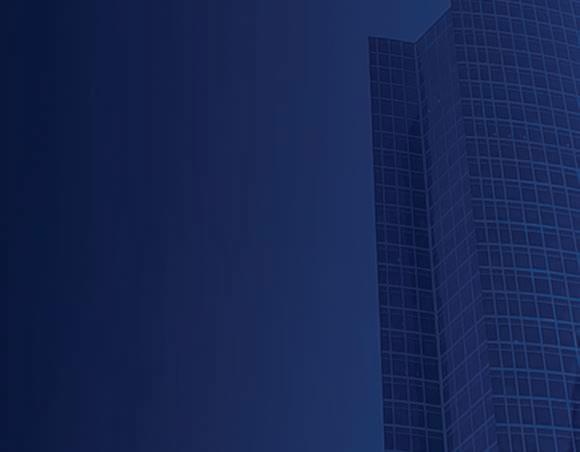
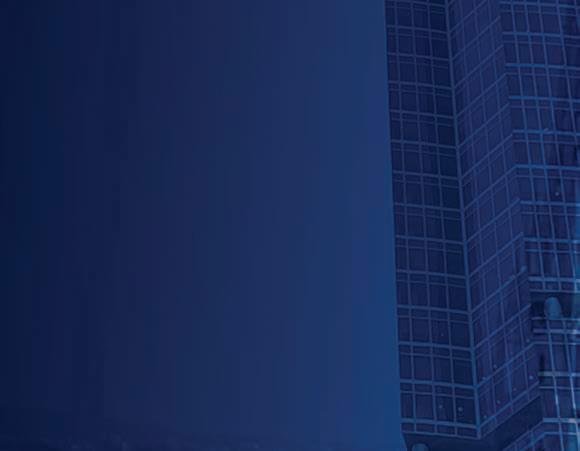
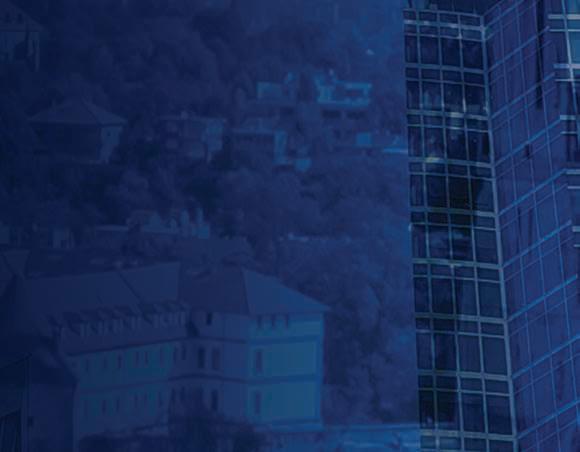
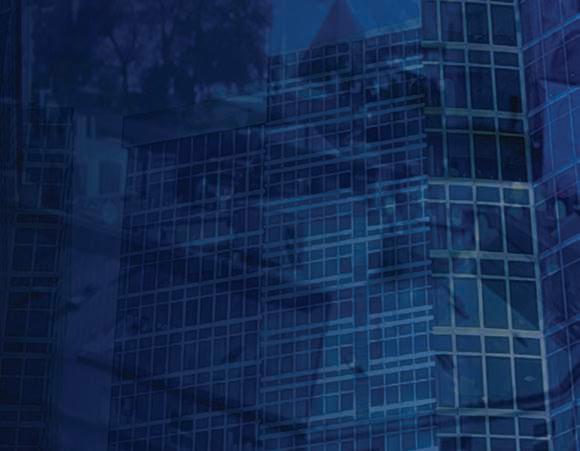


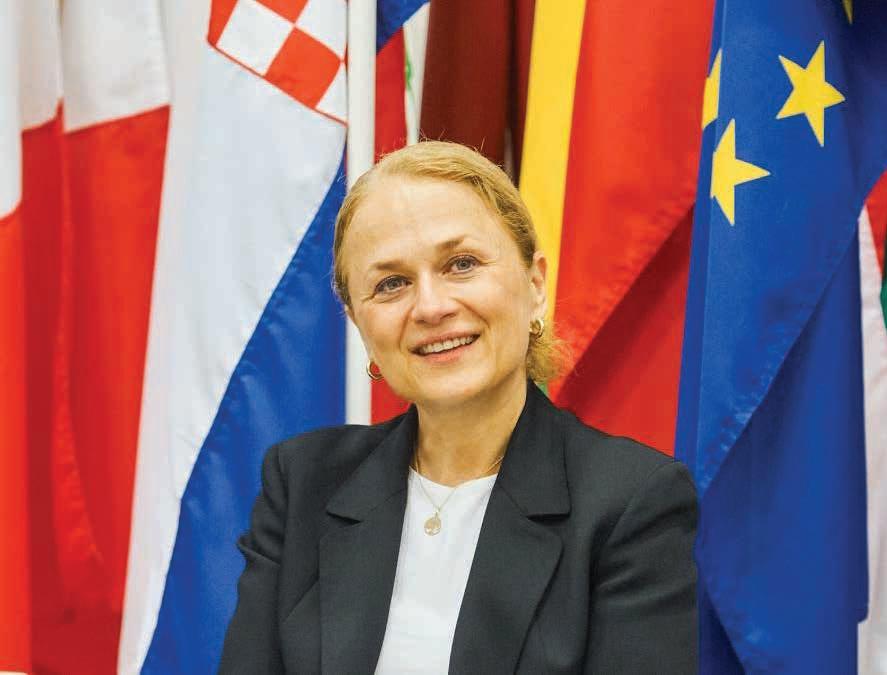
Head European Commission Representation in Croatia
Being a member of the EU is not only an economic benefit, but it means belonging to a community with which a country shares the same European values, within which a country seeks solutions for all of today’s challenges
ZRINKA UJEVIĆ
Head European Commission Representation in Croatia
I believe there is great potential for Croatia in the full use of all opportunities offered by the internal market, as well as that it can strengthen its potential and competitiveness precisely within these frameworks, Zrinka
Ujević, Head of the European Commission Representation in Croatia told the Diplomacy&Commerce magazine. In the run-up to the European elections, she would like to see a higher citizen turnout. We also discussed in detail the RePowerEU Plan, the Commission’s response to the energy crisis stemming from Russia’s aggression against Ukraine in February 2022.
As an experienced diplomat who has dealt with European affairs for most of her career, how would you evaluate the achievements and benefits of Croatia’s membership in the EU so far? What would you single out as the most important benefits and achievements?
The benefits of membership for Croatia are multiple and cannot be
measured in funds only, although the financial inflow of European funds to Croatia is significant. Croatia makes particularly good use of the funds available under the Recovery and Resilience Mechanism. The country is at the very top when compared to other EU Member States. Many projects financed via this Mechanism and many other EU funds programs have already
6 www.diplomacyandcommerce.hr INTERVIEW
been implemented and are visible to Croatian citizens. They are also a tangible indicator of the benefits of Croatia’s membership in the EU. The Pelješac Bridge is certainly one extremely visible example of the use of EU funds. There are numerous such infrestructural examples, but also other types of funds. And there will be even more over time. In the past years, Croatia has certainly handled numerous crises within the EU more easily than if it had had to go through them alone. There are numerous benefits for citizens, from various opportunities for young people and students, to the access of Croatian companies to the EU internal market now celebrating more than 30 years since it was first created. The single market certainly represents one of the most important benefits of our common European project.
Where do you see room for improvement, both for citizens and the economy in terms o fan even deeper integration, bearing in mind that some major changes require more time?
Croatia’s entry into Schengen and the eurozone is very important. Croatia has thus entered the very core of the Union and is part of the deepest European integration. Croatian citizens are already feeling the numerous benefits of the free-
dom of movement. They can cross borders freely without passports, with the reintroduced controls only temporary and the result of migratory movements. Citizens and companies increasingly use the opportunities offered by the internal market, the common currency facilitates business operations for companies and, again, free movement and travel of Croatian citizens in all EU countries. As a member of the EU, Croatia decides on all issues in the Council, defines strategic guidelines and creates the future of the Union together with other Member States. It participates in the creation of common European policies. Our priorities are the green and digital transition, which we are working on intensively and across all policy areas. All of this despite the crises we found ourselves in due to the pandemic and followed by the Russian aggression against Ukraine and the consequent energy crisis across the continent. Our climate goals are long-term ones and their implementation requires
vision, determination, but also adaptation in various sectors. And we have also reserved significant funds to make the transition not only green and digital, but also a just one and an inclusive one for all Europeans.
Elections for the European Parliament are held in June. How is Croatia preparing for these elections?
The answer to that question lies in Croatia itself. What the European Commission would like to see is a higher turnout of Croatian citizens in the European Elections this June. A reminder – in Croatia they take place on Sunday, 9 June. The turnout of Croatian citizens in the European elections has indeed increased: from 20% in the first ad hoc elections in 2013, a bit over 25% in 2014, to almost 30% in the last European elections in 2019. However, this figure is still relatively low, and Croatia still sits at the bottom of the turnout scale when compared to some other Member States.
THE CHALLENGES FACING THE EU CONTINUE TO POSE NUMEROUS CONSEQUENCES OF RUSSIAN AGGRESSION ON UKRAINE, IN VARIOUS AREAS - DEFENSE, FINANCIAL, LEGAL
I do hope this will change and the turnout will rise on 9 June this year. We are now in the period of political campaigning of parties competing for entry into the European Parliament. We will certainly monitor their views on European policies, but the European Commission has no role in the electoral process and it acts with complete political neutrality.
In response to the disruptions in the energy market caused by the Russian invasion of Ukraine, the Commission launched the REPowerEU plan. The mechanism for recovery and resilience is at the heart of its implementation and financing. What does the recovery plan bring to Croatia?
The RePowerEU plan was agreed in response to the energy crisis that followed Russia’s aggression against Ukraine in February 2022. It encourages the diversification of supply and moves away from the use of Russian fossil fuels, and it also focuses on energy savings. The introduction of energy from renewable sources is encouraged, with the problems of energy poverty and bottlenecks in the distribution of electricity addressed. RePowerEU also promotes traffic with zero CO2 emissions, but also retraining and reskilling workforce to acquire

7 INTERVIEW
green skills. An important highlight is also on the improvement of the security of energy supply in Europe.
In the Croatian case, RePowerEU has enriched the Croatian Recovery and Resilience Plan (RRP) with an additional amount of 2.9 billion euros. The Croatian RRP now amounts to a total of 10 billion euros, as much as 14% of Croatian GDP. The plan also contains a number of measures that contribute to the achievement of the goals of the REPowerEU plan in the Europewide sense: a Europe independent of Russian fossil fuels, and this well before 2030. The measures within the plan promote energy efficiency, reduce dependence on fossil fuels by increasing the production and use of energy from renewable sources such as sustainable biomethane, hydrogen from renewable sources and geothermal energy.
The fight against climate change is one of the main priorities of the European Commission, and the European Green Deal is its ambitious plan to transform Europe into the first climate-neutral continent. How did Croatia perform within that plan?
We see the European Green Deal as a contribution to strengthening the competitiveness of the European Union in a global context. This applies particularly to the industry with net zero emissions, which will contribute to a faster and more efficient transition towards climate neutrality. The Net Zero Industry Act aims to increase the production capacity of those technologies that support the transition towards clean energy and the reduction of greenhouse gas emissions. It is important to attract investments in this sector and to create better conditions and easier access to the market for clean technologies. All this is a stake so that we could achieve out climate goals by 2030. And then, ultimately, the climate neutrality of Europe as a continent by 2050. These measures are also aimed at strengthening the competitiveness of the EU’s industry, at creating quality jobs and achieving energy independence of the European Union.
Croatia is going through changes in a manner similar to those in other EU Member States, turning to renewable energy sources and gradually adapting, taking advantage of the opportunities offered by the Recovery and Resilience Mechanism to adapt its different sectors to these goals. At the same time, Croatia contributes to the efforts of the European Union as a
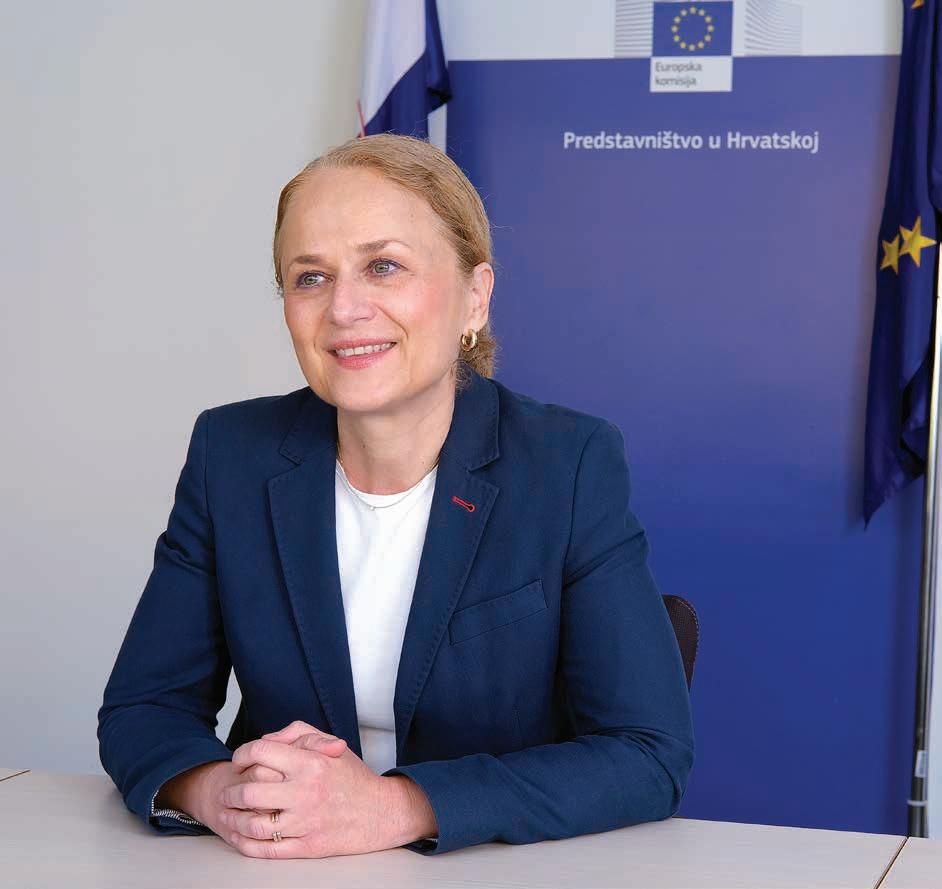
IN THE CROATIAN CASE, REPOWEREU ENRICHED THE CROATIAN RECOVERY AND RESILIENCE PLAN WITH AN ADDITIONAL AMOUNT OF 2.9 BILLION EUROS, WHICH NOW AMOUNTS TO A TOTAL OF 10 BILLION EUROS, AS MUCH AS 14% OF CROATIAN GDP.
whole to achieve climate neutrality and also European energy security. Croatia therefore welcomed this Act, emphasizing its importance for solving the vulnerability of the European Union in the energy sector.
What would you single out as the biggest challenges and risks for Europe and the EU in the period ahead and how to solve them?
Short-term challenges are related to the European Parliament elections, especially when it comes to safekeeping them from foreign interference in democratic processes, cyber-attacks and the spread of disinformation and fake news. And all this so that after the European Elections, an efficient process of forming new institutions would follow.
At the same time, the EU’s Digital Services Act, the first such law in the world, is an important guardian of fundamental rights. With it, we have regulated the behavior of online platforms for sharing content so that we could prevent illegal activities on the internet and the spread of disinformation targeted towards European citizens. One challenge, for example, could potentially be the increase in the number of Eurosceptic representatives in the new seat of the European Parliament. In the long term, and much wider than the European Elections themselves, the challenges facing the EU continue to be numerous consequences of Russian aggression on Ukraine, in various areas – those related to European defense, but also economic
and legal ones. It is exemplary that the EU has managed to maintain unity around Ukraine. Challenges could also come from crises in our neighbourhood to the south, for example in the Middle East. Along with these external, global challenges, there are also internal, institutional challenges. There is the question of internal reforms and institutional adjustments to new realities, including in the context of EU enlargement. There is general awareness that an appropriate internal reform is needed in parallel and this, the Commission acknowledges, must be done in parallel – the broadening and the widening of the EU. As far as more general risks are concerned, I see a divided Europe as one of the greatest dangers, which could then affect the EU’s reputation in global relations, but also its reputation among citizens. It is precisely because of this that I believe beyond a doubt that the European Union is the strongest when it acts unitedly. As Europeans, we should constantly strive for that. Then we can deal with challenges in solidarity, and with a better outcome, as we have all learned in the incumbent Commission mandate.
8 www.diplomacyandcommerce.hr ZAGLAVLJE INTERVIEW






REVOLUCIJA U MEDICINI
Bazirana na Fulerenu C60

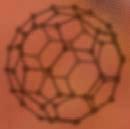


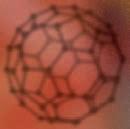
ZA BOLJI VID
OSJEĆAJTE SE BOLJE
RAZMIŠLJAJTE BRŽE
POSJEDUJTE NAJBOLJE PERFORMANSE
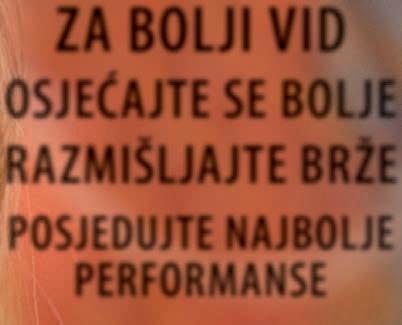

ŽIVITE BOLJE

Za koga, kada i gdje nositi? Za bilo koga, bilo kada i bilo gdje!




Hyperlight Eyewear® naočale pružaju aktivnu hipersvjetlosnu terapiju na kvantnoj razini radi zaštite, održavanja, revitalizacije i regulacije biostruktura i fizioloških procesa u očima, u mozgu i u cijelom tijelu.




Patentirani, Hi-Tech švicarske proizvodnje BIOPTRON Hyperlight Optics® by
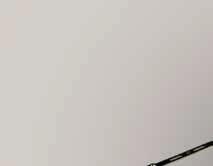
Sva svjetla koja prolaze kroz hipersvjetlosnu optiku (leću) pretvaraju se u jedinstveno strukturirani hiper-harmonizirani svjetlosni kompleks, nazvan Quantum Hyperlight.

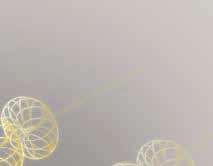






ZA BOLJI VID • OSJEĆAJTE SE BOLJE • RAZMIŠLJAJTE BRŽE • POSJEDUJTE NAJBOLJE PERFORMANSE • ŽIVITE BOLJE
Hyperlight Eyewear® štite od štetnog unutarnjeg zračenja kojem smo izloženi 24 sata dnevno od umjetnih izvora svjetlosti (LED žarulje, neonska svjetla, elektronički uređaji itd.), kao i štetno zračenje prirodnog sunčevog svjetla.







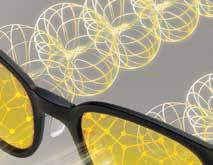
Hipersvjetlosni fuleren C60, kvantni mehanički svjetlosni transformator






Simetrija i neviđena dinamika fulerena C60 odgovara onima zdravih biostruktura.





C60 ima kvantna svojstva bez presedana, uključujući jedinstvenu brzinu rotacije i uvijanja od 18 milijardi puta u sekundi); kroz Rezonantne principe biomimikcije, učinkovito komunicira s dolaznim svjetlom, što u konačnici vraća biostrukture u prirodno, zdravo stanje na kvantnoj razini. Kroz ovaj fiziološki proces, Hyperlight Eyewear® štite, održavaju, revitaliziraju, reguliraju i vraćaju tijelo na optimalno zdravlje.
3 ZA BOLJI VID • OSJEĆAJTE SE BOLJE • RAZMIŠLJAJTE BRŽE • POSJEDUJTE NAJBOLJE PERFORMANSE • ŽIVITE BOLJE



9
We share similar views and ideas
In 2023, Poland placed sixth on the list of the largest exporters to the Croatian market.
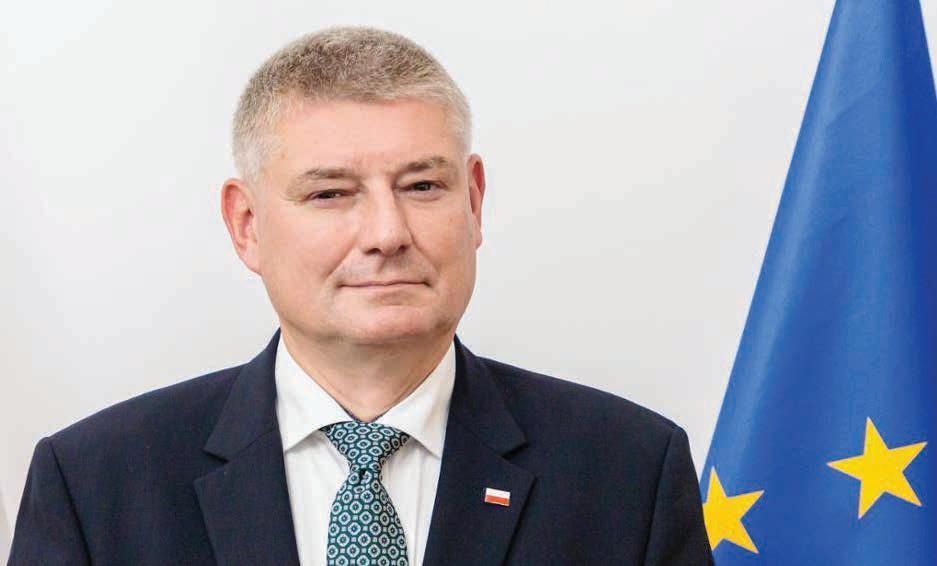 H.E. PAWEŁ CZERWINSKI
H.E. PAWEŁ CZERWINSKI
Within the framework of the EU and NATO, the officials of Poland and Croatia lead state policies in the interests of citizens and jointly proclaimed values on which our modern states rest, says H.E. Paweł Czerwinski, Ambassador of the Republic of Poland to Croatia. The war in Ukraine, now also in the Middle East, constant crises in the world force us to cooperate more closely. Among other topics, for Diplomacy&Commerce magazine, we talked with the ambassador about the importance of the Three Seas initiative, but also about other important things that make a quality and satisfying work and life - economy, culture, tourism.
How would you rate the relations between the Poland and Croatia? Both are members of the EU, Schengen, NATO. It seems allies in all areas.
Exactly, this is what we are. Our relations are very good, friendly, free from any unanswered questions and
THE ROLES OF POLAND AND CROATIA IN THE THREE SEAS INITIATIVE (3SI) ARE CRUCIAL, BECAUSE OUR TWO COUNTRIES WERE COFOUNDERS OF THIS UNIQUE FORMAT OF REGIONAL COOPERATION.
have two equally important dimensions – bilateral and multilateral. We share similar views and ideas concerning the key issues within both the EU and NATO, which has been proven, for example, by the presence of Croatian soldiers in the Alliance’s Eastern Flank. I would also add the Three Seas Initiative to the list of areas in which Polish-Croatian cooperation is developed on an international level.
The Three Seas Initiative is also an important link between the two countries. How would you rate the results of this initiative and the role of Poland and Croatia?
The roles of Poland and Croatia in the Three Seas Initiative (3SI) are crucial, because our two countries were
co-founders of this unique format of regional cooperation.
In the beginning, in 2016, there was a lot of skepticism towards the 3SI in Europe, and this was the result of a misunderstanding of the very idea and goals of this project. Today, nobody denies the need for improvement of connectivity – in terms of transport, infrastructure, IT – on the North-South axis, as it is still underdeveloped in comparison with numerous bonds linking Western and Eastern parts of the European Union. And exactly this has always been and still is a strategic goal of the 3SI which was invented as a regional cooperation group within the framework of the EU.
Of course, the achievements of the Three Seas Initiative could be greater, but one has to acknowledge
the challenges it has faced during the 9 years of its existence. First we had the Covid-19 pandemic and then then war in Ukraine, and they both seriously affected the economies of all EU member states, and particularly of the Central and Eastern European ones. And with this in mind, we can proudly admit that the 3SI proved itself really resilient and flexible.
The 3SI Summit held on April 11th in Vilnius, along with the accompanying Business Forum, allowed our cooperation to have an even stronger impact. I believe that Poland and Croatia will be able to contribute to the fulfillment of various ambitious projects proposed by our leaders.
The embassy also invests a lot in connecting the two nations through culture and education. What would you particularly emphasize from the activities in these fields?
Culture is an important element through which one can get to know the character and traits of a particular people. It is the soul in the body of every society. We at the Embassy aim to present various aspects of Polish cultural identity by organizing concerts, exhibitions, plays, film screenings, scientific conferences, and other events that we believe could be interesting and educational for the residents of Croatia. We particularly bring up Polish and Croatian ties which sometimes date back several centuries. For example, on the occasion of the 30th anniversary of the establishment of diplomatic relations between Poland and Croatia, we created a mural in the center of Zagreb dedicated to its former mayor, Adolf Mošinsky, who has Polish roots. Mošinsky changed the character of Zagreb at the turn of the 20th century. During his term in office, some of the most attractive sights of the city were built, such as the Croatian National Theater, the Mimara Museum, the Art Pavilion, and the Lenuci Green Horseshoe. Many roads in the so-called Lower Town were completed, as well as the road to Sljeme. Furthermore, the
Ambassador of the Republic of Poland to Croatia
10 www.diplomacyandcommerce.hr INTERVIEW
water supply and the sewer systems were constructed under Mošinsky. We also actively support the teaching of the Polish language at Croatian universities. We are proud that our mother tongue has many enthusiasts in Croatia, among whom there are excellent linguists and translators of Polish literature.
How do you evaluate the economic relations between the two countries? What do the numbers show (imports, exports, investments...)?
The value of trade turnover between Poland and Croatia is constantly growing. The trade balance is definitely favourable for Poland, but this is to some extent compensated by the expenditure of the numerous Polish tourists who visit Croatia (over a million every year). In 2023, Poland placed sixth on the list of the largest exporters to the Croatian market. That year, the value of Polish exports to Croatia amounted to €1.564 billion, and the value of imports from Croatia to Poland - to €562.9 million. I want to emphasize with great satisfaction that in 2023 our countries’ trade turnover exceeded the threshold of €2 billion for the first time in history, reaching a record high €2.126 billion.
Polish companies such as LPP (the owner of the Reserved and Mohito brands), CCC, Emmezeta, and DrvoExport successfully operate on the Croatian market. The Enterprise Investors investment fund, which owns the Studenac supermarket chain and is well known to Croatian consumers, is constantly developing its operations. Polish capital is also behind the success of the PANPEK bakery chain. Another example worth mentioning is the Polish company Press-Glass, which has its glass factory in Varaždin.
The adoption of the Euro, good economic results, and the absorp-
tive capacity of the domestic market have had a positive impact on the investment climate in Croatia, which has also caught the eye of Polish entrepreneurs. Many of them contact the Embassy of the Republic of Poland in Zagreb, wanting to expand their activities to the Croatian market. From our correspondence with representatives of the Polish business community in Croatia, we also know that they greatly value their cooperation with the Croatian Chamber of Commerce.
Where do you see Europe and the EU in 10 years and what are the biggest challenges facing Eu-
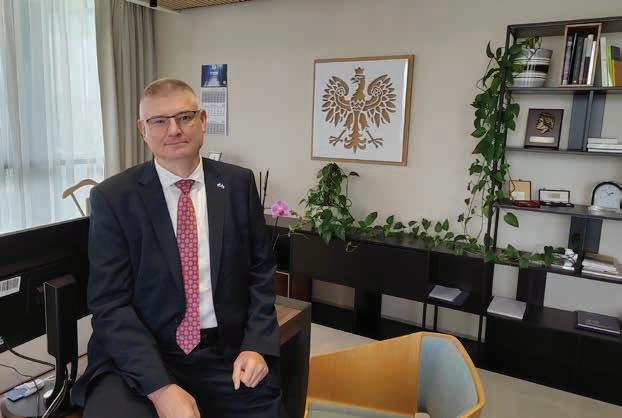
POLISH COMPANIES SUCH AS LPP CCC, EMMEZETA, AND DRVOEXPORT, STUDENAC SUPERMARKET, PAN-PEK. ANOTHER EXAMPLE WORTH MENTIONING IS THE POLISH COMPANY PRESS-GLASS.
rope that can threaten our values, way of life...? What are the biggest challenges?
It is very difficult to be optimistic in the current situation and I doubt anybody can predict what not only the EU but the whole world will look like in 10 years. A major challenge is Russia’s imperialistic policy due to which it did not develop good, partner relations with the Western world – and in fact, perceived all friendly gestures from the EU as a weakness. Apart from its aggression towards Ukraine, Russia poses a clear and present danger to European values, democratic institutions and, last but not least, our way of life. The Moscow regime not only despises international law and any civilised rules of conduct, but is also actively undermining Europe’s stability via various destructive actions, which in many respects is hybrid warfare.
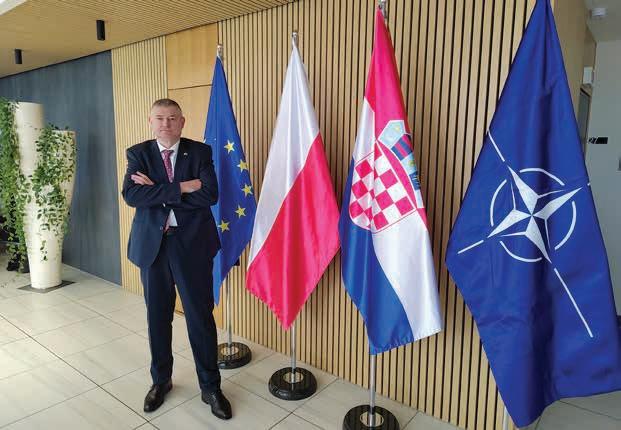
The usage of illegal migrants as a weapon, spreading large-scale disinformation, and supporting left- and right-wing extremists are only a few examples. Unfortunately, for a very long period of time, the warnings expressed by the Central and Eastern European Member States have been flatly dismissed and labeled as Russophobic. Now, we are paying a high price for such an attitude of leading European powers.
But of course, we should not blame Russia for everything, as our European leaders have made many mistakes themselves. Many times there was too little understanding for the needs and feelings of common EU citizens.
The resulting frustration has unfortunately caused a dramatic decrease of trust and respect not only towards specific institutions within the EU, but also towards its democratic procedures. This is the reason for growing support that many Eurosceptic and populist politicians enjoy right before the elections to the European Parliament. In order to survive, the European Union must return to its roots, and again be just and friendly towards its own people, regardless of their nationality, wealth status, or historical background.
Let us hope that the upcoming European elections will open a new chapter and the EU will be able to resist all these threats, as well as finally play a role it deserves on a global level, achieving – in terms of political and economic might – a position of the power equal to the USA, China, Russia, or India.
How does official Warsaw view EU enlargement? In addition to the countries of the Western Balkans, there is also Ukraine and Moldova?
Poland has always been an unequivocal advocate of the “open door” policy and thus we support an enlargement process that should be fair, transparent, and merit-based.
All serious European politicians have to understand that admitting the Western Balkans and Eastern Partnership countries is not an act of charity; rather, it has to be in the best interest of the Community itself. A clear and honest perspective of EU membership is an incentive to reform a country’s economy, strengthen its democratic institutions, and protect human and civil rights – so an incentive to take steps that improve the quality of citizens’ lives and contribute to peace and stability. And peace and stability in the immediate neighbourhood is undoubtedly of vital importance for the Union in all areas – economy, culture, security policy, etc.
Our position towards the enlargement strategy is that there is no discussion which dimension is more important – southern or eastern – because the accession process is neither a beauty contest nor a question of some limit in the number of potential new members. We do not agree with the opinion that the admission of Ukraine or Moldova to the club would be done at the expense of the Western Balkan countries. Simply put, all who are willing to enter should have an equal chance to do so, without any bias from the EU.
At the same time, it is understood that the aspiring and candidate states have to do their homework and meet all conditions presented during the accession negotiations. From the point of view of Poland, a country’s alignment with the EU Common Foreign and Security Policy (CFSP) is of particular importance in the present global situation.
11 INTERVIEW
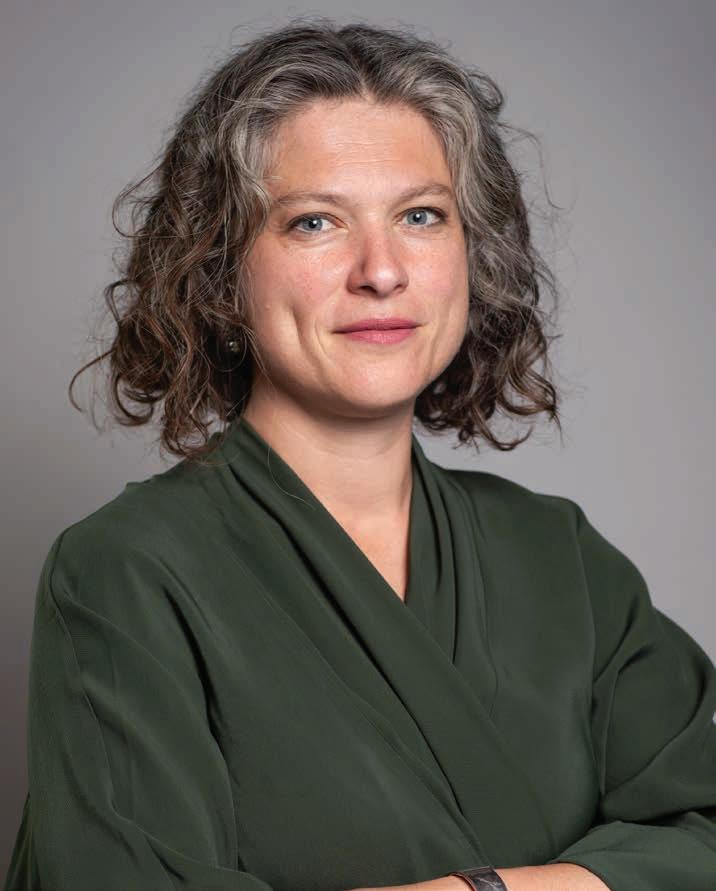 H. E. ANNA BODA
H. E. ANNA BODA
Ambassador of the Kingdom of Sweden to Croatia
Sweden and Croatia have a long history of bilateral relations shaped through official ties, extensive people-to-people contacts and Swedish business presence here in Croatia, for Diplomacy&Commerce magazine says H. E. Anna Boda, Ambassador of the Kingdom of Sweden to Croatia. This means that we are, on a daily basis, working together to solve both small and big issues that affect our citizens, societies and businesses, says H. E. Anna Boda.
Where do you see room for improving cooperation and are there any open issues between the two countries?
We are currently facing a very serious security situation in Europe due to Russia‘s full-scale invasion of Ukraine. We also see a rise in global geopolitical tensions and challenges posed by climate change. All these threats will be
Our bilateral ties are further strengthened by our deep partnership as members of the EU and now, also as allies
in NATO
There are approximately 50 Swedish companies in Croatia with 10,000 people in a wide array of industries.
with us for a foreseeable future. They carry serious implications for the security and prosperity of our societies.
In times like these, we need our partners and allies even more. I believe that together, Sweden and Croatia, can contribute to strength-
Looking ahead we need to strengthen the EU’s economic base. Promoting and facilitating trade and business is key for the EU to be competitive. For this, a well-functioning single market is necessary. Here, Sweden sees great potential to work with Croatia, both
AS A PRIORITY, WE MUST CONTINUE OUR STEADFAST SUPPORT FOR UKRAINE. THIS IS A MAJOR TASK FOR OUR GENERATION AND THE FUTURE.
ening the resilience of our countries and of Europe. As a priority, we must continue our steadfast support for Ukraine. This is a major task for our generation and the future. Ukraine is fighting not only for their, but also for our freedom. Sweden appreciates Croatia’s committed support to Ukraine, manifested for example through hosting the International Donors Conference on de-mining last year.
in the EU and bilaterally. Both our economies rely on trade, on being innovative, sustainable, and open for business. A recent example is increased cooperation between Croatia and Sweden in the health care sector, where EU funds are also providing opportunities. The Swedish company Elekta will soon be supplying Croatian hospitals with 12 high-tech linear accelerators to treat cancer patients. These state-
of-the-art machines will contribute to the Croatian national plan to fight cancer and to care for patients. There are a number of Swedish companies, such as Astra Zeneca, Essity, Gettinge, Molnlycke and SOBI that are active on the Croatian market in the health care segment.
How do you evaluate the economic relations between the two countries? What do the numbers show (imports, exports, investments...)? To what extent is this process two-way and how much do Croatian companies invest in Sweden? Economic relations between Sweden and Croatia are very good and have been continuously expanding over the past decades. Currently, there are approximately 50 Swedish companies in Croatia with 10,000 people in a wide array of industries. Our companies are present in ICT and gaming industries, beauty, and cosmetics, retail, energy, transport, tourism, wood industry and infrastructure, just to name some.
12 www.diplomacyandcommerce.hr INTERVIEW

We have seen big investments from Sweden over the years, from the privatization of Ericsson Nikola Tesla in the 1990’s to the more recent acquisitions of Nanobit by Stillfront, or the takeover of Spin Vallis by Vällinge Group / Bjelin. Over the years there have been many more examples, including IKEA, Foreo, Securitas, and Testament Winery that have all contributed to a total net investment of almost € 700 million over the past 30 years.
Croatian investments and operations in Sweden, are more in the domain of the Croatian institutions, but I know that companies like Koncar and Dalekovod have been operating successfully on our market for years, and excellent Croatian products such as wine and food are exported to Sweden. Furthermore, more than 200,000 Swedish tourists visited Croatia last year and we see that the numbers are again approaching 300,000 tourists like before pandemic. As of May, direct flights will again operate between Stockholm and Zagreb, which will facilitate even closer exchanges between our capitals. This is in addition to regular seasonal flights to different Croatian cities.
Where do you see Europe and the EU in 10 years and what are the biggest challenges facing Europe that can threaten our values, way of life...? What are the biggest challenges?
The complex interconnected and global challenges, such as climate change, migration and Russia’s war against Ukraine have had a profound impact within and beyond the borders of the EU. These developments serve to underscore the quintessential need for even stronger co-operation at EU level. A strong and united EU gives Europe power and gives countries like Sweden and Croatia a voice on global issues.
Looking ahead, the EU and its member states, will also need to consolidate our role as a security and defence policy actor and take greater responsibility for our own security. This includes strengthening civil defence, resilience, and preparedness as well as Europe’s defence industrial capabilities.
The threats we face are increasingly complex. Sweden has, like many other countries, faced numerous malign information influence campaigns aiming to harm us. My government has been working for some time to prevent and avert the spread of disinformation, including through the re-established Agency for Psychological Defence. The agency contributes
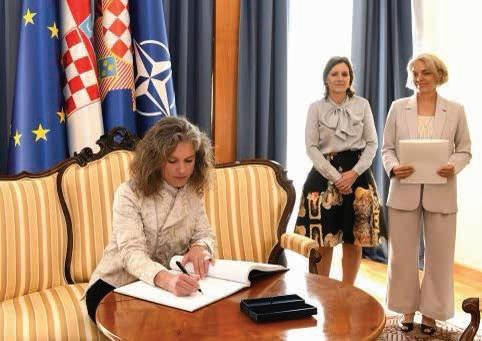
MORE THAN 200,000 SWEDISH
TOURISTS
VISITED CROATIA LAST YEAR AND WE SEE THAT THE NUMBERS ARE AGAIN APPROACHING 300,000 TOURISTS LIKE BEFORE PANDEMIC.
to strengthen resilience within our population and in our authorities by analysing information and by openly communicating about potential threats.
As EU, we must also prepare for enlargement, it is a geostrategic investment in peace, security, stability, and prosperity. Apart from addressing necessary internal reforms, we need to focus on boosting EU’s competitiveness, an effective implementation of the migration package and continued fight against crossborder organised crime.
We also need to safeguard what we have achieved with regard to core values such as democracy, rule of law, and take the lead towards a carbon neutral world and foster sustainable development that includes all EU citizens. Here, implementing the climate package – Fit for 55 – is needed to enhance the green transition. In parallel we need to set targets for 2040 that sets us on a credible path towards climate neutrality, in line with the best available science and with Paris Agreement.
The EU is an amazing and unique example of cooperation between states. In a couple of months 370 million European citizens will simultaneously participate in elections to the European parliament. A day doesn’t pass without us all living in this union receiving the benefits that our cooperation provides, and not a day passes without me, as a diplomat, working to further our common European project. I truly believe that we will, in ten years’ time, see a stronger, safer, greener, bigger, and more competitive EU.
accession now complete, all Baltic Sea countries – except Russia – are members of both EU and NATO. And all Nordic and Baltic countries are members of NATO.
Sweden will contribute with our unique capabilities and modern defense on land, in the air and at sea. We are also strengthening our defence and our defence budget to meet the NATO standard of 2% of GDP.
Looking ahead, Sweden will continue to build security together with others as a loyal member of NATO and the EU, including Croatia, aiming to enhance security and stability in our neighbourhood and throughout the Euro-Atlantic area.
How would you rate the cultural cooperation between the two countries? You invest a lot in connecting when we talk about culture, education...?
How does official Stockholm view EU enlargement? In addition to the countries of the Western Balkans, there is also Ukraine and Moldova?
EU enlargement is a geostrategic investment in peace, democracy, security, stability, and prosperity. Russia’s full-scale invasion of Ukraine has renewed the momentum for EU enlargement. Sweden welcomes the recent decisions to open accession negotiations with Ukraine, Moldova and with Bosnia and Hercegovina. It is in our interest to help the candidate countries to move closer to the Union. Membership negotiations are based on the candidate countries’ merits and on the implementation of necessary reforms, not least with regard to the rule of law and democracy. Sweden also supports all the candidate countries with long-term development cooperation to help them prepare for membership.
What does your recent NATO membership mean for Sweden and NATO?
Sweden is now a member of NATO, the defence community of Western democracies. After more than 200 years of military non-alignment, this is a historic step for us. It is also a very natural step. We have been cooperating as close partners with NATO since the 1990s. With Sweden in NATO, we will be safer, and NATO will be stronger. Developments in our neighbourhood will be more predictable and our neighbours will be more secure. With Sweden’s
Cultural and people-to-people ties are very important in connecting countries and societies. We have fantastic local partners in Croatia, ranging from institutions, civil society and the academic community to the business sector.
This year the University of Humanities and Social Sciences in Zagreb marks 40 years since the arrival of the first Swedish lector that Sweden is funding, and I am very happy that studying the Swedish language is popular among students. Language provides a crucial entry point to any society.
Our embassy supports numerous projects annually, such as First Generation, Festival of Fathers, Midsommar, Media Literacy Week, Saint Lucia, Croatian - Swedish Innovation Initiative, Greencajt. We have brought exhibitions on Astrid Lindgren, Nordic Glass, Women in the Viking Age, Nordic design, Bergman and we supported visits of authors such as Jonas Hassen Khemiri, Carl-Johan Vallgren, David Lagercrantz, Jens Lapidus.
Last week I had the pleasure to see one of the four Swedish films that were screened at ZagrebDOX and it was such a joy to share the immersive experience with a fully booked cinema.
This spring, Malmö is hosting the biggest music event of the year, Eurovision. Sweden’s first Eurovision victory was in 1974 when ABBA won with “Waterloo”. Thanks to that Sweden gained worldwide success and paved the way to become the third largest music exporter in the world.
On that note, I would like to welcome Croatia’s Baby Lasagna to Eurovision and wish him a great success performing for more than 200 million European viewers.
14 www.diplomacyandcommerce.hr INTERVIEW
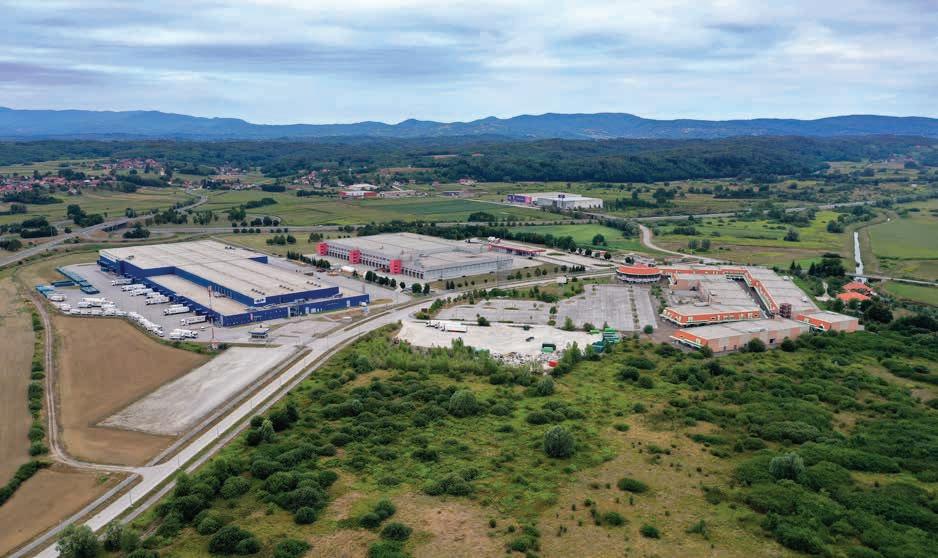
Investing in the Future: Unveiling the
Business and Investment Opportunities at Sveta Helena Business Zone
Nestled in the verdant landscapes of Zagreb County, the Sveta Helena Business Zone in Sveti Ivan Zelina emerges as a beacon of economic opportunity. Offering strategic advantages through its proximity to major transport routes and comprehensive investor benefits, this zone is enhancing the local economy and setting the stage for international business expansion.
Nestled within Zagreb County in Croatia’s scenic landscapes lies the charming town of Sveti Ivan Zelina. This town is renowned for its rich history and vibrant cultural heritage, making it a popular tourist destination. In addition, it has also emerged as a thriving hub for business and investment, thanks in part to the Sveta Helena Business Zone. This zone is a testament to the town’s strategic initiatives to attract global investors.
Sveti Ivan Zelina, with its charming blend of traditional Croatian culture and serene natural beauty, offers a unique quality of life and enviable proximity to the capital city, Zagreb, just 25 kilometres away. The town is celebrated for its winemaking, mainly the indigenous Kraljevina grape, which fuels its local economy and annual Zelina Wine Festival, drawing visitors from across the region. Beyond viticulture, the town’s commitment to fostering a business-friendly environment is evident in its support for the Sveta Helena Business Zone.
The Sveta Helena Business Zone, sprawling across 122 hectares and bifurcated into northern and southern parts, is strategically positioned along the Zagreb-Goričan highway, integrating Sveti Ivan Zelina seamlessly with not only Zagreb but also other major cities and neighbouring countries Hungary and Slovenia.
The northern sector of the zone is fully equipped with essential utilities, including electricity, water, sewage, and telecommunications,
creating a plug-and-play environment for businesses. Meanwhile, plans are underway to enhance the southern part following propertylegal settlements.
Accessibility is a cornerstone of the zone’s design. It is conveniently located near crucial transportation links—19 kilometres from the Sesvete railway station and 30 kilometres from Franjo Tuđman Airport—providing excellent logistic advantages. The Port of Rijeka,
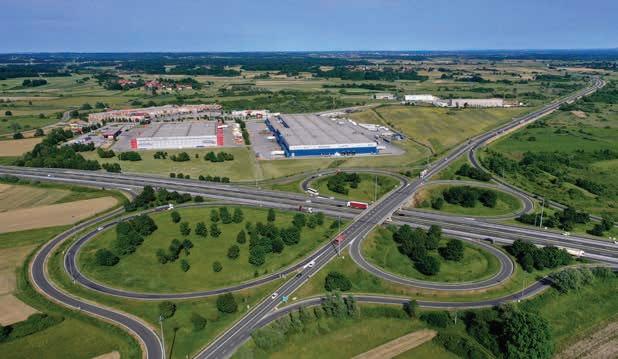
a major seaport, is also within 200 kilometres, facilitating maritime logistics, which is vital for importexport-oriented businesses.
Investors eyeing the Sveta Helena Business Zone benefit from a favourable economic framework designed to lower the cost of business operations. The communal and utility fees are competitively priced, with significant reductions for manufacturing activities, reflecting the town’s commitment to industrial growth. Additionally, special exemptions from communal contributions are available for projects that serve public needs, including healthcare, education, and culture, reflecting a balance between business development and community welfare.
The economic landscape of Zagreb County, home to Sveti Ivan Zelina, is marked by its dynamic growth and strategic location. The county bridges Central Europe and the Adriatic, providing businesses a gateway to diverse markets. The region supports many economic sectors, from agriculture and wine production to technology and manufacturing, facilitated by a skilled workforce and solid infrastructural backbone.
The local government’s supportive stance is evident in offering various incentives, including tax breaks and streamlined processes for new enterprises. This pro-business climate stimulates economic activities that generate employment and foster sustainable development.
Zagreb County is poised to capitalize on green technologies and renewable energy projects as the global economy leans towards sustainability. The business zone itself is designed with sustainability in mind, boasting a high Building Coverage Ratio (BCR) – 0.4 and Floor Area Ratio (FAR) – 1.9, which ensure optimal use of space while respecting environmental standards.
In conclusion, the Sveta Helena Business Zone in Sveti Ivan Zelina represents more than just an investment opportunity; it is a strategic choice for businesses aiming to thrive in a region that balances economic vitality with quality of life. For investors, this zone offers a compelling mix of logistical advantages, financial incentives, and a commitment to sustainable development, making it an ideal location for businesses looking to expand in Europe and beyond. The blend of local charm, strategic location, and investor-friendly policies make Sveti Ivan Zelina not just a gateway to Croatia’s economic future but a cornerstone in the broader economic landscape of Southeast Europe.
15 CORPORATE
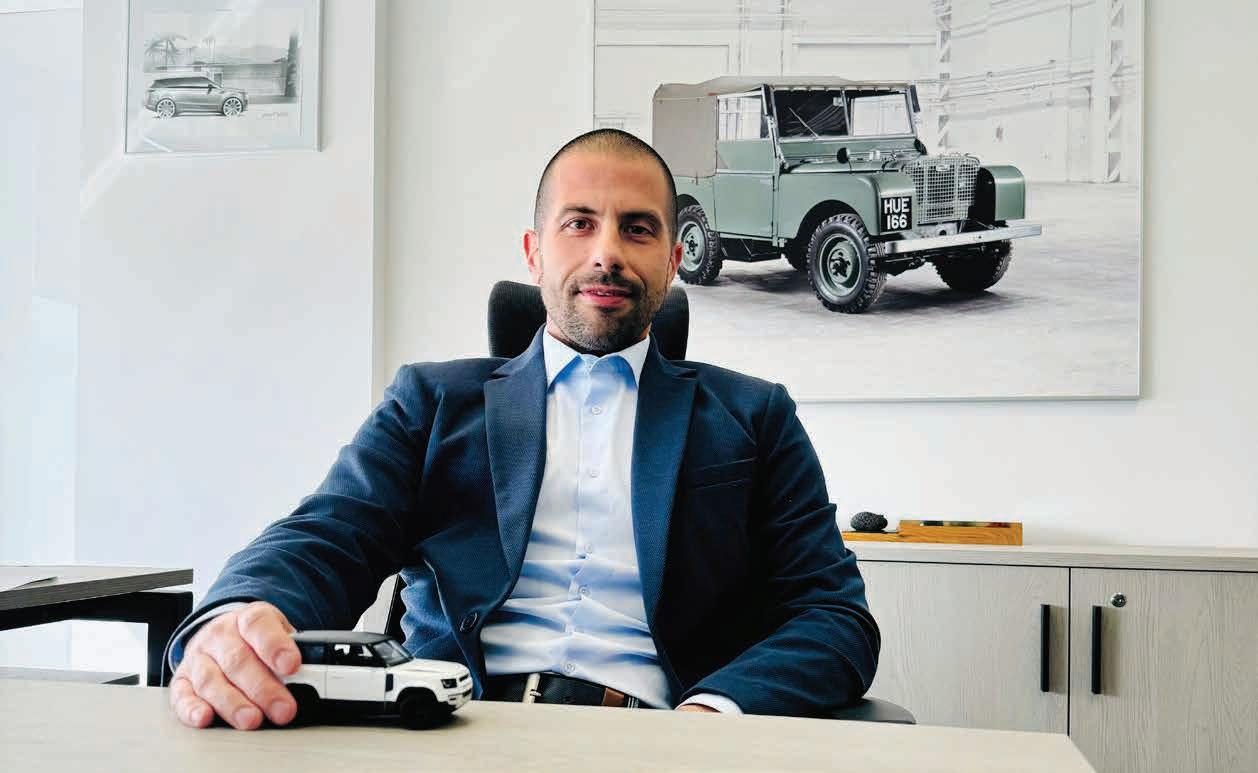
Excellent years for JLR Adria
The
plan to implement a new program called the Adria Diplomatic Program, intended for diplomats residing in the countries of our region, was prepared to support this fact
MILOŠ STEFANOVIĆ
Regional Director – Jaguar Land Rover Adria
We are on an upward trajectory as far as many factors are concerned, including the profitability of manufacturer, distributors and, of course, retail partners, says Miloš Stefanović, Regional Director - Jaguar Land Rover Adria, for Diplomacy&Commerce Hrvatska. We are very proud of the Adria Diplomatic Program, which represents an additional effort to provide diplomats in the Adria region with a faster, easier, and more personalized way of purchasing and maintaining JLR vehicles, Stefanović explains. For our magazine exclusively, he also reveals the secrets of good leaders, which, among other things, include constant changes, transitions, new things, solutions,
THE HOUSE OF BRANDS PHILOSOPHY PUTS THE UNIQUENESS OF EACH BRAND IN THE FOREGROUND BY DIVIDING THEM INTO FOUR HOUSES: RANGE ROVER, DEFENDER, DISCOVERY AND JAGUAR.
the use of new technologies, involvement in new projects, and in his case, above all, cars.
Jaguar Land Rover Adria has the following regional countries under its jurisdiction: Slovenia, Croatia, Serbia, Bosnia and Herzegovina, Montenegro, Macedonia, Albania and Kosovo. How would you rate the business results for the entire region over the past year? Is there a crisis in the automobile market?
As for JLR in the region and, as a wider perspective globally, the past year has been extremely interesting. In terms of classic business results, KPIs, planned vs. realized targets, we had an excellent year – both calendar year and our JLR fiscal year, which ended on March 31. I must emphasize that our brands have been in the process of transitioning from premium to (modern) luxury for more than a year. Being part of that transition, having the opportunity to implement new standards and programs, new technologies and solutions is very interesting.
Given the fact that you cover countries that are members of the EU and have more regulated markets, and those that are not, what differences in business operations would you highlight, and what brings them together?
The region covered by my team is very specific, as everyone from this area is familiar with. As you stated, we have EU and NON-EU countries, and then each market has a lot of specific characteristics, even though it may not seem so at first glance. Of course, with Slovenia and Croatia as EU member states, it is much easier operationally. As we go further south, we enter the complexity of the Adria region. Trade agreements, customs, taxes, legislation... I will give you a practical example of the driverassistance system that we are currently dealing with: Traffic sign recognition works in one country, but stops working at the border with another country,
16 www.diplomacyandcommerce.hr INTERVIEW/CORPORATE
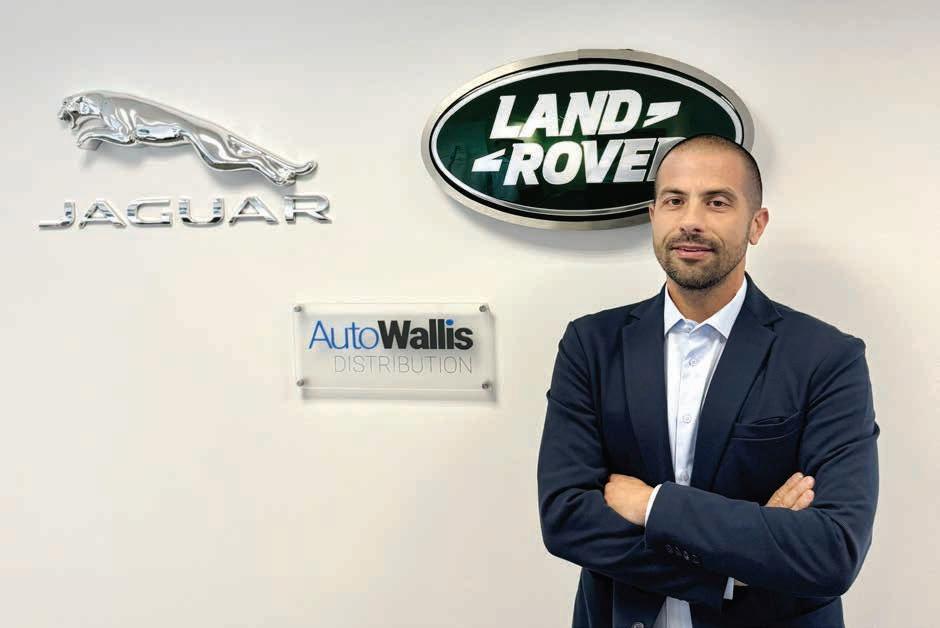
mainly due to legislation. Also, we have the peculiarities of each market in terms of models and their specifications, client requirements and financing. Some of our partners are receiving their car or spare part in just 2 days from our warehouse, while others are waiting for more than ten days because we have three borders and about 1000 kilometers to get to them. What I am trying to say is that there is no one-size-fits-all solution, but each market and partner is approached separately and tailormade solutions are being applied. This can be quite challenging and time-consuming, but it’s also fulfilling and gives us great pleasure when we find a solution and agree upon an efficient work.
This year, JLR Adria plans to implement a new program called the Adria Diplomatic Program, intended for diplomats residing in the countries of our region. What are the specifics and what exactly are your plans within the scope of that program?
We are very proud on this program. It represents an additional effort to provide diplomats in our region with a faster, easier, and more personalized way of purchasing and maintaining JLR vehicles. Yes, they can get their car through Global Diplomatic Sales, but here we try to give additional value besides just a special price. We have planned the program in several stages, where we will improve and add services every year. This year, our focus is getting to know our potential clients, educating them about the basics of the program, and promoting the program itself. The advantages that I would immediately point out are access to the central Adria vehicle stock, short deliv-
THE DEFENDER IS MY FAVORITE JLR MODEL. A MODERN-DAY HERO THAT RESPECTS THE PAST, BUT AT THE SAME TIME HERALDS THE FUTURE. A RARE CAR ON THE MARKET WITH A SPECIAL CHARACTER.
ery time, personalized approach with Diplomatic Sales Executive in our team, quick response to every inquiry. We are currently working with our partners to improve logistics and priority reception in the service, as well as home delivery. Also, vehicle maintenance can already start at the client’s door. With the PickUp & Redelivery Service, we pick up the vehicle and return it to the address chosen by the client. This service is already a standard service for all JLR customers.
Bearing your clients in mind when we talk about the brands you represent, their luxury and refinement, what do the numbers in the field tell us? Which brands stand out and why? What your customers like the most?
To sum it up in one sentence, the numbers in the field show the effort put into this. I think we are doing a perfect job of brand transitioning. We are achieving the planned goals, increasing the market share in most markets, and continuously working to ensure that our brands remain desired and in demand. Here I would briefly explain the new Modern Luxury strategy, according to which our brands are now distinguished into “houses”. The House of Brands philosophy puts the unique-
are already a good leader in my book. We often forget that we spend more time with the people we work with than with family members and friends. In our company, we nurture an informal culture, we encourage employees to be creative, to take initiative, and we support and empower them. We don’t look at the watch too much, but we rather value efficiency and, of course, the results. The energy between people is very important and I think that all of us in the importer office have very similar energies and understanding of the business. Employees can pop out during working hours and finish their private affairs, take a child to the doctor or - if they feel under the weather – just take the day off. When they are trusted, people will reciprocate, there is no need to worry about that. Two days a week, they can work from anywhere (home office), and we also offer a progressive vacation system according to the time spent in the company.
We continuously invest in employees, and in their development. They can influence the course of education and training and we try to introduce additional benefits every year. They can progress within the team or move to one of the sister companies from our group. No one would take this against them, but quite the opposite, we encourage them to do so. I am proud of the fact that I am close with every team member, and that my door is literally always open to everyone.
ness of each brand in the foreground by dividing them into four houses: Range Rover, Defender, Discovery and Jaguar. This allows us to recognize the peculiarities and support the clients of each house, their specificities, wishes, lifestyle habits and needs. Speaking about models, I would spotlight the new Range Rover and Range Rover Sport as the highlight of the range. These are extremely desired vehicles. The personalization options are endless, so most clients want to wait for their unit, assembled according to their wishes and needs. The Defender is my favorite JLR model. Year after year, it records sales growth, even though it has been around for a couple of years. This is a modernday hero that respects the past, but at the same time heralds the future. A rare car on the market with a special character. The range of the Defender buyers is incredible, and I’d say everyone loves it. Or if not everyone, it certainly leaves absolutely no one indifferent.
As a leader, how important is investing in your employees and how do you take care of your people?
Every business and every company begins and ends with people. If you really think like that, you know and understand what empathy means, you
You have been in leading managerial positions in the auto industry for a long time. What drives you in your work and what motivates you for further progress? Where do you see yourself in the next 5 years?
The work I do must be challenging and dynamic to drive and motivate me. I love changes, transitions, new things, solutions, technologies, new projects and, above all, cars. This is what my current job and position enable me to do every day. The people I work with, and I work for, partners... in general, relationships with people are something that fascinates me and moves me from a sociological point of view. I like an organized system with a nice dose of improvisation when needed, creative people, people who think for themselves and are not afraid of their thoughts and ideas. In general, the automotive world is in a very interesting period. I still see myself in the automotive industry. I am very interested in current market trends and the reactions of all of us in the chain. I am not thinking about changing the position until the final implementation of the new strategy and the transformation of the brands. After that, you never know, maybe another challenging market or a continent.
17 INTERVIEW/CORPORATE
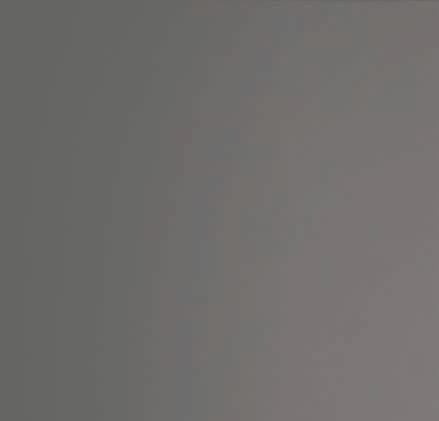

CBS Croatia as one of market leaders for more than half a decade
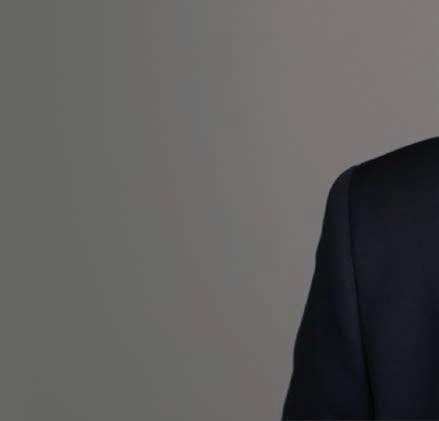
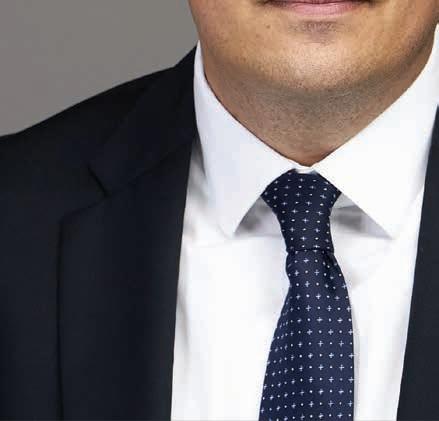

Elements like Eurozone, Schengen and a very stable fi nancial system are key for the market and provide us with an excellent foundation for future development, and that is precisely why we are very optimistic about the period ahead.
PREDRAG TUTIĆ
Director of Cushman & Wakefield CBS International Croatia
At the end of last year, the global company Cushman & Wakefield CBS International, which stands out for its professionalism and dedication to clients, marked half a decade of work in Croatia. In a business environment that dictates new trends, they have proven to be resistant to all changes, and they announce new projects and plans. As a top expert, Predrag Tutić, Director of Cushman & Wakefield CBS International Croatia, also talks for Diplomacy&Commerce about the real estate market from their portfolio.
You celebrated 5 years of doing business at the end of last year. How would you describe the company you lead? What sets it

apart from the competition and what makes you different?
Above all, we can be proud of our team of more than 20 young professionals who bring a freshness and versatility in approach to our real estate industry, and they are most responsible for our rapid growth and development of all real estate services we offer to clients in Croatia.
We stand out with a strong focus on our clients’ needs and are dedicated to providing personalized services and solutions for each of our clients, which resulted in high client satisfaction and trust. Likewise, we use and develop new tools and platforms in order to improve the efficiency of business and provide superior service to each segment, thus maintaining a competitive
WE CAN ANNOUNCE WITH GREAT PLEASURE THAT OUR COMPANY, TOGETHER WITH OUR GLOBAL PARTNER CUSHMAN&WAKEFIELD, IS ENTERING THE AUSTRIAN MARKET THIS YEAR
advantage. We also plan to offer our clients very useful digital tools in certain segments of property management which they will be able to use very easily.
How would you rate the real estate market (commercial and residential) in those 5 years? Where is Croatia compared to countries of similar size and standards in the EU?
In general, Croatia is at a great advantage compared to the countries in the region and has an excellent position on the investment map due to a very stable economy and market, joining the Eurozone and Schengen, which only additionally established a good geopolitical position and gives us great potential to make even stronger use of our position in terms of developing new projects.
We see every year that the real estate market in Croatia is gener-
18 www.diplomacyandcommerce.hr INTERVIEW/CORPORATE
ally increasing and that it maintains a very good volume of transactions, however, we develop new projects a little slower than the surrounding countries. We have great potential in sectors such as tourism, logistics, office space and housing, where we lack new projects, which is a consequence of short-term planning and unresolved urbanism.
Despite everything, the interest of investors from countries such as Poland, the Czech Republic and Hungary is increasing and they see Croatia as a very potent market for the development of both commercial and even more residential projects that have increasingly better returns compared to their markets.
From your many years of professional experience, what can we expect when it comes to the real estate market in the coming period (growth, stagnation, decline)?
We think that every segment of the real estate market has great potential in terms of developing future projects because, first of all, we have project deficiencies, we have excellent demand from both domestic and foreign buyers, especially on the coast, and we have a very stable financial sector and economic environment.
So we can safely say that we do not see any reason for the price drop in the market because there is absolutely no single factor that would affect it.
The future development of projects, in addition to the construction of new ones, has enormous potential in all major cities and in the brownfield area, which is almost unused for us, and in addition, Croatia will have to prepare in terms of increasing energy efficiency, of which we are obliged in accordance with European regulations, and this will further stimulate the construction sector.
You also deal with tourism, hotel premises, land, logistics real estate… What is the situation in these segments of the market?
Yes, the largest investment in the hotel market will be completed this year. Our team participated in the project as a sales consultant and we see that investors are ready to pay for portfolios in Croatia at a higher price than in some other countries in the surrounding area, which makes sense, considering the excellent tourism results every year.
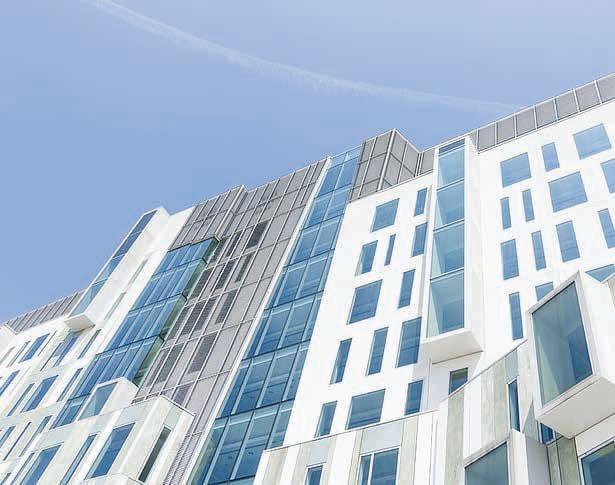
IN THE OFFICE SPACE MARKET, THERE HAS BEEN NO SIGNIFICANT PROGRESS IN THE DEVELOPMENT OF NEW PROJECTS FOR YEARS, WHICH RESULTED IN A HISTORICALLY LOW VACANCY RATE OF ONLY 2% AND A 10% INCREASE IN OFFICE SPACE RENTAL PRICES
In the office space market, there has been no significant progress in the development of new projects for years, which resulted in a historically low vacancy rate of only 2% and a 10% increase in office space rental prices. Despite this, the tenants remained very dynamic in 2023, and the total take up is estimated to reach around 60,000 sqm again, while our rental prices for modern and first-class office spaces are 14.516.5 EUR/m².
On the logistics market, finally, after an entire decade, we have approximately 470,000 m² of warehouse and production space under construction, of which 80% of the projects, i.e. about 370,000 m², are under construction in the vicinity of Zagreb.
However, there is only 30%, i.e. 115,000 m² of top quality warehouse space in 2 projects – one outside Samobor and the other in Velika Gorica, which are being
constructed for the market, and where potential users who have a need for new spaces can expand their warehouse and logistics capacities at this moment. The remaining 256,000 m² of space are predominantly projects that large retail chains and certain domestic logistics companies are building for their needs.
You are a global company, operating in the region. Can you compare the markets of the region where you operate, what are the similarities and what are the differences?
Almost every market is only superficially similar, but in fact it can differ quite a lot due to a number of factors in terms of geopolitics, economic stability and not the strength of the market, different development stages of the market itself, and therefore a certain segment of real estate and financial opportunities.
In these proportions, Croatia is in every sense at an advantage over countries like Hungary, the Czech Republic or Poland, where we have witnessed a huge increase in interest rates, or let’s say Serbia, which is not part of the European Union and the Schengen zone.
Where do you see your company in 5 years, and in that regard, how do you see the real estate market and your industry in general during that period?
We continue to see ourselves as a leader in the real estate market, as one of the key advisors in the preparations for future projects, because it has happened in our region as well that investors are no longer confident entering into projects without the strong support of a consultant.
We can announce with great pleasure that our company, together with our global partner Cushman&Wakefield, is entering the Austrian market this year, which is big step forward for us and shows that we are very optimistic regarding the future of the markets in this entire region.
This obliges us to continue further development in terms of our capacities, to invest in our employees in order to secure and justify the future trust of our clients in all segments of the market.
19 INTERVIEW/CORPORATE
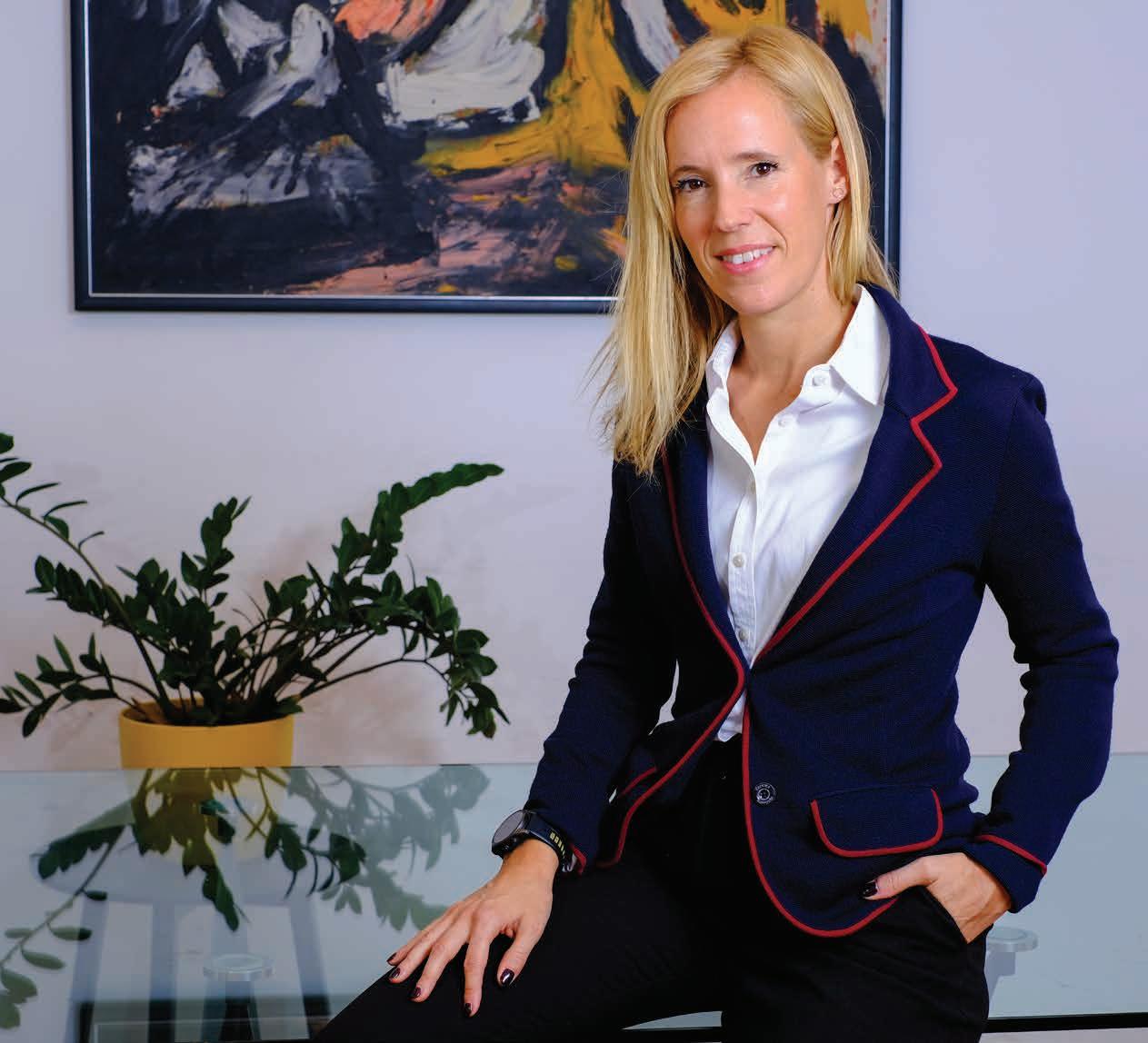
Croatia’s EU membership has expanded the scope of lobbying activities
Croatia’s accession to the European Union in 2013 has had a profound impact on the public affairs industry within the country.
20 www.diplomacyandcommerce.hr INTERVIEW/CORPORATE
MILLY ANTONIA DOOLAN
Co-owner and Managing Director at EuroNavigator
The upcoming EU-wide elections will no doubt influence the policy priorities of the next European Commission due to the potential shifts in the political landscape of the European Parliament, for Diplomacy&Commerce magazine says Milly Antonia Doolan, Coowner and Managing Director at EuroNavigator, a Zagreb-based public affairs agency. From many years of experience in lobbying, business, and the Government relations sector, she brings her experience to Croatia, as well as to the countries of the region. What are the challenges she faces in business, but also the ways to solve them, and how will the next EU elections impact enlargement policies, reveals in an exclusive interview for our magazine.
Croatia has been a full-fledged member of the European Union for more than ten years now. What kind of an impact has membership had on the public affairs industry?
One of the most notable effects has been the heightened focus on EU affairs. With the adoption of EU legislation and regulations directly applicable in Croatia, there has been a significant increase in the need for businesses, nongovernmental organizations, and other stakeholders to engage with EU institutions and processes. This has led to a surge in demand for expertise in EU law, policy analysis, and advocacy within the public affairs sector.
Stakeholders are now actively seeking to contribute to EU policies and decisions that impact the country, leading to the emergence of more lobbying firms and consultants specializing in EU affairs. Croatian companies, industry associations, and civil society organizations have also ramped up their engagement in EU-level advocacy efforts, as can be seen in the EU Transparency Register.
The growing importance of EU affairs has necessitated the development of skilled professionals who can navigate the complexities of EU decision-making processes and effectively represent the interests of clients in Brussels. This has resulted in the establishment of training programs, conferences, and networking opportunities focused specifically on EU public affairs.

Furthermore, Croatia’s alignment with EU policy priorities across various sectors has become imperative. Public affairs professionals play a crucial role in helping businesses and organizations understand and adapt to EU regulations and policies, while also advocating for Croatian interests within the EU decision-making process.

Can you speak to the overall understanding that national companies from smaller or newer Member States have of the Brussels policy-making machine? Do they stand a chance against Europe’s behemoths when it comes to decisionmaking?
STAKEHOLDERS ARE NOW ACTIVELY SEEKING TO CONTRIBUTE TO EU POLICIES AND DECISIONS THAT IMPACT THE COUNTRY, LEADING TO THE EMERGENCE OF MORE LOBBYING FIRMS AND CONSULTANTS SPECIALIZING IN EU AFFAIRS.
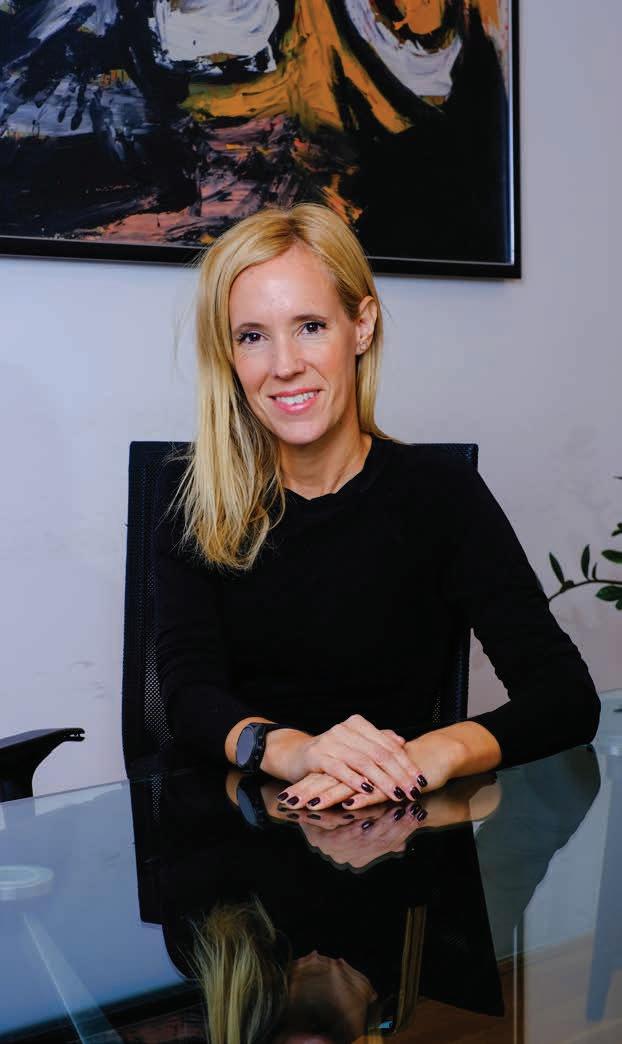
Absolutely. When considering the EU policy-making landscape, it is essential to recognize the diverse spectrum of players involved. National companies from smaller or newer EU member states often face an uphill start in navigating Brussels, especially when compared to the more established European corporations. One of the key factors influencing their competitiveness is resources and knowledge. Namely, larger companies typically already have established networks, allowing them to engage in robust lobbying activities and build on relationships with policymakers.
However, it is important to note that the ability to compete in Brussels is not solely determined by background or financial muscle. Smaller companies can strategically leverage their agility and sector-specific expertise to carve out a niche in EU decisionmaking processes. By forming coalitions with similar-sized businesses or industry associations, they can amplify their voices and pool resources to compete more effectively.
Furthermore, the EU’s commitment to promoting competitiveness and innovation creates opportunities for smaller companies to thrive. Initiatives like Horizon Europe and the European Innovation Council provide funding and support specifically tailored to small and mediumsized enterprises (SMEs), allowing them to innovate and grow within the European market.
To what extent is EU enlargement a priority for the European Union, especially when it comes to the Western Balkans?
EU enlargement, particularly in the Western Balkans, holds significant importance for the European Union across multiple dimensions. Firstly, it is crucial to understand that EU enlargement is not merely a geopolitical exercise but rather a strategic investment in promoting stability, prosperity, and democratic values in Europe. Indeed, by offering the prospect of EU membership, the EU incentivizes political and economic reforms, and encourages regional cooperation, ultimately contributing to peace and stability in the region.
Accession to the EU requires candidate countries to undergo comprehensive reforms to align their legal and institutional frameworks with EU standards, leading to improvements in
21 INTERVIEW/CORPORATE
governance, and the functioning of democratic institutions. Economically, EU membership offers significant benefits for candidate countries, including access to the EU single market, financial assistance, and increased investment opportunities. For countries in the Western Balkans facing economic challenges, EU accession represents a pathway to economic integration, growth, and enhanced living standards for their citizens.
From a geopolitical perspective, the Western Balkans region is strategically important for the EU. Ensuring stability, security, and prosperity in the Western Balkans is not only in the interest of the region itself but also aligns with broader EU objectives, including fostering good relations with neighbouring countries, managing migration flows, and countering potential security threats.
EU elections are taking place this June. With the possibility of a new Commission elected, will enlargement be pushed down the priority list?
Depending on the election outcome, we may see a reconfiguration of coalitions within the Parliament, impacting legislative outcomes and policy direction on various fronts, including environmental regulation, digital transformation, economic policies, as well as EU external relations. Changes in the Council’s makeup and the Commission’s leadership, depending on the election outcomes, could introduce new policy priorities or modify existing ones. However, policies that fall under the greater context of open strategic autonomy such as the EU’s energy and climate independence, enlargement, competitiveness, security, and fiscal framework are unlikely to see major changes due to the current geopolitical context that we are experiencing. Given these dynamics, while the core values and long-term strategic objectives of the EU, such as environmental sustainability, digital transformation, and promoting democracy, are likely to remain intact, the approach and emphasis on specific policies could see adjustments. The extent of this shift will depend on the final election outcomes and the subsequent negotiations among EU institutions.
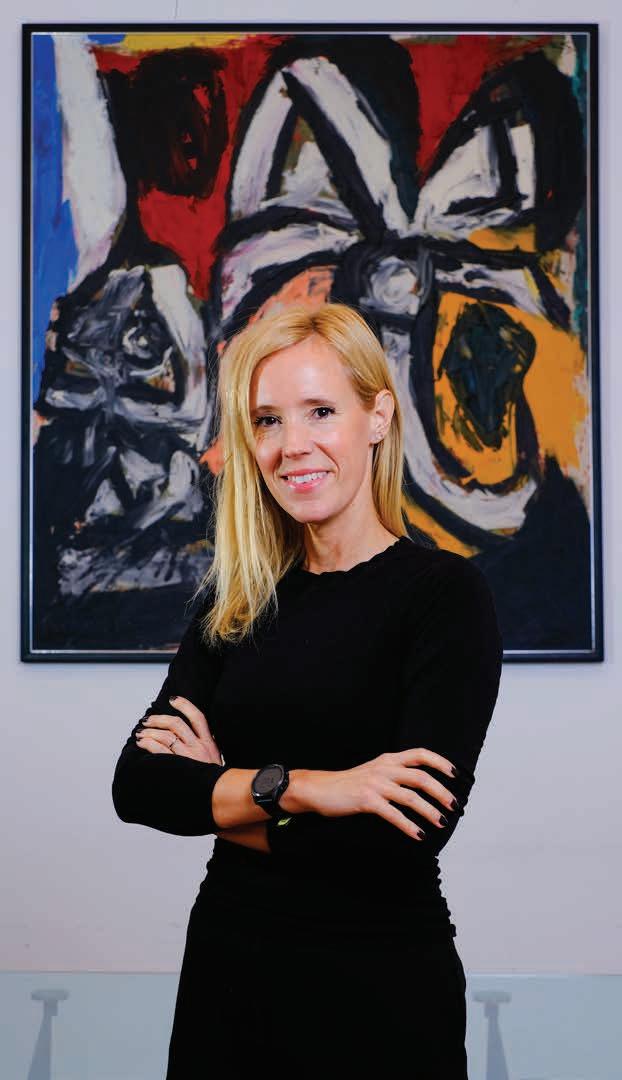
COMPANIES SHOULD MAKE THE MOST OF THE CONSULTANCY MARKET TO NAVIGATE THESE ASPECTS EFFECTIVELY. AND MOST IMPORTANTLY, THEY SHOULD START TO UNDERSTAND AND ENGAGE WITH THE BRUSSELS POLICY-MAKING MACHINE BEFORE ACTUAL MEMBERSHIP.
As companies in the Western Balkans look towards European Union membership, what steps should they be taking to prepare from a public affairs perspective?
For companies in the Western Balkans aiming to align with the European Union standards and expectations, a proactive approach is essential. Firstly, becoming familiar with and
Engaging in European cooperative initiatives and forums is also vital. Such platforms can offer insights into best practices and provide networking opportunities with counterparts already operating within the EU framework. This can be instrumental in understanding the practical aspects of compliance and integration with EU markets. Additionally, fostering a culture of innovation and continuous improvement can be a game changer. The EU market values innovation, particularly in sustainable and green technologies. Companies that are ahead in these areas may find better opportunities in the EU market.
Lastly, understanding the legal and financial implications of EU integration is important. This includes everything from tariff changes and market access rights to funding opportunities available for businesses in candidate countries. Companies should make the most of the consultancy market to navigate these aspects effectively. And most importantly, they should start to understand and engage with the Brussels policy-making machine before actual membership. This way they will know the landscape and already have a network of allies once membership commences.
Are there any specific initiatives that companies from the WB region should already be paying closer attention to?
adhering to EU regulations and standards across all operations is paramount. This encompasses everything from product safety and environmental practices to labour laws and data protection. The EU has comprehensive regulations in these areas, and alignment ensures not just compliance but also enhances competitiveness on the European market.
The EU’s new Growth Plan for the Western Balkans that aims to bring economic benefits to the region in advance of accession is one such initiative. The Plan aims to bring the Western Balkans closer to the EU single market, deepen regional economic integration, accelerate fundamental reforms, and increase pre-accession funds. Companies should stay informed about the specific opportunities this plan offers, such as financial support and market access, to capitalize on them effectively. Integrating with the EU’s single market involves ensuring compliance with its regulations and standards. Companies should prioritize understanding and adhering to these requirements, particularly in sectors highlighted by the Growth Plan, including goods, services, workers’ mobility, digital single market, and industrial supply chains.
22 www.diplomacyandcommerce.hr INTERVIEW/CORPORATE
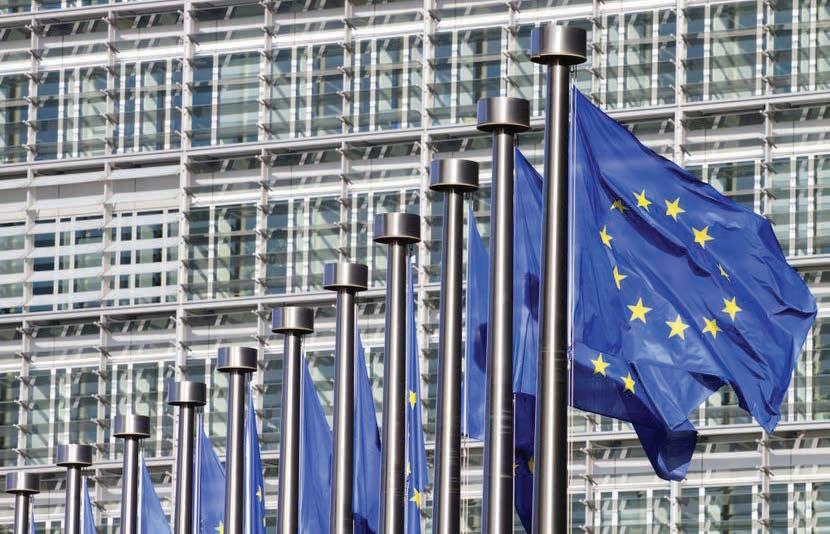
EUROPEAN ELECTIONS 2024
FROM JUNE 6 TO 9, 2024, AROUND 373 MILLION EUROPEANS WILL BE INVITED TO THE POLLS TO ELECT 720 MEMBERS OF THE NEXT EUROPEAN PARLIAMENT.
Voters in Croatia will elect 12 members of the European Parliament. The list of candidates must win at least 5% of the votes in order to participate in the distribution of seats in the European Parliament. In practice, since there are 12 representatives from Croatia in the European Parliament, each political party will need to receive at least 8.33% of the votes in order to secure one seat in the Parliament.
U EU election act stipulates that elections for the European Parliament are to be held every five years, in the period from Thursday to Sunday. This 2024 election will take place in all 27 member states of the European Union from Thursday, June 06, to Sunday, June 09.
Voting will begin in the Netherlands on Thursday, June 06, followed by voting in Ireland on Friday, June 07, and in Latvia, Malta and Slovakia on Saturday, June 08. In the Czech Republic, polling stations will be open on Friday and Saturday, while in Italy voting will take place on Saturday and Sunday. The remaining 20 member states (Austria, Belgium, Bulgaria, Cyprus, Denmark, Estonia, Finland, France, Greece, Croatia, Lithuania, Luxembourg, Hungary, Germany, Poland, Portugal, Romania, Slovenia, Spain and Sweden) will hold elections on Sunday, June 09.
The preliminary results will be announced on Sunday evening. More information on the announcement of results and practical details on election night are stated below.
Organization of elections
European elections are organized in accordance with the national legislation of the member states, although there are numerous common provisions established by EU law. Proportional representation must be ensured, and while most states are organized into one constituency, the national territory of some member
states (Belgium, Ireland, Italy and Poland) is divided into several constituencies.
EU citizens living in a different member state can vote and run for office in that state.
When it comes to electoral lists, there are several national systems, from closed lists (no possibility to change the order of candidates) to semi-open lists (voters can change the order of candidates on the selected list) and open lists (voters can choose candidates from different lists).
The minimum voting age is also regulated by national regulations. In most member states, this limit is 18 years, except in Greece (17) and in Austria, Belgium, Malta and Germany (16). The minimum age for candidacy is different and ranges from 18 to 25 years of age.
“USE YOUR VOTE” – ELECTORAL CAMPAIGN OF THE PARLIAMENT
The European Parliament is the only European institution that is directly elected by the citizens and, as such, it is the only one that is directly accountable to the citizens and can hold other institutions accountable in order to ensure a transparent and democratic Europe.
As in previous years, the Parliament intends to inform the public about the upcoming elections and their importance for the future of Europe. Institutional communication is non-partisan and complements the campaigns of political parties and individual candidates by highlighting the achievements of the EU and the Parliament and the importance of participation in democratic processes by voting.
POLICY
23
Keeping our promise to Europe:
The story of the von der Leyen Commission
EUROPEAN ELECTIONS 2024
24 www.diplomacyandcommerce.hr
Contents Managing crises head-on 3 Defeating the pandemic 3 Powering Europe’s recovery 6 A firm response to Russia’s invasion of Ukraine 9 Strengthening Europe’s resilience, security and defence capabilities 14 Common solutions to the worst energy crisis in decades 16 Providing support when disaster hits 18 Keeping the course on our priorities 22 The European Green Deal: a growth strategy that protects the climate 22 Building Europe’s digital leadership 26 A hands-on approach to foster Europe’s industrial competitiveness 30 Our social market economy 34 Tackling irregular migration 41 Strengthening democracy and the rule of law ........................................ 45 A stronger and bolder Europe in the world 48 Working together as a Union 52 25

Just 15 weeks after the Commission’s proposal, the EU Digital COVID Certificate was available for citizens in every Member State to facilitate safer travel for all
By summer 2023, 2.2 billion EU Digital COVID Certificates had been issued, helping Europeans to travel safely. 78 countries and territories were connected to the EU Gateway, which allows authorities to verify Digital Certificates in a secure way that guarantees individual privacy.
Boyana from Bulgaria, a medicine graduate turned journalist, resumed medical service during the COVID-19 pandemic as a nurse on the frontline. In 2023, she trained as a paramedic for Bulgaria’s new emergency medical helicopters, bought with EU funds and with the help of NextGenerationEU Expecting her first child, she is looking forward to joining the helicopter fleet.
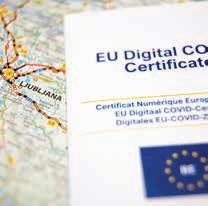
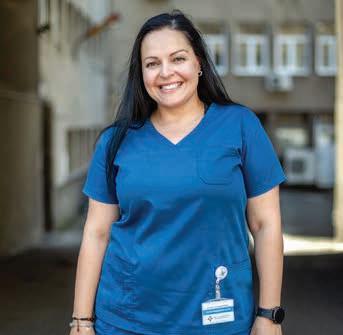
Team Europe (EU institutions and Member States) mobilised €53.7 billion to help partner countries deal with the immediate health emergency, to strengthen their healthcare systems, and to mitigate the socio-economic consequences.
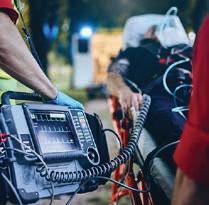
2024 4
EUROPEAN ELECTIONS
© Adobe Stock
©VihrenGeorgiev, 2023
26 www.diplomacyandcommerce.hr
©Adobe Stock
We co-launched the Access to COVID-19 Tools Accelerator initiative (ACTAccelerator) to promote the development and equitable access by the whole world to COVID-19 vaccines and treatments.
At the heart of the ACTAccelerator, there was COVAX - a multilateral effort to bring vaccines to developing countries. As Team Europe, we remain the largest donor of COVID-19 vaccines through COVAX.
We took unprecedented assistance measures to help Europeans cope with the social and economic challenges resulting from the pandemic.
SURE, our instrument to finance short-term employment schemes across the EU, helped support about 31.5 million employees and self-employed people and over 2.5 million businesses in 2020. This represented almost one third of total employment and over one quarter of businesses in the beneficiary Member States. Another 9 million people and over 900 000 businesses received support in 2021. In total, €98.4 billion of financial assistance was disbursed to 19 Member States under SURE
SURE Supported some and self-employed people and over 2.5 million businesses
▪ €98.4 billion of financial assistance disbursed to







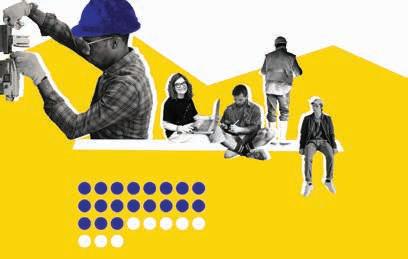
Thanks to the EU’s high credit rating, SURE also helped Member States save an estimated €9 billion in interest payments.
The protection of employment facilitated Europe’s rapid economic rebound in 2021 €
The Commission put forward the Coronavirus Response Investment Initiative and the Coronavirus Response Investment Initiative Plus (CRII and CRII+) These instruments helped Member States buy medical equipment, pay health workers, and support workers and SMEs by making expenditures related to COVID eligible under Cohesion Policy and making that eligibility retroactive.
Looking towards the future, we have started building a European Health Union to prepare and respond to health crises together. We are making sure that medical supplies are available and affordable, and that Member States work together to improve prevention, treatment and aftercare for all sorts of diseases, particularly cancer thanks to the Europe’s Beating Cancer Plan
5
27



Its ambitious funding targets for climate action (37 %) and digital action (20 %) have been amply exceeded, with 40 % of funds spent on climate action, and 26 % spent on digital action. The funds also significantly support social and cohesion actions.

RECOVERY AND RESILIENCE FACILITY

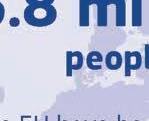
5.8 million people
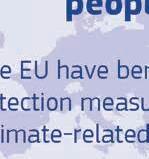

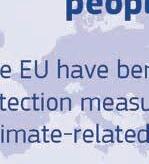
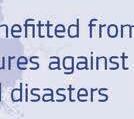
in the EU have benefitted from protection measures against climate-related disasters
Thanks to climate action investments under NextGenerationEU, 5.8 million people in the EU have benefitted from protection measures against climate-related disasters, and 22 million megawatts-hours in energy consumption have been saved.

In France, NextGenerationEU financed the energy-efficient renovation of 20 000 social dwellings. In Spain, it supported over 60 companies in research and innovation for sustainable mobility.
40 % 26 %
Recovery and Resilience Facility: contributing to our climate and digital objectives of expenditure for CLIMATE investments and reforms to foster the DIGITAL transition of expenditure
EUROPEAN ELECTIONS 2024 7
©Adobe Stock
28 www.diplomacyandcommerce.hr
©Adobe Stock
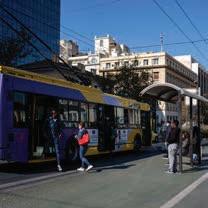
We are also providing finance for national projects that address climate change mitigation. For example, Greece’s recovery plan includes measures to boost civil protection and response efforts in the face of wildfires and floods, as well as the climateproofing of transport infrastructure.

Under NextGenerationEU, almost 18 million households in the EU have received highspeed Internet access, and 247 million users have benefited from new or improved public digital services
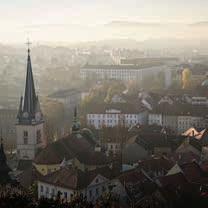
The Slovenian recovery plan includes measures to address floods. Following flash floods in August 2023, we set up a task force, featuring Commission and Slovenian representatives, to study ways of better supporting affected areas with existing EU funding.

As part of the reforms under NextGenerationEU, Member States have also reduced unnecessary administrative burdens and improved their business environment. Italy, for example, introduced several reforms to improve its business environment, notably reducing the time to set up a business to 4 days.
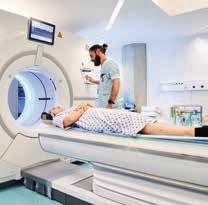
European companies are seizing the opportunities offered by NextGenerationEU. In a truly European partnership, Swedish Elekta and Dutch Philips are supplying key components for the installation of a magnetic resonance linear accelerator for cancer treatment in Malta, one of about 100 such machines worldwide
8
©Adobe Stock
©Adobe Stock
29
EUROPEAN ELECTIONS 2024
The
A firm response to Russia’s invasion of Ukraine
As Russian tanks crossed the border, our Union stood up for Ukraine with unity, strength and resolve. And the Commission, once more, rose to the occasion. We paved the way to hosting more than 4 million Ukrainian refugees in the EU. We organised the delivery of unprecedented humanitarian, financial and military assistance from the EU and Member States, reaching over €88 billion so far, including €28 billion in military support. And we are working closely with our G7 partners to make sure every euro goes where it is most needed in Ukraine.
The dictator in the Kremlin has gambled on the disunity of Europeans. Together, we proved him wrong. We will stand by Ukraine for as long as it takes. Through the new Ukraine Facility, we will deliver another €50 billion over the next 4 years to help provide basic services – keep schools open, pay salaries and pensions, while Ukraine’s people continue to fight back against the invader. Every victory for Ukraine against the aggressor is also a victory for our common security in Europe.
At the same time, we have supported Ukraine every step of the way as it works hard to reform and get closer to the EU. Recognising the country’s tremendous progress and responding to the aspirations of the Ukrainian people, our Union took the historic decision to open accession negotiations with Ukraine, based on the Commission’s recommendation.
We also helped tackle the impact of Russia’s aggression worldwide. As Russia’s war threatened to trigger a global food crisis, we came up with our trademark solutions to bring Ukraine’s crops to countries that needed them most.




















































9
story of the von der Leyen Commission
About 122 million tonnes of Ukrainian goods exported © Adobe Stock *Between May 2022 and January 2024 €88 billion More than in overall support for Ukraine and Ukrainians* *As of February 2024 €17 billion made available Member States to cater for the needs of people €43.4 billion and humanitarian assistance in financial and budget support €28 billion in military assistance for Ukraine under the European Peace Facility and from Member States individually to 30 www.diplomacyandcommerce.hr
Strengthening Europe’s resilience, security and defence capabilities
As the strategic environment around us has fundamentally changed, Europe needs to face up to a new responsibility. This is why this Commission is developing a new European Defence Industrial Strategy. It will bring strategic focus and will help to tie together Member States’ and European firms’ efforts - from research to industrialisation and commercialisation of new systems, on to production ramp-up, coordinated procurement and security of supply. Because peace requires security
KEY ACHIEVEMENTS
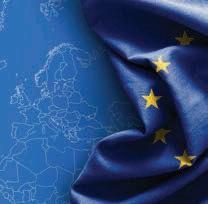
We have boosted the physical security of critical infrastructure and entities thanks to the Critical Entities Resilience Directive, which requires that Member States carry out risk assessments of their critical sectors; and with the Critical Infrastructure Blueprint we set a framework for a unified response to common critical infrastructure incidents.
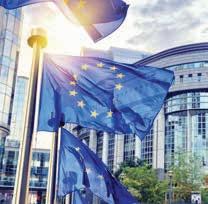
We have stepped up the fight against organised crime and terrorism offline and online. We have set out rules to fight new forms of human trafficking; we have laid out a roadmap in the fight against criminal networks, notably those involved in drug trafficking. To fight terrorism and prevent radicalisation, rules have been put in place requiring that online platforms remove online terrorist content within 1 hour.
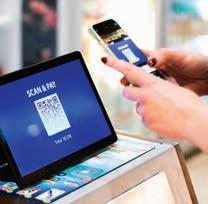
The Commission has acted to counter the rise of disinformation and misinformation, especially online. We strengthened the Code of Practice on Disinformation, which includes major technology companies, platforms and civil society. With the Digital Services Act we added additional means to prevent false information from spreading online.
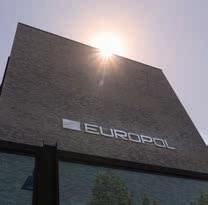
We have boosted cross-border cooperation among police and law enforcement authorities. Europol and Eurojust have been given reinforced mandates to better support national authorities.
The story of the von der Leyen Commission 14
© A d ob e Stock
© A d ob e Stock
©Adobe Stock
© A d ob e Stock
31
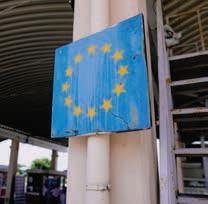
The Commission worked to enable the conditions that allowed the safe and successful enlargement of the Schengen area to Croatia, Romania, and Bulgaria, while at the same time updating its governance and its rules. A yearly Schengen cycle was launched in 2022, starting each year with a State of Schengen Report, which identifies risks and security gaps.
In February 2024, an agreement was reached by co-legislators on an updated Schengen Borders Code. The new code establishes a mechanism to introduce temporary travel restrictions at the external border in case of health emergencies. The code also gives Member States the means to fight the instrumentalisation of migrants by thirdcountries and non-state actors.
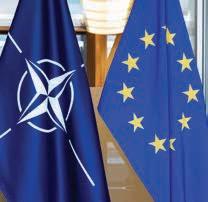
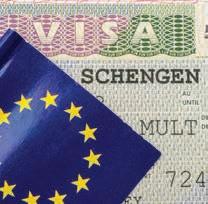
We have boosted our strong partnership with NATO. Through a new Joint Declaration on EU-NATO Cooperation, we are developing our common work on hybrid threats, cyber, terrorism, and the security implications of climate change. We launched the EU-NATO Task Force on resilience of critical infrastructure to better prevent common disruptions to essential services and address joint security challenges in the area of critical infrastructure.
With the European Defence Fund, the European Defence Industry Reinforcement Through Common Procurement Act, and the Act in Support of Ammunition Production, we are mobilising Europe’s defence industry to manufacture more of our security at home. Short-term measures in response to the full-scale invasion of Ukraine will soon be substituted by the European Defence Industry Programme
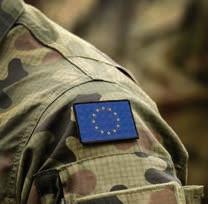
ELECTIONS 2024 15 © A d ob e Stock
EUROPEAN
©Adobe Stock
© A d ob e Stock
© A d ob e
32 www.diplomacyandcommerce.hr
Stock
KEY ACHIEVEMENTS
The von der Leyen Commission has continued to provide assistance across the world. Over the past 4 years, the EU Civil Protection Mechanism has been activated on over 400 occasions
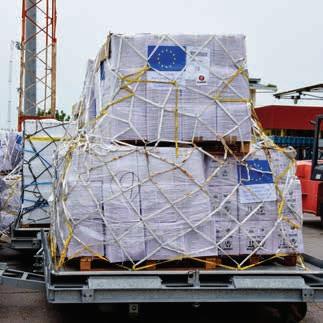
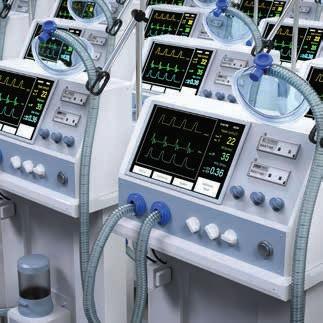
During the pandemic, the Commission coordinated and co-financed the delivery of 190 million medical and personal protective equipment items, including ventilators, to third countries
As borders started to close at the beginning of the COVID-19 pandemic, we repatriated over 100 000 people back to Europe, bringing Europeans and their families home.
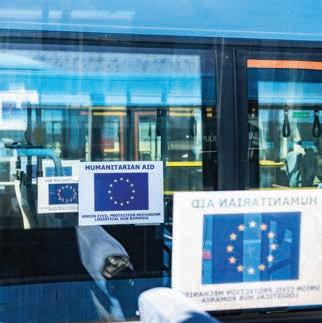

Since Russia launched its war of aggression against Ukraine, we have organised the largest operation in the history of the EU Civil Protection Mechanism, delivering 144 000 tonnes of aid
20
© Adobe Stock 33
EUROPEAN ELECTIONS 2024
The story of the von der Leyen Commission
In response to violent wildfires across Europe, the Mechanism has responded by enabling the deployment of firefighting planes, helicopters and firefighting personnel. When forest fires devastated Cyprus, Greece, Italy, and Tunisia in 2023, around 2 000 personnel, including firefighters, were sent to tackle the emergency
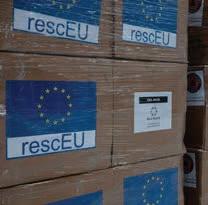

Since 2019, we have established rescEU medical stockpiles across Europe, containing crucial equipment such as ventilators, personal protective equipment, medicines, and chemical, radiological, nuclear and biological equipment.
The Commission has also established global stockpiles of aid – the European Humanitarian Response Capacity –hosted in Latin America, the Middle East, Asia, and Europe. Through the Capacity, the EU aims to send aid faster to crisis zones.
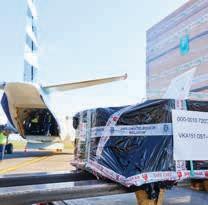
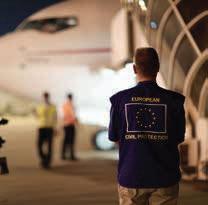
The EU remains a world-leading humanitarian donor. Since December 2019, EU humanitarian funding has exceeded €11 billion. We have responded to humanitarian emergencies across the world: from Afghanistan to Sudan, and Gaza most recently.
34 www.diplomacyandcommerce.hr
Keeping the course on our priorities
The European Green Deal: a growth strategy that protects the climate
Right at the start of our mandate, we rallied Europe around a common goal: to develop a new growth model, the European Green Deal, based on a clean and circular economy. We set ourselves targets to become climate neutral by 2050. Because only what gets measured, gets done. With this compass, we pushed forward a clean transition that protects people and the planet, is economically sound and socially fair.
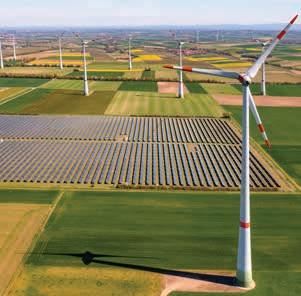
Our vision is clear: Europe should remain a prime destination for investments that bring stable, future-proof, quality jobs, with a strong industrial base
We put in place a framework to deliver a reduction of at least 55 % of greenhouse gas emissions in comparison to 1990 by the end of this decade. We ramped up EU-level investments. Almost €400 billion of EU funds from NextGenerationEU and cohesion policy are funding climate-related projects. We set out a robust framework for sustainable finance and became the biggest issuer of green bonds worldwide.
And we have shown that it is possible to decouple economic growth from emissions: since 1990, greenhouse gas emissions have dropped by 32.5 %, and our economy has grown by close to 70 %
And we have fostered the development of innovative technologies that we need to reduce emissions. With the Net-Zero Industry Act, we will dramatically speed up permitting processes for clean tech manufacturing and we will support European businesses to deliver the transition while maintaining their competitive edge.
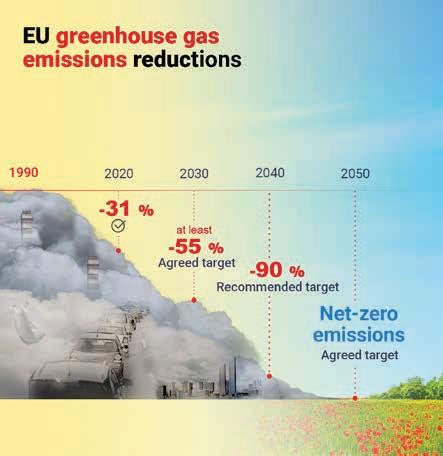

The story of the von der Leyen Commission 22
35
©Adobe Stock
EUROPEAN ELECTIONS 2024
The story of the von der Leyen Commission
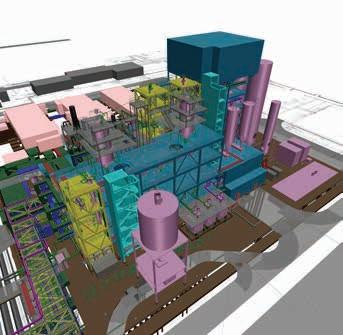
Near Cologne, Germany, Lyondell Basell supported by the EU’s Innovation Fund, is developing a commercially viable plastic waste recycling plant that will run 100 % on electricity The project will thus reduce the problem of plastic trash and resource scarcity, while being carbon-neutral
But the rest of the world needs to level up. To address carbon leakage, we put in place the Carbon Border Adjustment Mechanism. This helps to make sure that emissions are reduced wherever they are produced and the EU’s climate objectives are not undermined.
From the beginning, we promised to Europeans to work on making the transition socially fair. We kept our promise. We set up the Just Transition Fund and the Social Climate Fund, to support those who are more vulnerable and face the biggest challenges to adapt.
Our Green Deal is delivering on its objectives - Europe is on track to achieve its climate targets. And we are turning the necessary decarbonisation of our industries into a growth opportunity.
Eastern Wielkopolska, a lignite-mining region of Poland, is pursuing an ambitious path towards climate neutrality. Supported by the EU’s Just Transition Fund and the Innovation Fund, the region could build Poland’s first electrolysers to produce hydrogen. By actively reskilling workers, nobody is left behind on the way towards climate neutrality.
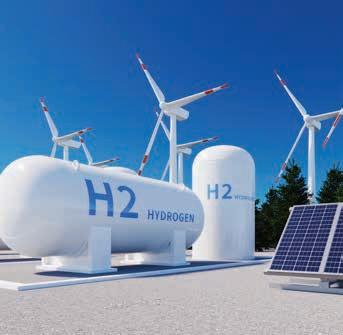 ©LyondellBasell, 2024
©LyondellBasell, 2024
36 www.diplomacyandcommerce.hr
©AdobeStock
Our social market economy
The competitiveness of our social market economy is built on our human capital – on the skills and the wellbeing of our workers. Since the beginning of the mandate, this has been at the core of our action. We established the Pact for Skills, to give workers the training that they need to match business’ needs, and we backed it with €65 billion worth of investments in skills from the EU budget and NextGenerationEU. This is paramount for our people and for our companies, as two thirds of SMEs in Europe say they cannot find the talent that they need.
Nikola has been working for over 12 years in the Maritsa Iztok coal mining complex in Bulgaria, one of the largest of its kind in South-East Europe. He decided to acquire new skills for the future. As part of the European Year of Skills, he has joined the RES-SKILL project, which is retraining coal workers for the renewable energy sector. With the new qualifications, he will be ready for the modern, clean economy.
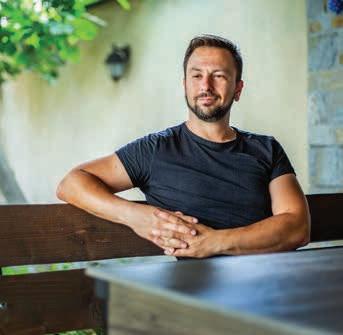

But our competitiveness is also built on working conditions that allow our workers to thrive and to focus on their job. The von der Leyen Commission promised and delivered: we now have an EU framework to improve the adequacy of minimum wages Workers should earn wages that allow for a decent living wherever they work.
As new ways of work emerge, they also come with challenges, for instance in terms of access to labour rights and social protection. This is why we proposed rules to improve the working conditions in platform work – as we committed to at the start of this Commission’s mandate. In 2021, over 500 digital platforms were active in the EU offering work to over 28 million people – most of them are self-employed but others are in fact workers.
The story of the von der Leyen Commission 34
©VihrenGeorgiev, 2023
© Adobe Stock 37
EUROPEAN ELECTIONS 2024
The story of the von der Leyen Commission
We also set out rules on pay transparency, to make the basic principle that equal work deserves equal pay a reality, no matter whether you are a woman or a man. And we introduced a Child Guarantee, so that families in need can afford childcare, and that mothers and fathers are able to both work and have a family. Europe needs all of its talent.
We also succeeded in pushing over the line a long-lasting goal: to bring more women in Europe’s corporate boardrooms. With the adoption of the ‘Women on boards’ Directive, which had been stuck for a decade, our Union has now in place a target of 40 % of non-executive directors in listed companies to be women. This is good news for women, as it breaks the glass ceiling. And it is good news for our economy, as companies that embrace diversity are more successful.

During this mandate, the Commission also put forward novel initiatives against racism and anti-semitism, but also for LGBTIQ people, individuals with disabilities, and Roma. We worked for a better Union, where Europeans of all colours, faiths, ages, genders, and sexual orientations can thrive.
 © Adobe Stock
© Adobe Stock
38 www.diplomacyandcommerce.hr
A target of 40 % of women non-executive directors in listed companies
KEY ACHIEVEMENTS
The Commission set out an Action Plan to bring the European Pillar of Social Rights to life. The Action Plan sets clear targets for the EU to reach by 2030: to reach 78 % of employment, ensure participation of 60 % of adults in yearly training, and reduce the number of people at risk of poverty or social exclusion by at least 15 million.
At the end of January 2024, President von der Leyen cohosted the Val Duchesse Social Partners Summit, bringing EU institutions and social partners together to strengthen social dialogue.
To ensure future prosperity and wellbeing in the EU, it is crucial to address the challenges brought about by the demographic transition. The Commission put forward the Demography Toolbox. The toolbox is structured around four pillars: (i) supporting parents to better reconcile family aspirations and paid work, (ii) supporting and empowering younger generations, (iii) empowering older generations and sustaining their welfare, and (iv) addressing labour shortages through managed legal migration where necessary.
EU social targets by 2030
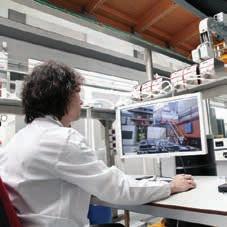
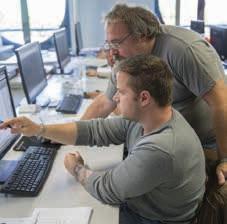
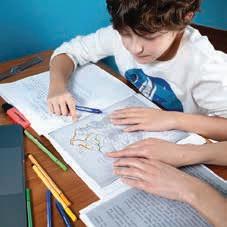
36
At least 78 % of the population aged 20 to 64 should be in employment by 2030 At least 60 % of all adults should participate in training
every year by 2030 At least 15 million fewer people at risks of poverty or social exclusion by 2030 2021 2030 2021 2030 39
EUROPEAN ELECTIONS 2024

In order to help the next generation of Europeans thrive, the Commission put forward a Recommendation establishing a European Child Guarantee, ensuring that every child at risk of poverty has access to the most basic rights while also helping parents not to have to choose between working and having a family.
Thanks to EU funding, a childcare facility in Cyprus’ industrial zone of Agios Athanasios allows young parents, in particular women, to work and provide for their family while ensuring that their children are taken care of very close to their working area.


This Commission also launched the Youth Employment Support programme, aiming to provide a bridge to jobs for the next generation. At the heart of this initiative stands the reinforced Youth Guarantee. The Youth Guarantee ensures that young people under 30 are offered a job, continued education, a traineeship, or an apprenticeship within 4 months of becoming unemployed or leaving education.
Since November 2022, we have new rules to improve the adequacy of minimum wages in countries with statutory minimum wages, establishing clear criteria for wage setting and updates. The rules also promote more collective bargaining and better enforcement and monitoring.
The Commission has also introduced ground-breaking rules on pay transparency, which will help to close the gender pay gap. The rules will help to enforce the principle of equal pay between women and men, and they will improve access to justice for victims of pay discrimination.
During this mandate, co-legislators have also agreed on new rules that will criminalise physical violence, as well as psychological, economic and sexual violence against women across the EU.
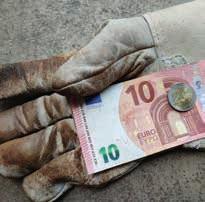
With the intention of improving health and safety at work, the Commission set out a 2021-2027 EU strategic framework on health and safety at work
We presented several proposals to limit the risks that workers face from the exposure to dangerous substances, including asbestos, lead, diisocyanates, and other carcinogens, mutagens and reprotoxic substances.
©Adobe Stock
©Adobe Stock
40 www.diplomacyandcommerce.hr
©Adobe Stock
A key element of the Pact is the fair sharing of responsibility and solidarity
New rules will clarify the criteria for granting international protection, the rights and obligations of refugees, and introduce stricter rules sanctioning unauthorised movements within the EU
Unaccompanied minors will receive immediate assistance, and Member States will ensure asylum seekers with wellfounded claims have the right to work.
To remain competitive, the European Commission proposed measures to attract the skills and talent that our economies and our societies need.
The Blue Card Directive allows highly qualified workers from non-EU countries to benefit from fast-track admission procedures to come to the EU and contribute to its economic competitiveness.
The new Single Permit Directive rules provide common rights for workers from non-EU countries, regarding working conditions, social security, recognition of qualifications, and tax benefits.

The Commission has pursued innovative Talent Partnerships with key partner countries, including Morocco, Tunisia, Egypt, Bangladesh, and Pakistan. They will allow people from those countries to come work, study, and train in the EU, developing new skills that can later benefit their countries of origin.

During this mandate, the Commission has put forward four action plans for the main migration routes: the Central Mediterranean, Western Balkans, Western Mediterranean and the Atlantic, and Eastern Mediterranean When Italy faced a sharp increase in irregular arrivals in summer 2023, President von der Leyen launched the 10-point plan for Lampedusa.
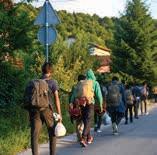
The Action Plans have yielded results. For example, in the Western Balkans, arrivals in 2023 decreased by 31 % compared to 2022
43
©Adobe
41
Stock ©Adobe Stock
With the European Media Freedom Act, the Commission laid out for the first time a set of common safeguards to protect media freedom and pluralism in Europe, including to protect editorial independence and media pluralism, and ensure the independent functioning of public service media.
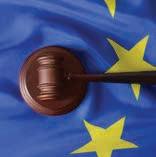

Infringement procedures are a key tool to protect the rule of law, and with its new Conditionality Mechanism the EU now has the power to withhold EU funds when rule of law breaches occur.
To effectively fight the risk of corruption, the Commission adopted, in May 2023, a package of anti-corruption measures, which includes rules criminalising corruption offences and harmonising penalties across the EU. And we now monitor developments relevant to the fight against corruption in the annual Rule of Law Report.


For the first time, the Commission has laid out common safeguards protecting media freedom and pluralism in Europe and introduced legislation protecting journalists and human rights defenders from Strategic Lawsuits against Public Participation (SLAPP)
The Commission proposed the creation of an Ethics Body covering all EU institutions which will set standards on ethics for all institutions and ensure regular coordination between them.
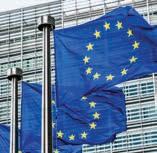
2024 42 www.diplomacyandcommerce.hr
EUROPEAN ELECTIONS
©Adobe Stock
©Adobe Stock
©Adobe Stock
©Adobe Stock
©Adobe Stock
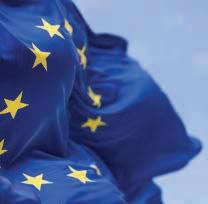
The von der Leyen Commission has pushed to complete our European family. In December 2023, the European Council greenlighted the start of accession negotiations with Ukraine and Moldova. In 2022 we started accession negotiations with Albania and North Macedonia; while Bosnia and Herzegovina, and Georgia, have been granted EU candidate status.
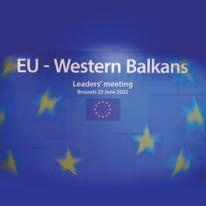
Additionally, with €6 billion in funding, the Commission’s Growth Plan for the Western Balkans will bring some of the benefits of membership in advance of accession and boost economic growth in the Western Balkans.
The Commission has put EU-US relations back on track after a period marked by disagreements. We launched the EU-US Trade and Technology Council (TTC) in 2021, which has become a privileged forum for bilateral exchanges. We have advanced the EU-US Energy Council and Dialogue, and we established a new Task Force on Energy Security. And we have coordinated closely in our joint commitment to supporting Ukraine in its war against the Russian aggression.

43 50
©
Adobe Stock
Working together as a Union
Every day since the start of the mandate, this Commission has worked to make Europe more united and stronger. At home, we have weathered together unprecedented crises.
On the world stage, our Team Europe approach has enabled the EU to be more strategic, assertive and united.
Throughout this mandate, we have seen the birth of a real geopolitical Union – supporting Ukraine, standing up to Russia’s aggression, promoting the rules-based order and investing in partnerships.
We promised to be bold and ambitious. We stayed the course and delivered.
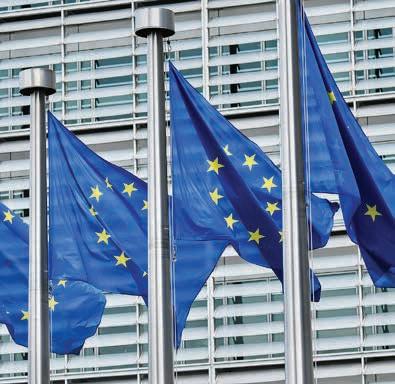
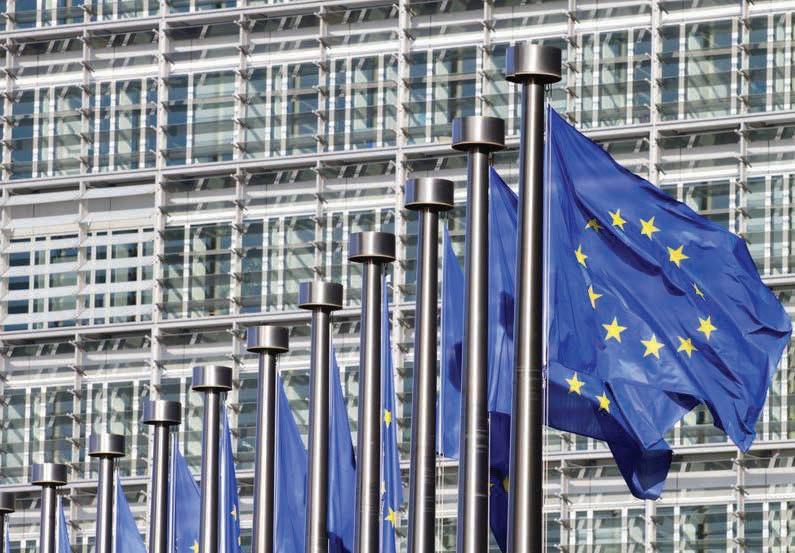
ELECTIONS 2024 44 www.diplomacyandcommerce.hr The story of the von der Leyen Commission
EUROPEAN
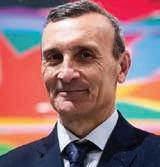
DIPLOMACY & COMMERCE PRESENTS

FOCUS ON
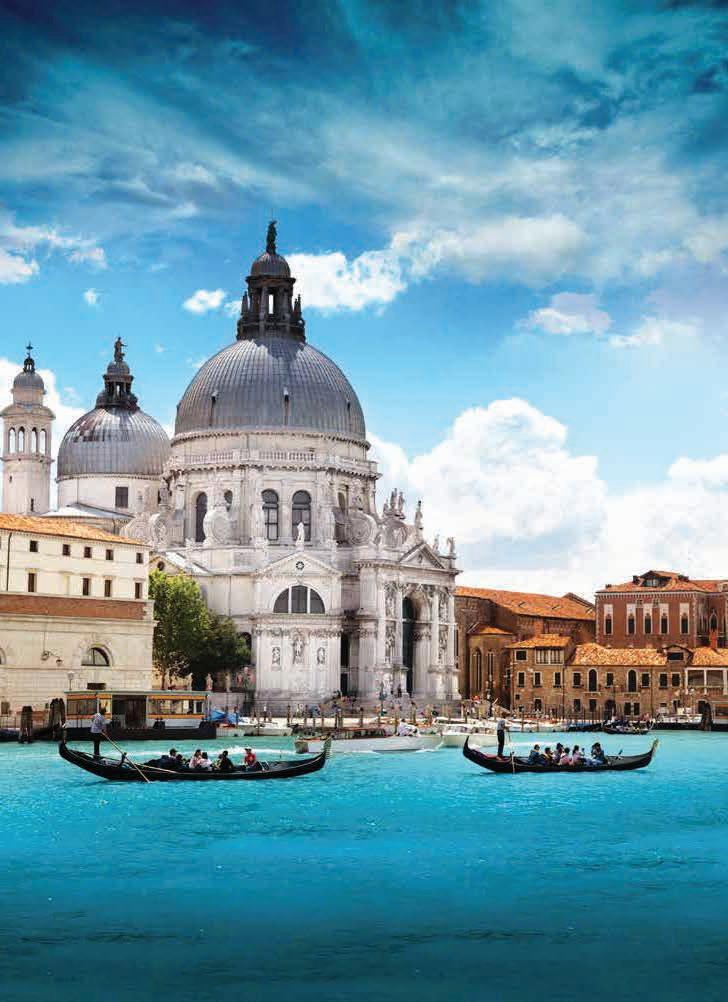
GROWING TOGETHER
H.E.
TRICHILO
Ambassador of the Republic of Italy to Croatia

ANDREA PERKOV
Director General of the ItalianCroatian Chamber of Commerce
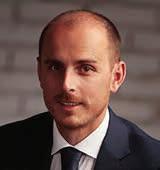
Commercial Manager Balkans at De‘Longhi Group
ITALY
ITALY AND CROTIA
PAOLO
PETER FERLUGA

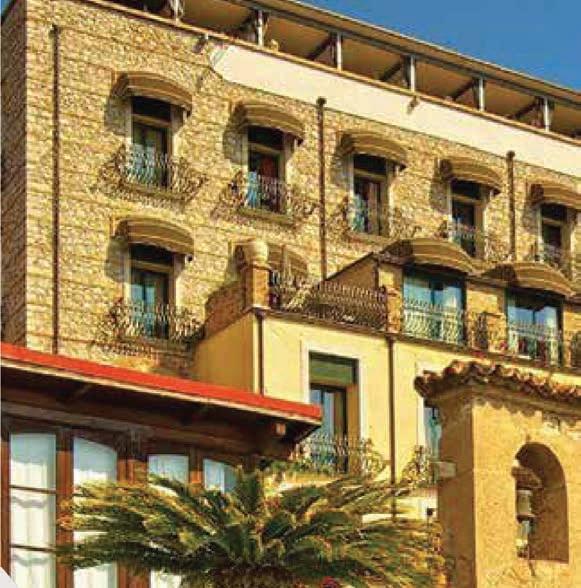
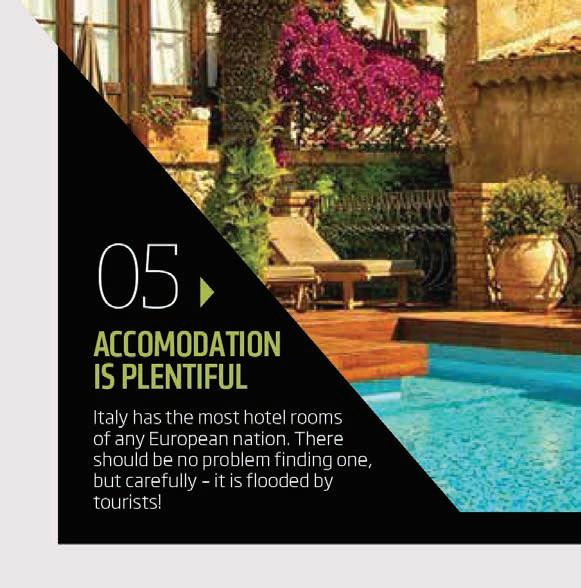


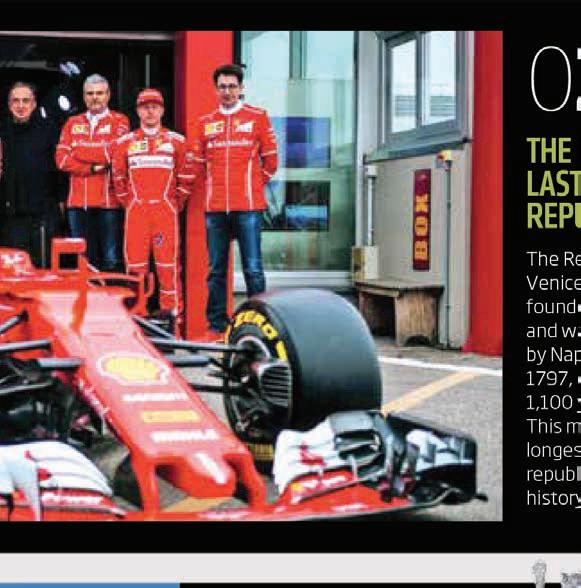

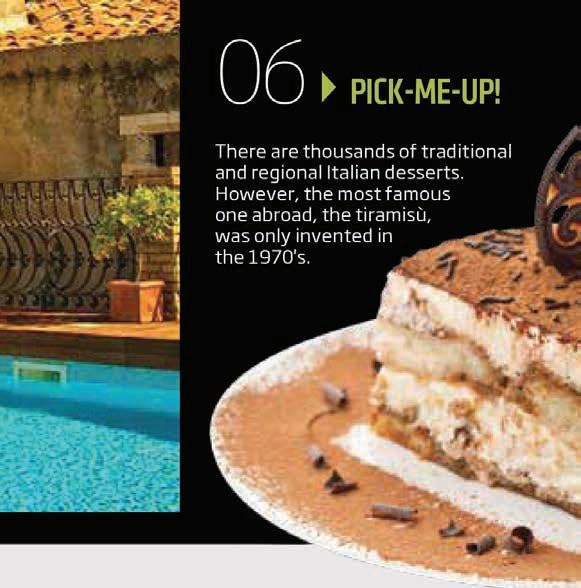





ITALY 46 www.diplomacyandcommerce.hr

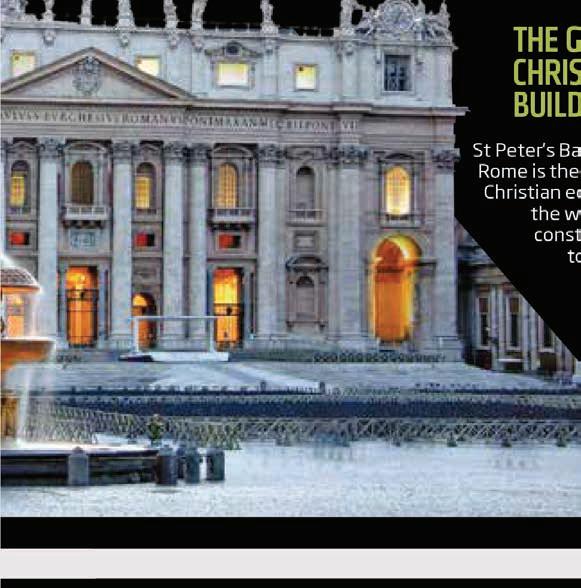
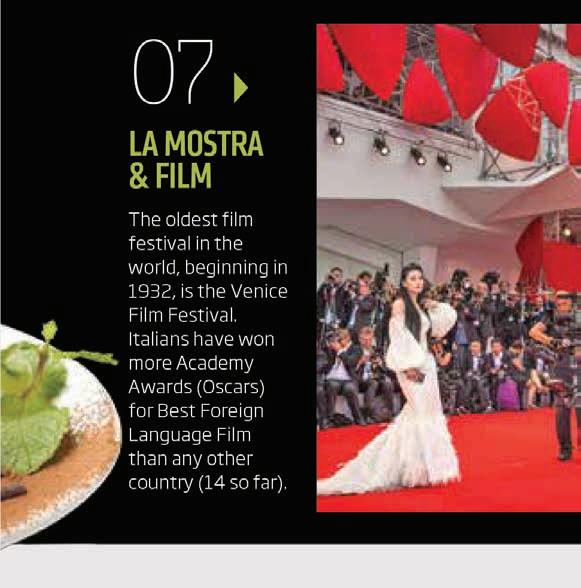
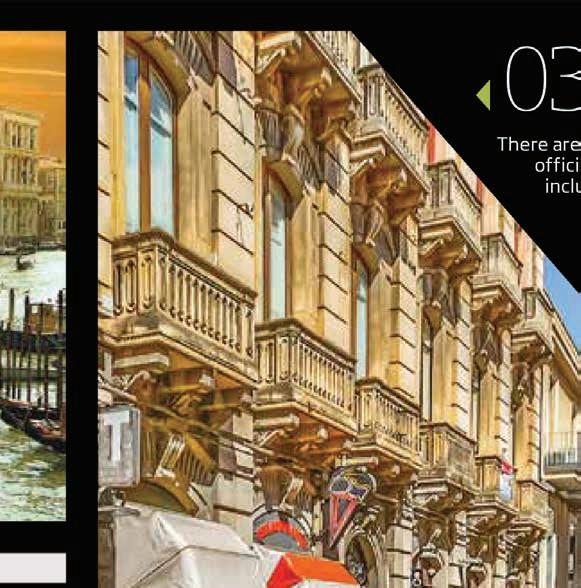
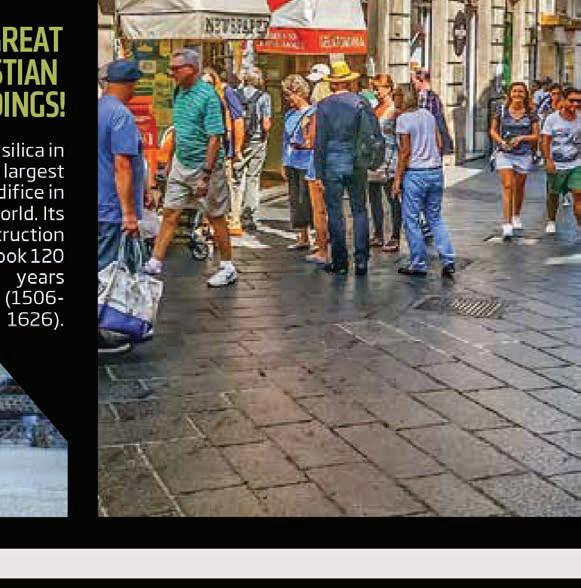
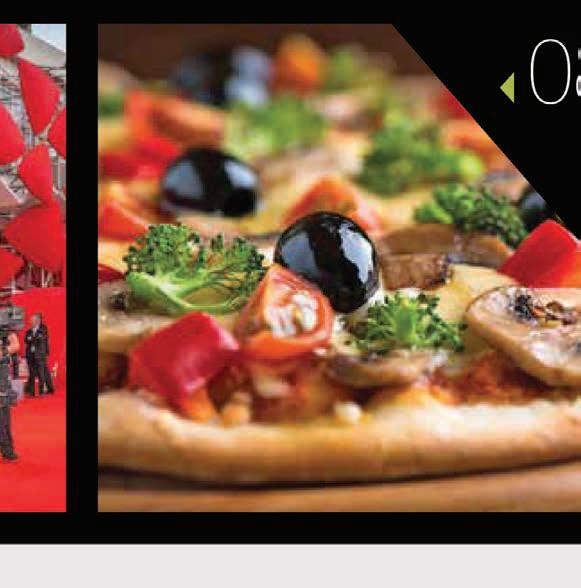

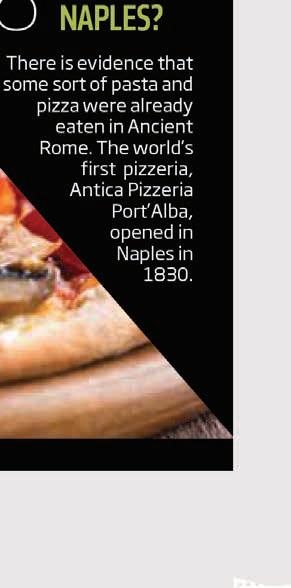


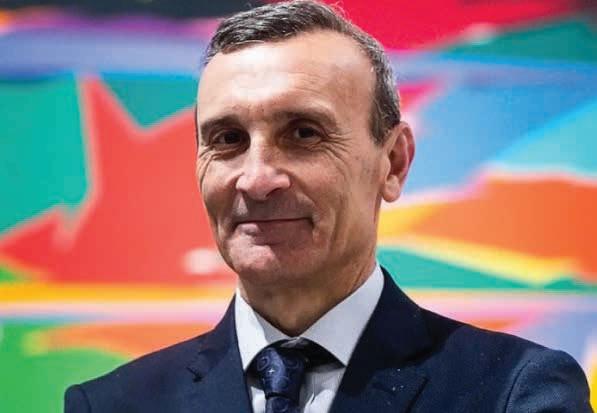
RELATIONS BETWEEN THE TWO COUNTRIES ARE EXCELLENT
It should also be underlined that they are both Mediterranean countries, so they share a signifi cant geographical, economic and cultural dimension
INTERVIEW
The newly elected ambassador of the Republic of Italy to Croatia, H.E. Paolo Trichilo , shortly after officially assuming office, gave an interview for our magazine, in which, in the Focus on Italy, he pays special attention to the details of the relationship between the two countries. We also talk about plans for the future in times that are not easy either for Europe or for everyone in the world, but also how he likes our capital and the whole country.
H.E. PAOLO TRICHILO Ambassador of the Republic of Italy to Croatia
How would you rate the relations between the two countries? Both are members of the EU, Schengen, NATO. It seems allies in all areas.
The relations between Italy and Croatia are indeed excellent. As you rightly pointed out, they are both members of the EU, Schengen and NATO, which means that they have so much in common. The importance of our relationship has been
emphasized by the visit to Zagreb of the Italian Prime Minister at the end of last year and by the even more recent meeting of the Council of Ministers, held again in the capital of Croatia, headed by the respective Foreign Ministers. Our collaboration has been reinforced also through the trilateral exercise that includes Slovenia and by the so called MED9, i.e. the nine EU members with a Med coastline.
ITALY
48 www.diplomacyandcommerce.hr
Foto FarnesinaX

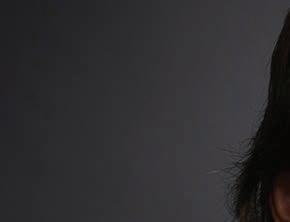






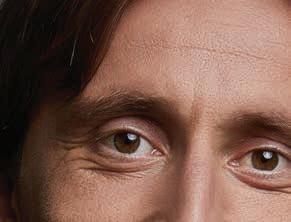
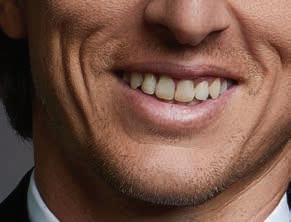






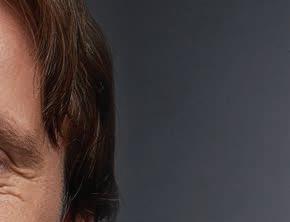

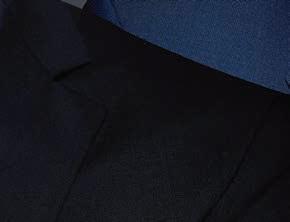




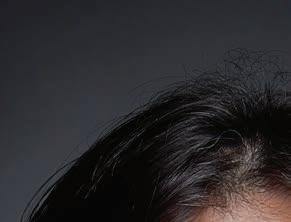
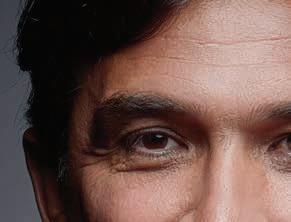
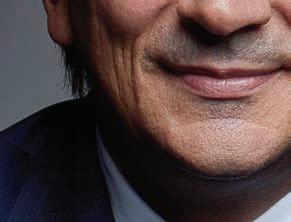




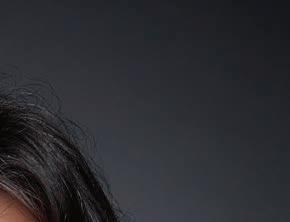
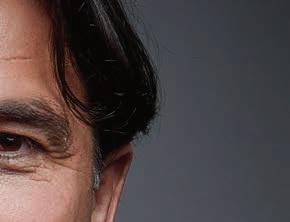
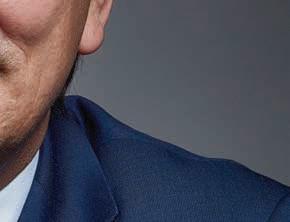







PBZ
UZ VATRENE NA SVIM TERENIMA
VJERNO
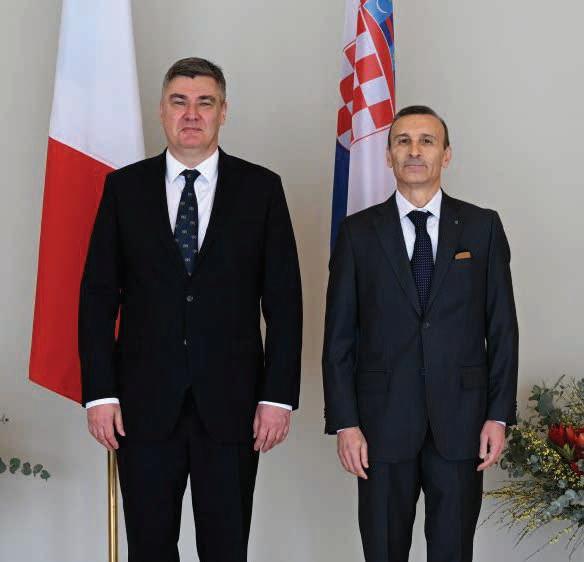
There are many areas in which the two countries cooperate, from illegal migration, regulating the sea zone, etc. Which would you single out as the most important?
Given the proximity of our two countries and the excellent level of the bilateral relations that has been reached, I would rather not single out one area of cooperation to the detriment of another. Italy and Croatia should continue to work in order to enhance all the aspects of mutual interest. I thank you for mentioning the sea zone, as in this regard I would like to emphasize the agreement reached for the delimitation of the respective Exclusive Economic Zone, that has already been ratified by both parliaments. Also in the area of illegal migration our Countries have enhanced their cooperation, particularly in the context of the abovecited Trilateral exercise with Slovenia: it has been the object of several meetings of the three Interior Ministers. We should not forget also the economic cooperation.
How do you evaluate the economic relations between the two countries? Italy invests a lot in Croatia, what do the numbers show (imports, exports, investments...)? To what extent is this process two-way and how much do Croatian companies invest in Italy?
The group of Friends of the Western Balkans has been key in encouraging a way forward for the perspectives of European integration of this region.
5th largest investor with almost 10% of FDI carried out in Croatia in 1993-2023. In the first 9 months of 2023 the Italian FDI was 160 MEURO with a growth of 31% compared to the pandemic year of 2021. Finally, according to data from the Bank of Italy, the stock of Croatian investments in Italy until December 2022 was almost 200 MEURO and Croatia recorded positive annual investments in Italy equal to 37 MEURO in 2021 and 24 in 2022.
Where do you see Europe and the EU in 10 years and what are the biggest challenges facing Europe that can threaten our values, way of life...? What are the biggest challenges? To make predictions is always a very difficult task and I cannot presume to have the crystal ball. However, I know that a strong European Union, as well as solid Transatlantic bonds are very relevant to face our present and future challenges. We need to preserve Eorope and the EU as an area of peace and prosperity for our citizens and the future generations as well.
How does official Rome view EU enlargement? In addition to the countries of the Western Balkans, there is also Ukraine and Moldova?
The economic relations between the two countries are traditionally very strong and have been further consolidated in recent years, leading Italy to be the first export and import partner for Croatia also in 2023 when the overall trade amounted to 8.52 billion euros with a market share of Italy equal to 13.67%.
In terms of Croatian imports, in 2023 Italy was the first supplier country to Croatia and the Italian exports reached 5.73 billion euro, with Italy‘s share of 14.5%. Italy was also the first destination market for Croatian exports, with a share of 12.2% and the value of exports from Croatia to Italy exceeded 2.79 billion euros. Even if the trade balance is clearly favorable for Italy, our country represents the primary destination market for Croatian products, demonstrating that this is a two-way relationship.
As to investments, thanks to its membership of the EU, its geographical proximity and the favorable business environment, numerous Italian companies and entrepreneurs have decided to invest in Croatia especially in the textile, steel, food, construction, machinery, energy, woodworking and ITC sectors. Let me stress that Italian entrepreneurship has a large impact on real economy, since it is estimated that it is responsible for the creation of around 20 thousand jobs in Croatia. Italy is the
Rome and Zagreb have been working very well together also with regard to the European agenda and the enlargement process in particular. The group of Friends of the Western Balkans has been key in encouraging a way forward for the perspectives of European integration of this region and in contributing to the development of such process, as we are convinced that this would be beneficial to the whole of Europe. Also Ukraine and Moldova deserve much attention by the EU in the current geopolitical context and progress has been made also in this respect.
You are a new resident of Zagreb. How do you like the city and have you already traveled around Croatia? What would you suggest to your friends to visit, try food, etc.?
I like very much Zagreb, also given the variety of its extension with a combination of hilly and flat areas, medieval and neoclassical architecture, museums and parks. It also seems to me that the inhabitants of Zagreb enjoy a relaxed attitude to life, like in Rome, which I consider to be a plus. In addition, Croatia boasts a great natural and cultural richness. I visited the wonderful Plitvice lakes in Easter, Rijeka to meet the Italian minority and Zadar to participate in a conference on the Blue economy. To my friends I suggest to visit the whole of Croatia from north to south and from east to west! Concerning food, as I vegetarian, I am happy I can find a lot of healthy places in Zagreb.
ITALY
50 www.diplomacyandcommerce.hr
PHOTO Office of the President of the Republic of Croatia Filip Glas
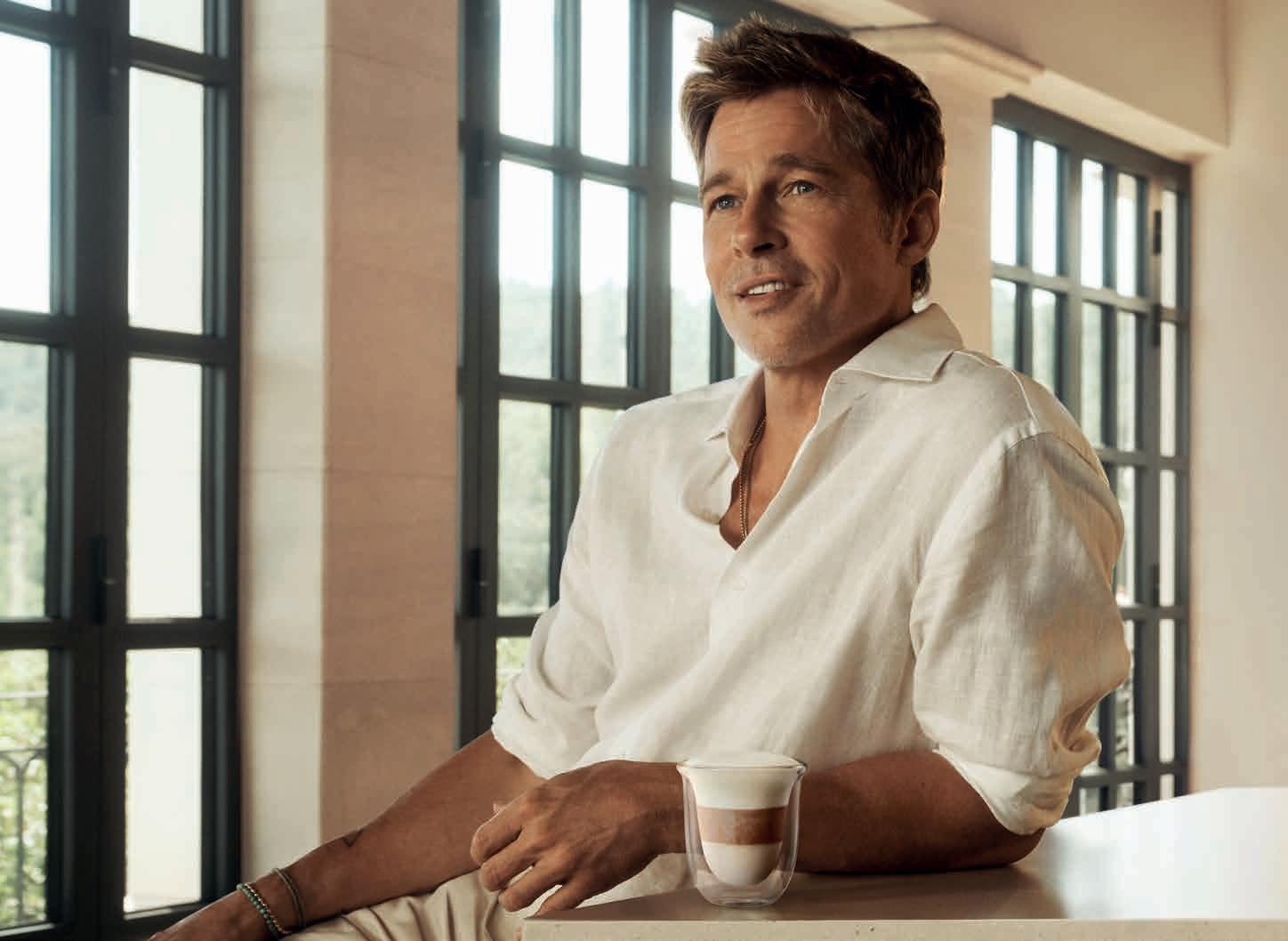
Nova Rivelia.
Promijenite svoj doživljaj kave.
De’Longhi predstavlja novi automatski aparat za kavu. Dizajniran za istraživanje svježih zrna kave pomoću inovativnog izmjenjivog spremnika za zrna kave. Sveobuhvatna. Inovativna. Revolucionarna. Rivelia.
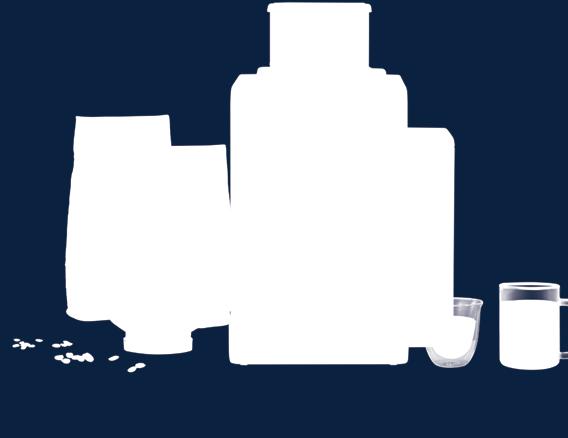

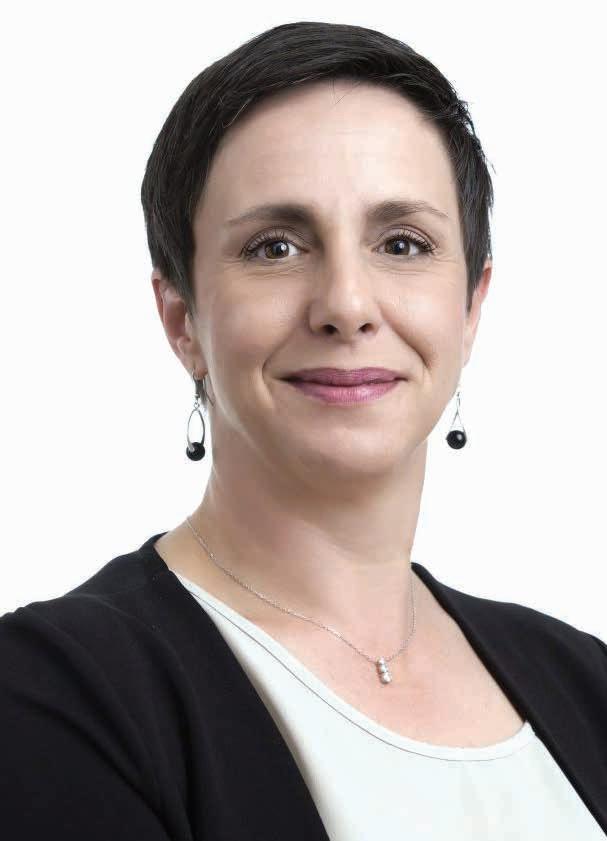
10 YEARS OF ITALIANCROATIAN CHAMBER OF COMMERCE IN CROATIA
Italy has positioned itself and remained Croatia’s number one trade partner with trade exceeding 8 billion €, and we can currently talk about investments in process worth more than 100 € million.
Our continuous support for entrepreneurship and promotion of economic opportunities has contributed to the growth of economic cooperation and prosperity of both countries, Andrea Perkov, Director General of the Italian-Croatian Chamber of Commerce, says for Diplomacy&Commerce magazine, Focus on Italy. New investments, new jobs, consolidated relations on the political and economic level are the proof and crown of our work, Mrs. Perkov added.
This year, THGK celebrated 10 years of operations in Croatia. As the director and someone who leads the team, what are you most proud of in your work and what THGK has achieved?
As the Director General of the ItalianCroatian Chamber of Commerce, I am most proud of our ability to establish strong ties between Italian and Croatian companies and promote business cooperation and knowledge exchange over the past 10 years. We are also proud of the successful organization of various events such as conferences, seminars and business meetings that contributed to the development of the business climate between Italy and Croatia.
In times of crisis, development of AI, new technologies, when energy dependence dictates devel -
ANDREA PERKOV Director General of the ItalianCroatian Chamber of Commerce INTERVIEW
The realization of longterm and sustainable partnerships between the businessmen of the two countries was
a key achievement
opment trends, where do you see a chance for Italian companies in Croatia?
In times of crisis, development of AI, new technologies and energy dependence, Italian companies have the opportunity to stand out in Croatia in several key areas. First, the development of AI and new technologies provides an opportunity to invest in innovative solutions that can improve processes in various sectors, including production, healthcare, finance and logistics. Italian companies with advanced technological knowledge and experience can provide valuable solutions and services that will stimulate the digital transformation of the Croatian economy.
Secondly, given energy dependence and the need for diversification of energy sources, Italian companies have the opportunity to engage in sectors such as renewable energy sources, energy efficiency and smart energy management systems. Italian expertise in the field of renewable energy sources can be crucial in the development of solar, wind power and other forms of renewable energy projects in Croatia.
Also, cooperation in the field of research and development of AI technologies and energy innovations between Italian and Croatian institutions and companies can result in the creation of innovative products and services with high value added.
Finally, Italian companies have the opportunity to position themselves as leaders in sectors that will shape the future of Croatian economy, providing not only technological solutions, but also strategic partnership and support in achieving the goals of sustainable development and modernization.
What are the most common problems investors and companies encounter and how do they solve them when they want to start a business in Croatia?
Investors and companies who want to start a business in Croatia often face several common problems.
In general, facing the challenges of doing business in Croatia requires a strategic approach, cooperation with local stakeholders and involvement in decision-making processes in order to improve the business environment.
The complexity of administrative procedures and long-term processes such as obtaining the necessary permits, property registration, tax obligations, bank accounts, guarantees.
We also face the still high taxes and duties which are an additional burden for investors and companies. The unpredictability of the tax system and changes in laws can also be an issue.
The problem, which is unfortunately a problem for the whole of Europe, is the lack of manpower: The lack of qualified
ITALY
52 www.diplomacyandcommerce.hr
manpower in certain sectors can limit business opportunities. Investors often face the challenge of finding professionals who meet their needs.
Insufficient infrastructure in some parts of the country can limit business opportunities, especially in sectors such as transport, energy and telecommunications, but also industry, i.e. production facilities.
In order to resolve these issues, for its companies, the Chamber provides cooperation with local lawyers, accountants and business advisors to our members to facilitate administrative procedures and provide insight into local regulations and practices.
We also help them find adequate business partners and participate actively in lobbying for improvements in the business environment, including tax system reforms, simplification of administrative procedures and infrastructure improvements.
What do the numbers say – how many new Italian companies were opened, how many people they employ, in which sectors …?
The numbers are definitely on our side despite all the obstacles we have listed. In the last two years, we have recorded a significant increase in trade and direct investments. Italy has positioned itself and remained Croatia’s number one trade partner with trade exceeding €8 billion, and we can currently talk about investments in the process worth more than €100 million. Our members - whose number is also increasing, around 140 companies, employ a total of 20,000 people, and the most interesting sectors are energy, infrastructure, tourism, AI and IT, as well as some “standard” industries, such as metallurgy and wood industry.
What are THGK’s plans for this year, which activities would you single out for our readers?
THGK has a really rich program of activities this year. We listen to the needs of our companies, follow current events and sector trends, so I would like to single out some of them that I think are interesting for Croatian companies that want to expand their business in Italy and with Italian partners.
In June of this year, we are a partner of We Make Future, one of the largest festivals of digitization, robotics and AI, which will be held in Bologna, and just to note that the festival had 60,000 visitors and more than 4,000 participants from all over the world last year. We will also be actively participating in the Kaštela Bay Regatta in Split, promoting nautical tourism and the blue economy, in October. We have dealt with the subject of ESG in accordance with the new EU regulations and we will certainly present this matter to our companies once again, and
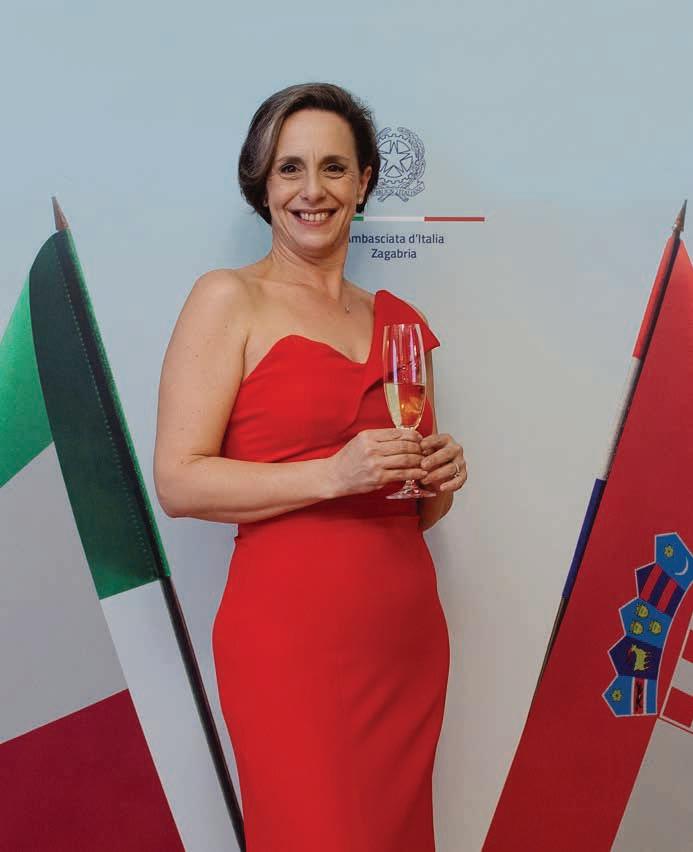
as you announced in the introduction, this year is the 10th anniversary of our work in Croatia, and in addition to the traditional Ita Cro Business Awards ceremony, we will organize a gala event worthy of the jubilee with the Made in Italy exhibition of the best from the world of design, fashion and gastronomy.
Where do you see the economies of Croatia and Italy will be in 10 years, how connected and in what way, bearing in mind the connection of the two countries, membership in the EU, but also the difference in size, development, etc.?
In June of this year, we are a partner of We Make Future, one of the largest festivals of digitization, robotics and AI, which will be held in Bologna
In 10 years, the economies of Croatia and Italy will be increasingly connected on many levels, despite the differences in size, development and other factors.
Several key areas of connection definitely include Trade exchange: The membership of Croatia and Italy in the EU enables free trade between the two countries. Trade is expected to continue to grow, with the increasing exchange of goods and services between the two countries.
Italy is already a significant investor in Croatia, and this trend is expected to continue in the future. Italian companies can invest in various sectors of the Croatian economy, providing capital, technological know-how and expertise.
Tourism is a key industry in both countries, and the connection between tourism in Croatia and Italy can be further deepened. It is expected that the flow of tourists between the two countries will grow, and cooperation in the promotion of tourist destinations can further strengthen this area.
Knowledge and technology are definitely key. Italian expertise in areas such as technology, innovation and artificial intelligence can be of great benefit to Croatia. The cooperation between research institutions, universities and companies is expected to develop further in these areas.
Energy cooperation: Given the need to diversify energy sources and strengthen energy security, cooperation between Croatia and Italy in the field of energy is expected to be increasingly important, especially in the development of joint projects of renewable energy sources and joint initiatives to reduce greenhouse gas emissions.
In summary, although there are differences in the size and development of the economies of Croatia and Italy, their connection will probably continue to deepen in the next decade, whereby both countries will ben efit from cooperation in various areas, within the framework of EU membership and recognition of mutual comparative advantages.
53
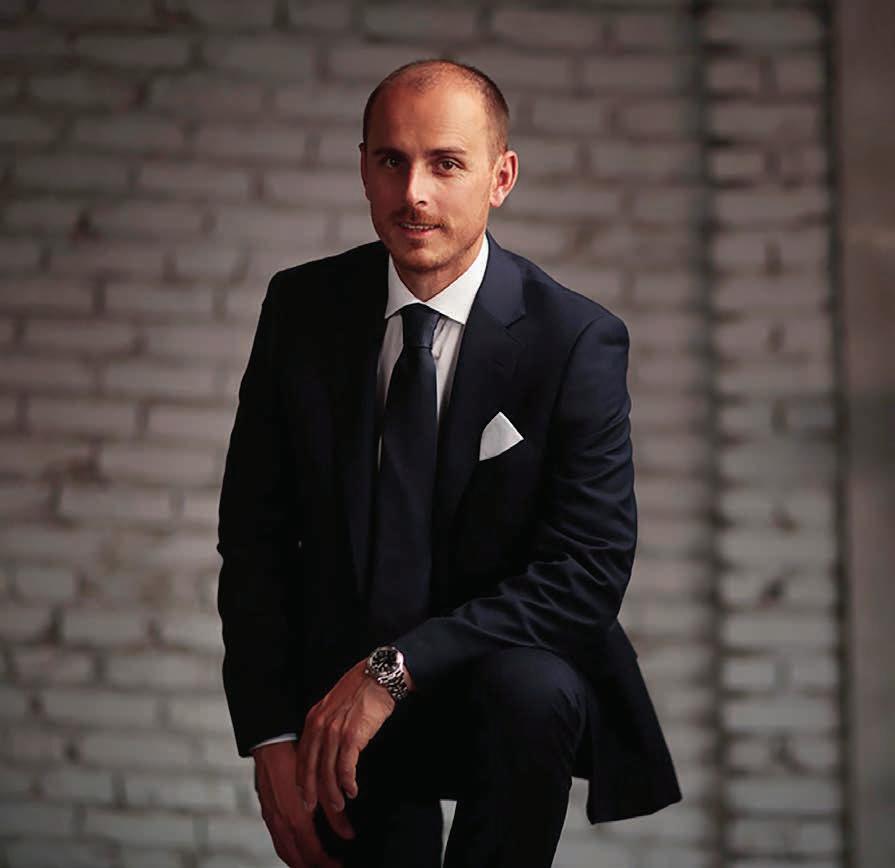
WE DESIGN PRODUCTS AND EXPERIENCES
Combining quality, design, and tradition in small domestic appliances it‘s definitely a big challenge
Croatian consumers have shown a growing interest in products that offer high quality and superior design and become increasingly discerning in their preferences, they actively seek out products that offer not only reliable performance but also contribute to the visual appeal of their living spaces, for Diplomacy&Commerce, Focus on Italy, says Peter Ferluga, Commercial Manager Balkans at De‘Longhi Group. The appreciation for such products reflects a broader global trend where consumers
PETER FERLUGA Commercial Manager Balkans at De‘Longhi Group
increasingly prioritize both functionality and aesthetics in their purchases, says Mr. Ferluga.
The De‘ Longhi Group is one of the world‘s leading players in small domestic appliances associated with the world of coffee, the kitchen, air conditioning and home care. How challenging is it to combine quality, design, tradition in one?
Each aspect brings its own unique considerations and demands attention
to detail. Quality is paramount because customers expect appliances to perform reliably and efficiently. This requires rigorous testing, sourcing premium materials, and maintaining high manufacturing standards. We design products and experiences. Design complements quality by enhancing functionality and aesthetics. It‘s about creating products that not only excel in performance but also add visual appeal to any home environment. Balancing tradition with innovation is key; respecting heritage while embracing modern advancements. Ultimately, it‘s about understanding the needs and preferences of consumers while staying true to the brand‘s identity
How much did the crisis and inflation affect business? What do the specific numbers say? How do you rate the competition on the market? In every crisis and period of inflation, it‘s crucial to remain vigilant and identify potential opportunities. While consumption patterns may shift, people‘s inherent need to spend wisely persists. This is where we must excel, distinguishing ourselves from competitors and enticing consumers to choose our products. Healthy competition in the market serves as motivation, propelling us to surpass barriers and strive for excellence
In your opinion, what are the business conditions in Croatia? What should be fixed, and what would you praise?
Since Croatia joined the Schengen area and adopted the Euro, there has been a noticeable upswing in the country‘s economy. It‘s become far more dynamic compared to previous years. Undoubtedly, Croatia‘s economy is closely tied to tourism, and we‘ve witnessed significant growth in this sector in recent times. However, I believe it‘s crucial for Croatia to diversify its economic base. While tourism is essential, it shouldn‘t be the sole focus. Attracting foreign investments and placing greater emphasis on production industries, rather than solely relying on services, can provide a more balanced and resilient economy in the long term.
As a regional company, what differences in business and what similarities would you single out in the countries you cover?
Each country possesses its own unique characteristics. As the overseer
ITALY
INTERVIEW/CORPORATE
54 www.diplomacyandcommerce.hr

of operations in 10 diverse countries, I find myself fully immersed in the rich mosaic of their habits, languages, and consumer preferences. With the gradual increase in economic prosperity across these regions, there‘s a noticeable surge in demand for premium products.Take coffee, for instance; the market maturity varies significantly from one place to another, necessitating tailored approaches for each one.
Our primary focus remains on educating consumers about the merits of our coffee machines. Consider the cost-effectiveness: brewing an espresso at home using our machines significantly reduces expenses compared to buying one at a café. Moreover, with proper maintenance, the quality of coffee delivered by our fully automated machines remains consistently high.
Across all markets, there‘s a prevalent culture of coffee consumption in the café. This presents an excellent opportunity for us to underscore the advantages of enjoying coffee at home, particularly given the anticipated rise in caffee prices in the future. By seizing this opportunity, we not only meet current preferences but also anticipate and address future trends in consumer behavior, ensuring our continued relevance and success in the market.
Our new products combine the latest technology with beautiful design and easy-to-use features
What is DeLongi Croatia preparing for us in the coming period?
In the upcoming months, we‘re preparing to luch a lot of new products that enforce our commitment to excellence. Our new products combine the latest technology with beautiful design and easy-to-use features.
Our upcoming products, ranging from sleek kitchen appliances to advanced coffee machines, are crafted to enhance your daily life. Whether you love coffee, cooking, or simply appreciate quality, our new lineup has something for everyone. Stay tuned for updates as we prepare to launch these innovative additions to our collection.
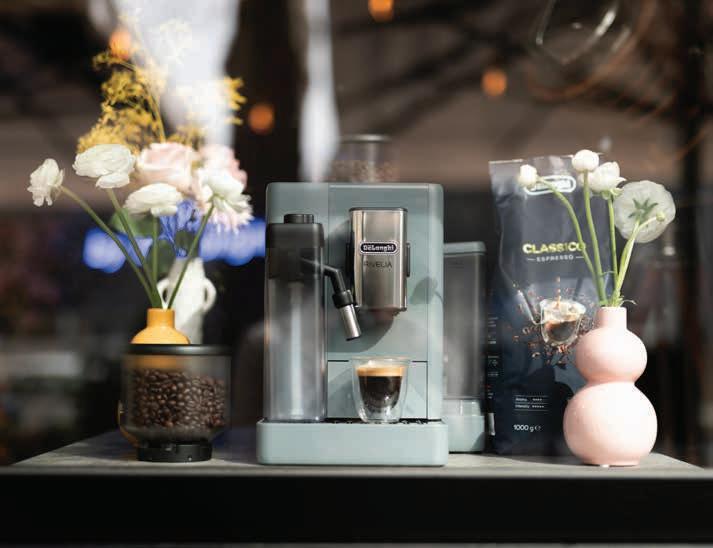
55
PETER FERLUGA Commercial Manager Balkans at De'Longhi Group, Nataša Bagić Marketing Director and Tea Kozulić, MBA
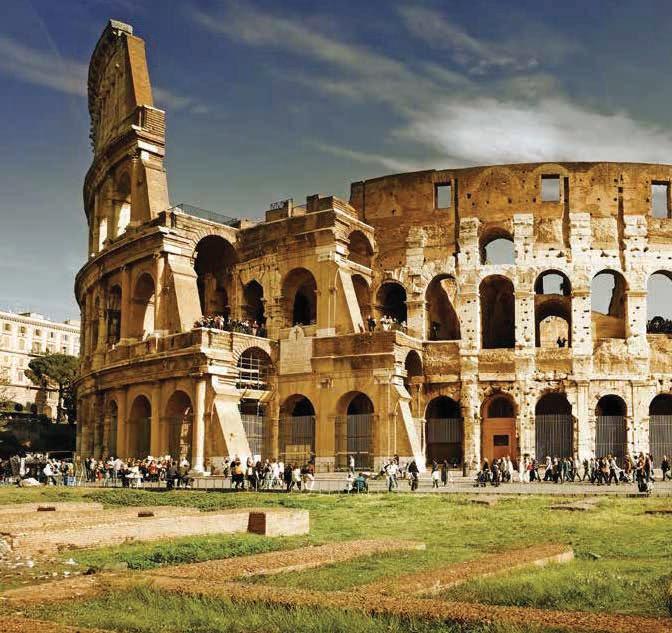
THE HIDDEN GEMS OF ITALY
Escaping Reality in Italy's most Alluring Holiday Sites
F rom famous attraction like Rome’s Colosseum to visiting Romeo and Juliet’s balcony in Verona, Italian tourism offers a wide range of experiences. The perfect combination of history, culture and food
make this country the top holiday destination. Luckily, we have discovered yet another list of stunning, must-go-to locations in the nation of great cuisine and high fashion, which will take your breath away.
CINQUE TERRE
The place that is increasingly being talked about on Facebook is a complex of five towns on the coast of the Ligurian Sea, in the eponymous province of Liguria. If you are doubtful why is Liguria so
ITALY
TOURISM
56 www.diplomacyandcommerce.hr
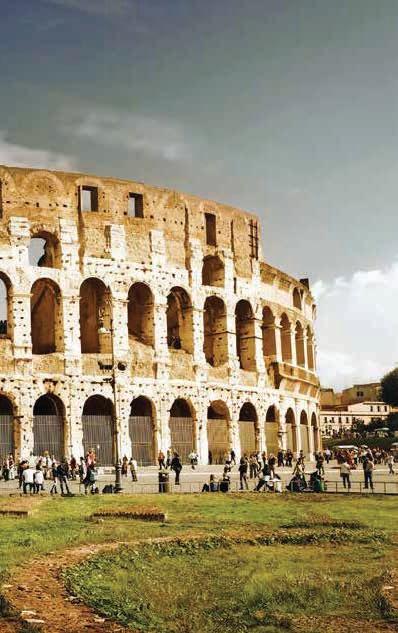
MOST DENSELY
FAMILY IS IMPORTANT IN SICILY, AS YOU ALREADY KNOW, AND THIS REGION IS ALSO THE LARGEST AND THE MOST DENSELY POPULATED ISLAND IN THE MEDITERRANEAN
It is difficult to say what is the most beautiful part of italy, but the combination of the climate, cities, beaches and monuments in sicily is simply spectacular
green in the middle for summer when, for instance, the greenery in Montenegro or Greece is drying up, this is because Liguria is the place where the Alpine and Mediterranean air collides resulting in a lot of rain. All of this can spoil your enjoyment, but not too much, since these five small towns, sitting on steep cliffs with colorful houses, are perfect for taking pictures! They are called, in geographical order, Monterosso al Mare, Vernazza, Corniglia, Manarola, and Riomaggiore, and together they are under the UNESCO protection and make the Cinque Terre National Park. If you are not caught up in the rainy weather, the climate here is ideal, but given the steep shores, the beaches are rather short and not really fit for long sunbathing. Regardless, Cinque Terre will take your breath away!
SARDINIA
Sardinia is a large Italian island in the Mediterranean Sea, which has almost 2,000km of coastline, pebble beaches and mountainous land that are criss-crossed by trekking paths. Its robust areas are decorated with thousands of nuraghes - mysterious stone ruins from the Bronze Age which resemble beehives. One of the greatest and the oldest nuraghes is Su Nuraxi in Barumini, from 1.500 BC. Here, ancient civilizations such as Greek or Romean did not have much influence, but there are Phoenician and Roman colonies, such as Taros. Since low-cost carriers now fly to our country too, you can catch a flight to Alghero in Sardinia via Memmingen, and visit one of the westernmost points in Italy, where, believe it or not, Catalan is spoken. It is a place of wild beauty, the place where you go if you want to be alone to enjoy the long beaches without many people around. Traditionally, this is the place that wealthy tourists frequent. It is populated by people who speak a very archaic language that resembles the Latin the most out of all the Romanesque languages. They have archaic customs, including making bizarrelooking cheese with live worms, and various other, lesser extreme special-
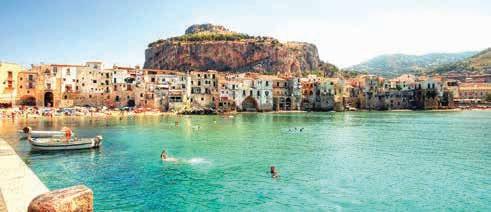
57
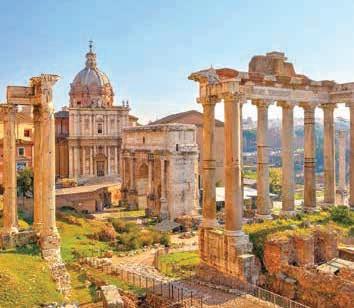
ties. The old town of Cagliari will surely impress you with its Italian, albeit somewhat exotic mysticism and breeziness, coupled with the strong pride of the Sardinians who have remained a deeply tribal society for centuries.
SICILY
Family is important in Sicily, as you already know, and this region is also the largest and the most densely populated island in the Mediterranean, as well as Italy's southernmost big island. Here, you can almost reach Africa while the Sicilian culture is a mixture of Latin, Norman, Greek and Arabic. Siciliy almost ended up like Malta, and its inhabitants almost adopted the Semitic Arabic language (Siculo- Arabic spoken a few centuries ago). In many respects, the Sicilians were closer to the Byzantines and Greeks than to Italians. Al-
Sardinia is a place of wild beauty, the place where you go if you want to be alone to enjoy the long beaches without many people around
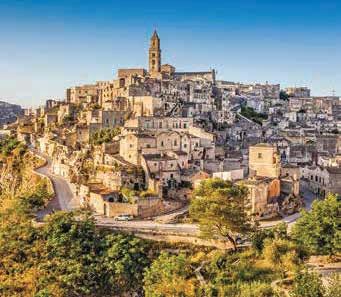
though, during the rule of Augustus, he tried to introduce the Latin language, Sicily has remained Greek in ancient times in the cultural sense. Still, when this island, which can be reached via the once exotic Trapani low-cost or, the "classic" Palermo, relies on all its natural beauty, tourism and fascinating architecture. Part of it is deeply rooted in the tradition of Greater Greece (Magna Graecia) and it was inhabited by Greek philosophers, where Archimedes tested his scientific theories. Here, the talented Mr. Ripley met with his destiny in the imaginary town of Mongibello. Today's tourists are happy to see Taormina and Giardini Naxos, which sound Greek even 2,000 years later. It is difficult to say what is the most beautiful part of Italy, but the combination of the climate, cities, beaches and monuments in Sicily is simply spectacular.
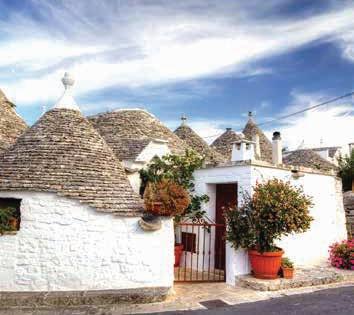
CALABRIA, PUGLIA AND BASILICATA
Tourism aficionados say that the most beautiful beach in Italy is in Calabria, in the town of Praia a Mar to be more precise, and that Calabria itself is a worthy successor of the Amalfi Coast, which is perhaps the most famous coastline in the entire Mediterranean. Those who love dry and disguised locations will usually choose Basilicata where the films like "The Passion of the Christ" was made, and where it feels as if time is standing still on its mountains and the beaches. Then there is Puglia, with the towns of Bari and Sannicola, with trullis (small huts) in Alberobello, and the oktagonal castle of Castel del Monte, where Umberto Eco set the story of his "The Name of the Rose", and towns like Ostuni which resembles Tunisia so much, which is, after all, just around the corner.
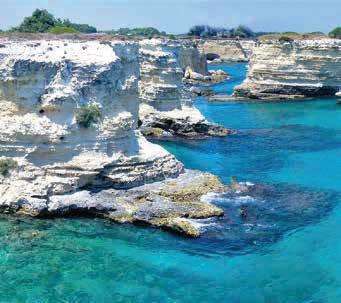
ITALY
58 www.diplomacyandcommerce.hr
ZEPTER HYPERLIGHT EYEWEAR world famous innovative technology
The trends in the world of fashion accessories are very clear - we want our accessories to be smart, i.e. innovative, hybrids of aesthetics and technology of the new age.
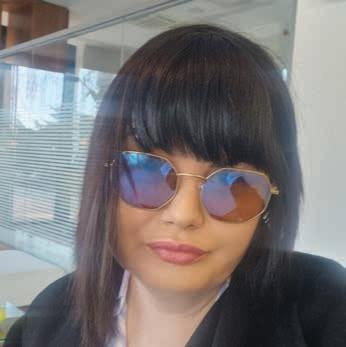
This trend has become part of everyday life, and some of the top elements are glasses, a fashion accessory that offers a range of health benefits. Zepter Hyperlight Eyewear are definitely among the most sought after worldwide.
Quantum HyperLight Optic lenses with unique characteristics and superior quality are made with Swiss technology and are much more than ordinary lenses: they are designed for your better health, better cognitive abilities, better appearance. That is how they contribute to the mission: feel better, live better.
Quantum Hyperlight is created with the passage of any light through the Quantum HyperLight Optic lens, it has a positive effect on vision and brain functioning, which contributes to the general improvement of physical and mental health, and thus to the optimal functioning of the body.
- This is due to the hyper light optics through which the light passes and turns into a hyper harmonized light complex called Quantum Hyperlight. The optics are coated with layers of Fullerene C60. Scientists Harry Kroto, Richard Smalley and Robert Curl are responsible for the discovery of Fullerene, for which they received the Nobel Prize in 1996.
HyperLight glasses are an innovative and stylish solution for better functioning of vision and brain, because they block harmful radiation, simultaneously transforming it into a desirable, optimal spectrum of Quantum HyperLight with uniquely ideal symmetry, identical to biological structures.
CORPORATE
KATA PAVLOVIĆ director of Zepter Croatia
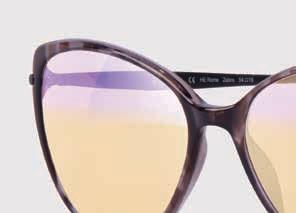
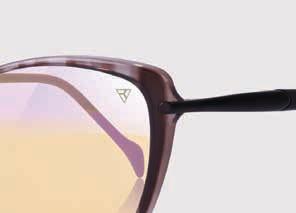


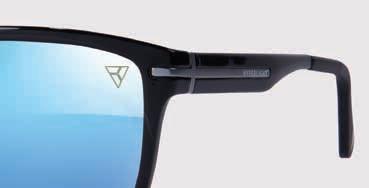
The famous Zepter Company is proud of its innovationHyperLight Eyewear, which protects against the harmful rays of all artificial lighting, sunlight and light from electronic devices. This technological breakthrough changed the world of eyewear forever.
- We have developed a method we use to transform these types of light into light that is beneficial for your body. The Hyperlight Eyewear are made using our patented technology as a replacement for sunglasses, as they block UV and highenergy visible light. At the same time, they have a relaxing effect, improve concentration and protect against the harmful effects of blue light emitted by LCD or LED screens - said Kata Pavlović, Director of Zepter Croatia.
CHARACTERISTICS OF HYPERLIGHT EYEWEAR:
• Transforms UV and high energy blue light into green, yellow, orange and red visible light spectrums;
• Transforms Blue LED light into eye comfortable light (resulting in relaxation). When transformed, UV and high energy blue light are optimized according to the natural sensitivity of the eyes;
• Enables sharper vision;
• Optimizes brain function (harmonizes EEG signals);
• Regulates neuroendocrinology actions; increases serotonin and regulates the serotonin/melatonin ratio (which decreases depression and insomnia);
• Influences the body clock – circadian rhythm (regulates blood pressure and temperature)
HYPERLIGHT EYEWEAR IS EQUIPPED WITH HIGH QUALITY COATINGS: PROTECTIVE LAYER ON BOTH SIDES OF THE GLASS.
• Hydro and oleophobic coating provides resistance to scratches and prolongs the lifespan of the lens. It is easy to clean and has an antistatic component that repels dust particles on both sides of the lens.
• Patented 8 layers of ion coating. In accordance with the Ioncoat K+ procedure, eight layers of material with different index levels are applied to the lenses in a vacuum. Ioncoat K+ reduces light reflex to less than 1%, resulting in better vision.
• The Hard Coat (HC) layer is combined with the antireflection process and the superhydrophobic layer, it prolongs the life span of the antireflection layer and provides additional protection against scratches.
• Fullerene Layer on both sides of the lens
• CR 39 lens
59

Explore the Dalmatian Coast with Valamar this Summer
Croatia is known for its vibrant cities, rich culture and relaxing atmosphere but out of the country’s 3,600 miles stretch of coastline, it’s the Dalmatian coast which truly catches the eye of tourists worldwide.
Year on year, more visitors are flocking to the southernmost part of the country to explore its remote islands, turquoise waters and stunning scenery, as consumers seek affordable alternatives to the usual European hot spots this summer.
The Dalmatian coast stretches from Rab Island, in the north, to the southern small peninsula Prevlaka, providing an abundant of opportunities for visitors to explore all that Croatia has to offer. Those visiting can embark on an enchanting road trip stopping off at some of the destinations most sought after spots, from the historical artifacts in Old Town Dubrovnik to hiking through the forests and vineyards of Korčula or sailing around the island of Hvar – there’s something for everyone to enjoy.
With historical cities enriched in culture and waterfront resorts offering laidback luxury and breathtaking scenery, the Dalmatian coast is an oasis waiting to be discovered this summer.
The Dubrovnik President Valamar Collection Hotel, 5*
This exquisite 5-star hotel provides guests with superior service, exceptional food, rejuvenating spa facilities and so much more.

Dubrovnik President Valamar Collection Hotel offers a phenomenal luxury retreat in one of Croatia’s most famous destinations.
Whether you begin or end your trip in Dubrovnik, the Dubrovnik President Valamar Collection Hotel is just a short drive from the historic and culturally rich city, where guests can stroll through the cobbled streets of Old Town or embark on a sunset cruise around the Elafiti Islands.
There are a range of accommodation options on offer, from Rooms for 2 with queen size beds and balconies to the V Level Presidential Suite, which comes with its very own jacuzzi for those who want to indulge and celebrate throughout the trip.
With its beachfront location on the tip of the green Babin Kuk Pen-
Valamar Amicor Green Resort
60 www.diplomacyandcommerce.hr TRAVEL
Valamar Argosy Hotel
insula, its spectacular views and 5-star service provide guests with an unparalleled feeling of luxury and serenity.
VALAMAR METEOR HOTEL 4*, MAKARSKA
With breathtaking views of Mount Biokovo and its close proximity to the town centre, the Valamar Meteor Hotel stands out as an ideal destination to explore. Each room features a contemporary and stylish design, providing guests with a variety of options, including classic family rooms, junior suites, and superior family suites with a terrace and sea view.
To ensure children are entertained and content throughout their stay, the hotel boasts an impressive kids’ pool and a spacious MARO play area. The play area includes a soft play zone, Maro theater, and the ‘Chill & Play’ zone, serving as a perfect gathering spot for families with games such as table football and board games. For parents that want to enjoy some relaxation time, guests can take a refreshing dip in the infinity pool outdoors. Additionally, those looking to enhance their well-being can visit the Sun & Spa wellness centre, offering a wide range of treatments.
For dining experiences, guests are invited to indulge in delectable Dalmatian and Mediterranean cuisine, as well as sample wines from the local regions at the Mediterraneo restaurant, which offers a buffet-style service.
Guests seeking an active getaway can make use of the hotel gym, engage in basketball or tennis, or even rent a bike to explore the sce-
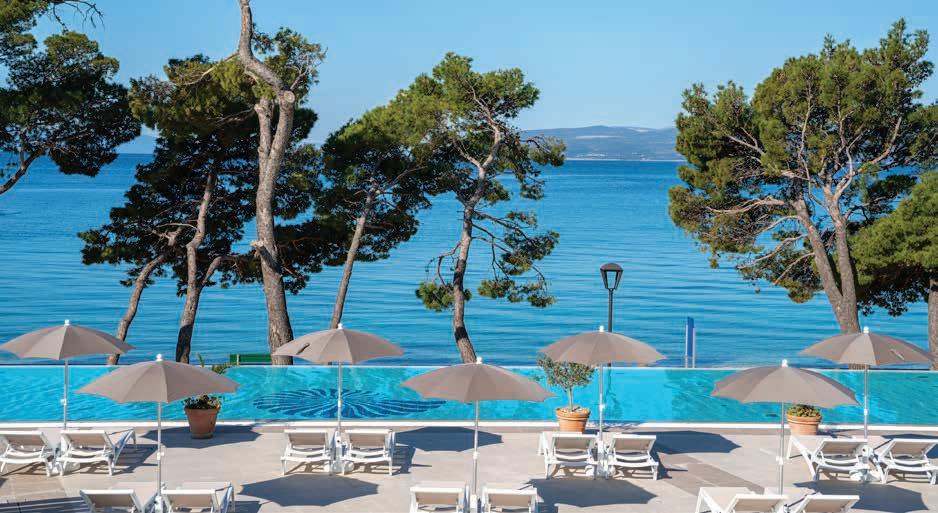
THE ELEGANT AND REFINED VALAMAR METEOR HOTEL IS AN IDEAL CHOICE FOR FAMILIES TO STOP OFF AND DISCOVER THE LESSER-KNOWN MAKARSKA RIVIERA.
nic beauty of the surrounding area. Furthermore, apart from the hotel’s amenities, guests can discover a variety of thrilling adventures nearby, including white water rafting and the renowned Skywalk at Mount Biokovo
VALAMAR ARGOSY HOTEL 4*, DUBROVNIK
Valamar Argosy Hotel is an oasis for those looking to visit an idyllic location with loved ones. Located on Dubrovnik’s beautiful Babin Kuk
peninsula, just a few minutes from the cities historical Old Town, the hotel has been designed with the enjoyment of adults in mind making it the perfect place for rejuvenation.
For a low-key and relaxing trip, guests can take to the freshwater infinity pool and enjoy stunning views of the Elafiti Islands. The Spa Zone offers a sanctuary of relaxation to guests complete with bio sauna, Finnish sauna, vitality bar and Kneipp foot bath. In addition, the Balance Mediterranean Spa pro-
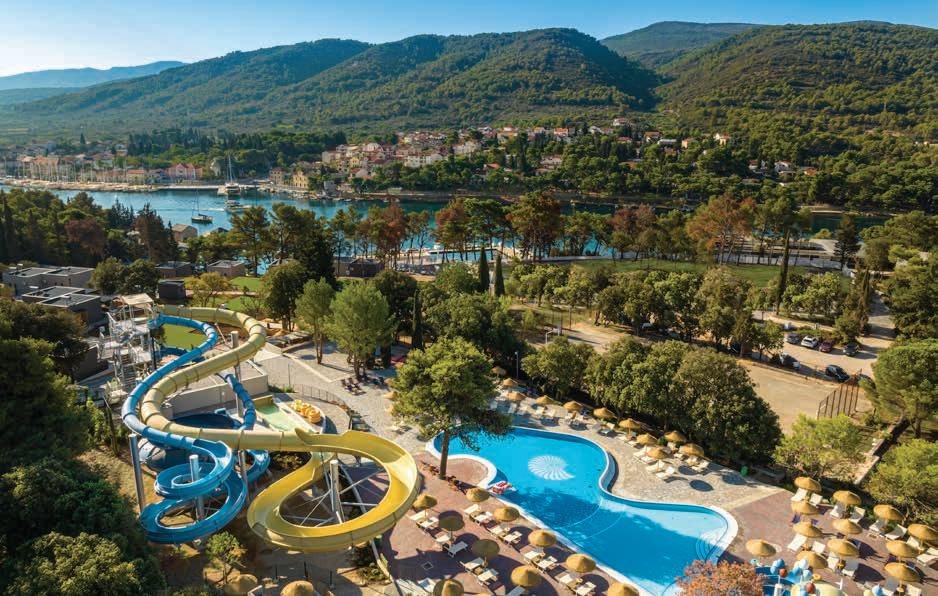
vides facial and body treatments to provide the ultimate relaxation.
During the evenings, guests can savour the taste of delicious local and international specialties, which have been perfectly matched with the array of excellent wines available at the Mediterraneo restaurant. The outdoor Oliva Grill restaurant at Valamar Argosy Hotel offers enchanting views of the sunset, making the dining experience a truly magical memory.
VALAMAR AMICOR GREEN RESORT 4*, HVAR
Situated north of Hvar, a stone’s throw away from the historic centre of Stari Grad, Valamar Amicor Green Resort was the first family resort on the Croatian Adriatic built according to principles of sustainable development and for families embarking on a journey along the Dalmatian coast this summer, it’s well worth the visit.
Keeping a happy equilibrium with the surrounding flora and fauna and favouring renewable energy sources, as well as locally sourced produce, Amicor Green Resort seeks to minimise its carbon footprint, whilst maximising guest experience.
Offering a range of beautiful accommodation options, including family villas and suites, with decor that echoes the local natural beauty, Valamar Amicor Green Resort makes an ideal family destination for those who want to hop on over to Hvar.
From the MARO Eco-Playroom to the creative ecology workshops and the hotel’s own fruit and vegetable garden, through interactive play, young guests can discover how to care for the environment.
Formoreinformationand tobookvisitwww.valamar.com
Valamar Amicor Green Resort
61 TRAVEL
Valamar Meteor Hotel
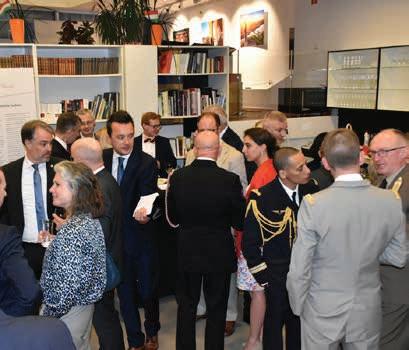
12
APR
EMBASSIES OF THE VISEGRAD GROUP COUNTRIES – CZECHIA, HUNGARY, POLAND AND SLOVAKIA
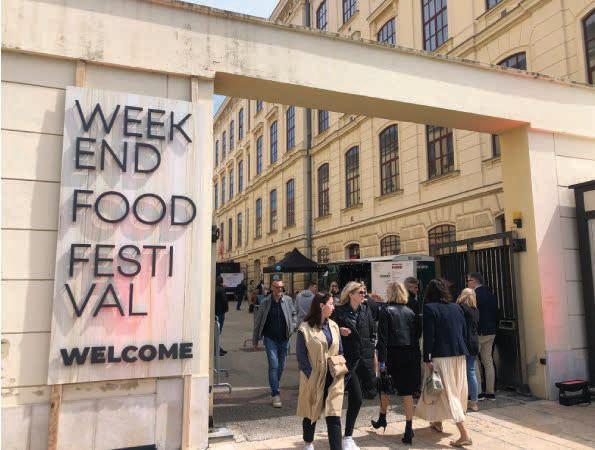
19
APR
TTHE 3RD WEEKEND FOOD FESTIVAL IN ROVINJ HAS ENDED
he Weekend Food Festival brings together the best that Croatia and the region have to offerand promotes world excellence. A unique gastronomic event – the third Weekend Food Festival – has ended in the old Tobacco Factory in Rovinj. The region that leads trends and culinary innovations, while at the same time preserving tradition and indigenous flavours, has once again gathered top chefs, the most famous culinary talents, but also

APR 20 LAUBA, ZAGREB, THE PINK DAY FESTIVAL CELEBRATED ITS 10TH ANNIVERSARY WITH A CELEBRATION OF WINE AND ART
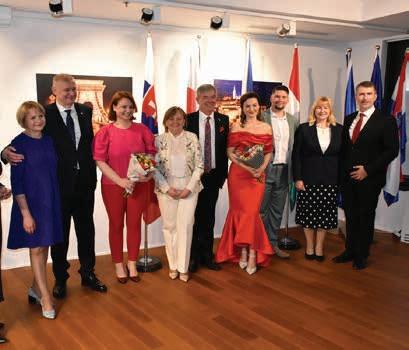
Visegrad Group countries’ concert marking NATO membership anniversaries – celebrated the anniversaries of their joining the North Atlantic Treaty Organization as well as the 75th anniversary of the NATO´s founding by a unique concert of classical music, in the Hungarian Cultural Centre in Zagreb.After the welcome speeches of Ambassadors

young hopefuls and representatives of the gastronomy and catering industry, who will highlight the importance of gastro and eno scene during two days through a comprehensive program scene through panel discussions, lectures, show cooking workshops and masterclasses. This year’s edition also brings novelties, such as the Weekend Food Market, which offers all visitors a diverse gastronomic offer ranging from local to international specialties.
A unique gastronomic event – the third Weekend Food Festival – has ended in the old Tobacco Factory in Rovinj. The region that leads trends and culinary innovations, while

This boutique festival attracted many wine and art lovers, and the top rosé wines stood out in particular. All exhibition tables were filled a month in advance, and among them were wines from Croatia, Italy, France, Slovenia, Serbia and a record number of winemakers from Hungary. This year, the festival marked the 10th anniversary of its “Green in Pink” program. The festival gathered
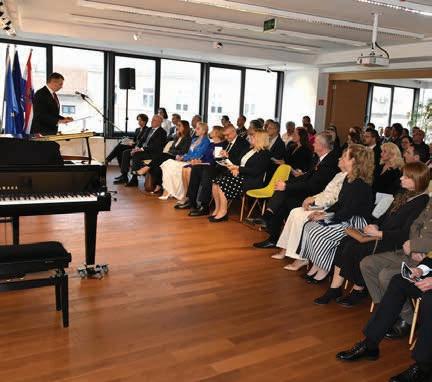
Milan Hovorka (CZ), Csaba Demcsák (HU), Pawel Czerwinski (PL) and Hana Kováčová (SK), in the course of the concert compositions and opera arias of composers from the V4 countries – among others Antonín Dvorák, Eugen Suchon, Frédéric Chopin and Ferenc Liszt – were performed by great opera singers Jirí Rajniš (CZ), Tatiana Hajzušová (SK) and pianist Adriana Magdovski (PL).
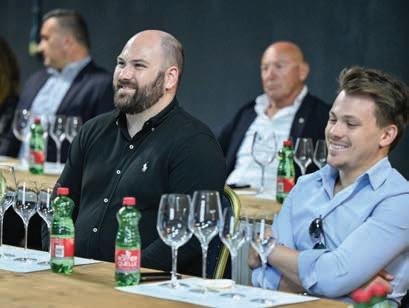
at the same time preserving tradition and indigenous flavours, has once again gathered top chefs, the most famous culinary talents, but also young hopefuls and representatives of the gastronomy and catering industry, who will highlight the importance of gastro and eno scene during two days through a comprehensive program scene through panel discussions, lectures, show cooking workshops and masterclasses. This year’s edition also brings novelties, such as the Weekend Food Market, which offers all visitors a diverse gastronomic offer ranging from local to international specialties.

hundreds of visitors and offered more than a hundred wine labels, about thirty premium olive oil labels and premium spirits brands. Numerous masterclasses and workshops were held during the festival, including “Rosés of the New World”, “Hungarian rosés”, “Rosés and desserts” and “All about one glass”. A special guest was wine journalist Katherine Cole, who presented her book “Rosé All Day”.
62 www.diplomacyandcommerce.hr PEOPLE & EVENTS

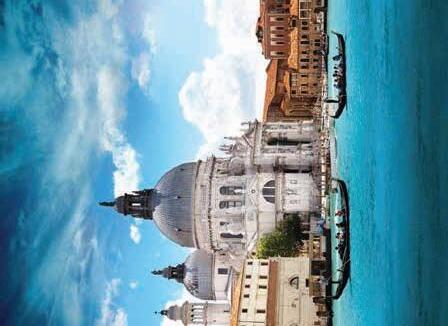



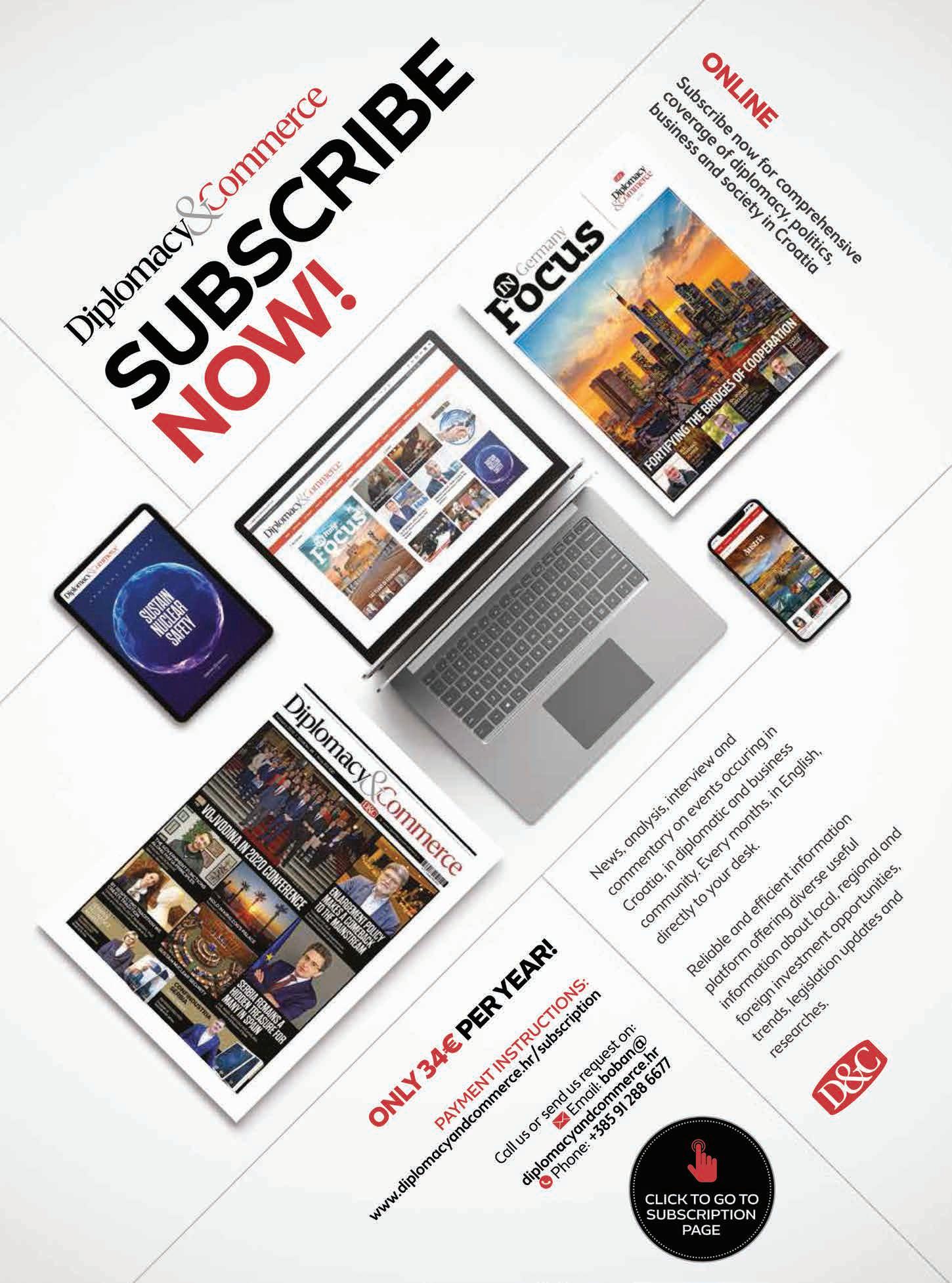



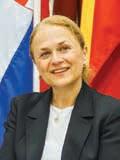













April/May2024 EUROPEANCROATIAISPARTOFTHEDEEPEST INTEGRATIONS ZRINKAUJEVIĆ CommissionHeadoftheRepresentationoftheEuropean toCroatia VIEWSWESHARESIMILAR ANDIDEAS H.E.PAWEŁ CZERWINSKIRepublicAmbassadoroftheofPolandtoCroatia FURTHEROURBILATERALTIESARE STRENGTHENEDBYOURDEEP PARTNERSHIP NOW,ASMEMBERSOFTHEEUAND ALSOASALLIESINNATOH.E.ANNABODA AmbassadoroftheKingdomofSwedentoCroatia TheKEEPINGOURPROMISETOEUROPE: storyofthevonderLeyenCommission ATOPPORTUNITIESINVESTMENTBUSINESSANDBUSINESSHELENASVETAZONE ITALYTOGETHERGROWING RepublicofPolandtoCroatia EUROPEAN ELECTIONS 2024 KeepingourpromisetoEurope:ThestoryofthevonderLeyen Commission ContentsManagingcriseshead-on 3 Defeatingthepandemic ............................................................................................... 3 PoweringEurope’srecovery ....................................................................................... 6 AfirmresponsetoRussia’sinvasionofUkraine ....................................... 9 StrengtheningEurope’sresilience,securityanddefence capabilities........................................................................................................................... 14 Commonsolutionstotheworstenergycrisisin decades.............. 16 Providingsupportwhendisasterhits .............................................................. 18 Keepingthecourseonour priorities 22 TheEuropeanGreenDeal:agrowthstrategythatprotects theclimate........................................................................................................................... 22 BuildingEurope’sdigitalleadership ................................................................. 26 Ahands-onapproachtofosterEurope’s industrialcompetitiveness ....................................................................................... 30 Oursocialmarketeconomy .................................................................................... 34 Tacklingirregularmigration ................................................................................... 41 Strengtheningdemocracyandtheruleoflaw ........................................ 45 AstrongerandbolderEuropeintheworld ................................................ 48 WorkingtogetherasaUnion ................................................................................. 52 24 www.diplomacyandcommerce.hr 25 ONLY80€PERYEAR! ITALYDIPLOMACY & COMMERCE PRESENTS FOCUSON ITALYANDCROTIA GROWINGTOGETHER H.E.PAOLOTRICHILOAmbassadorofthe RepublicofItaly toCroatia ANDREAPERKOVDirectorGeneral oftheItalian-CroatianChamber ofCommerce PETERFERLUGA CommercialManagerBalkansat De‘LonghiGroup
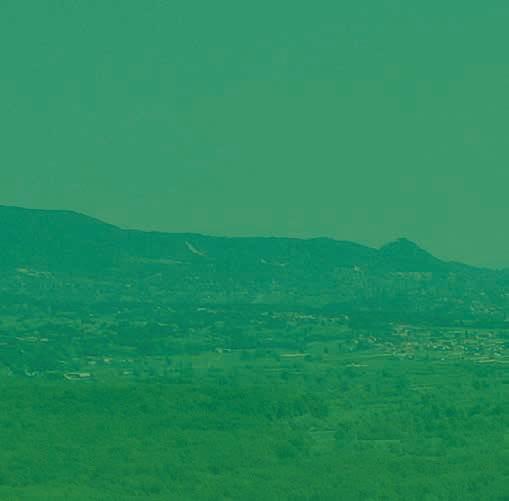
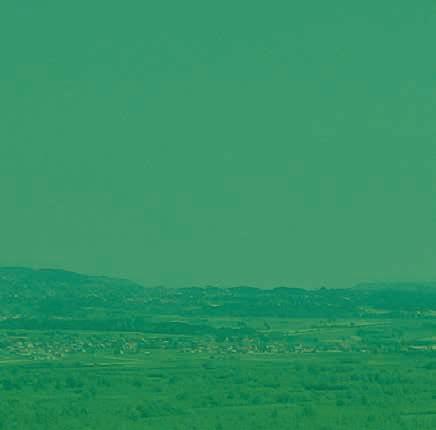
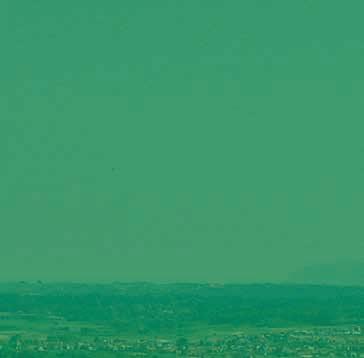

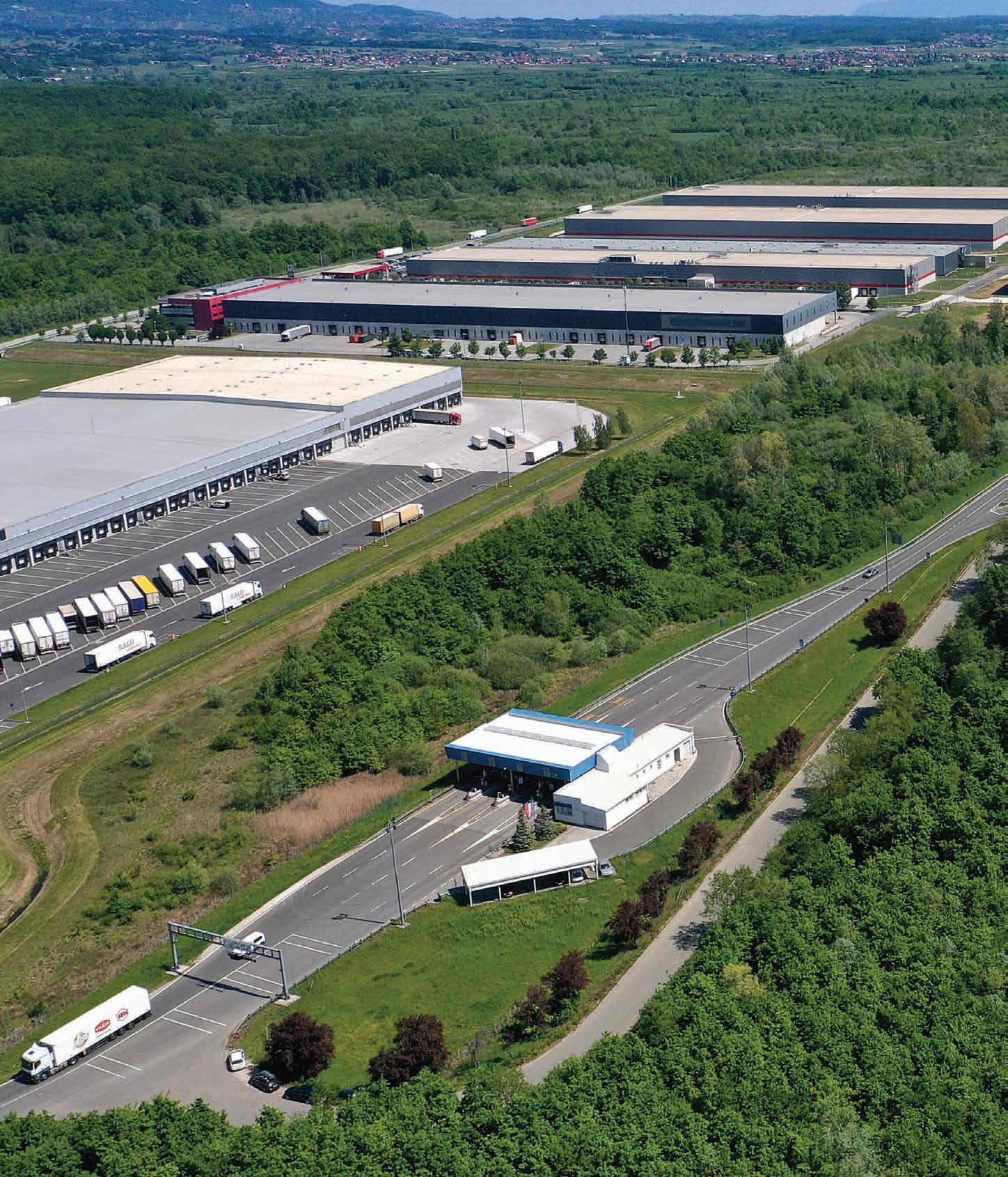

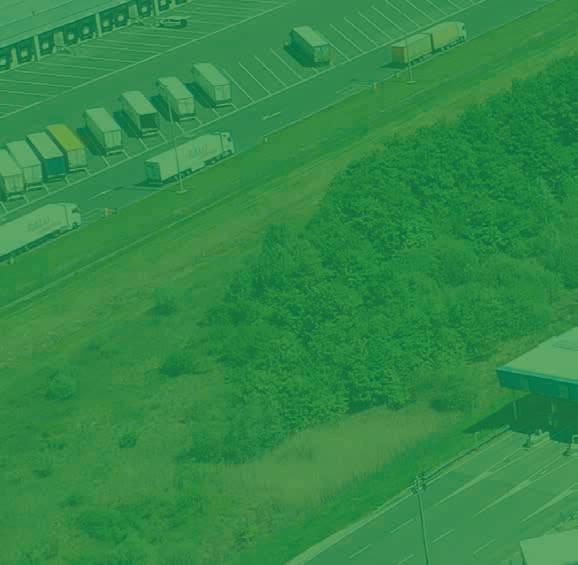


































































































 H.E. PAWEŁ CZERWINSKI
H.E. PAWEŁ CZERWINSKI


 H. E. ANNA BODA
H. E. ANNA BODA



















































































 ©LyondellBasell, 2024
©LyondellBasell, 2024



 © Adobe Stock
© Adobe Stock









































































































































